 Sign in
Sign in
Business
Andrew Stotz
Welcome to My Worst Investment Ever podcast hosted by Your Worst Podcast Host, Andrew Stotz, where you will hear stories of loss to keep you winning. In our community, we know that to win in investing you must take the risk, but to win big, you’ve got to reduce it.
Your Worst Podcast Host, Andrew Stotz, Ph.D., CFA, is also the CEO of A. Stotz Investment Research and A. Stotz Academy, which helps people create, grow, measure, and protect their wealth.
To find more stories like this, previous episodes, and resources to help you reduce your risk, visit https://myworstinvestmentever.com/
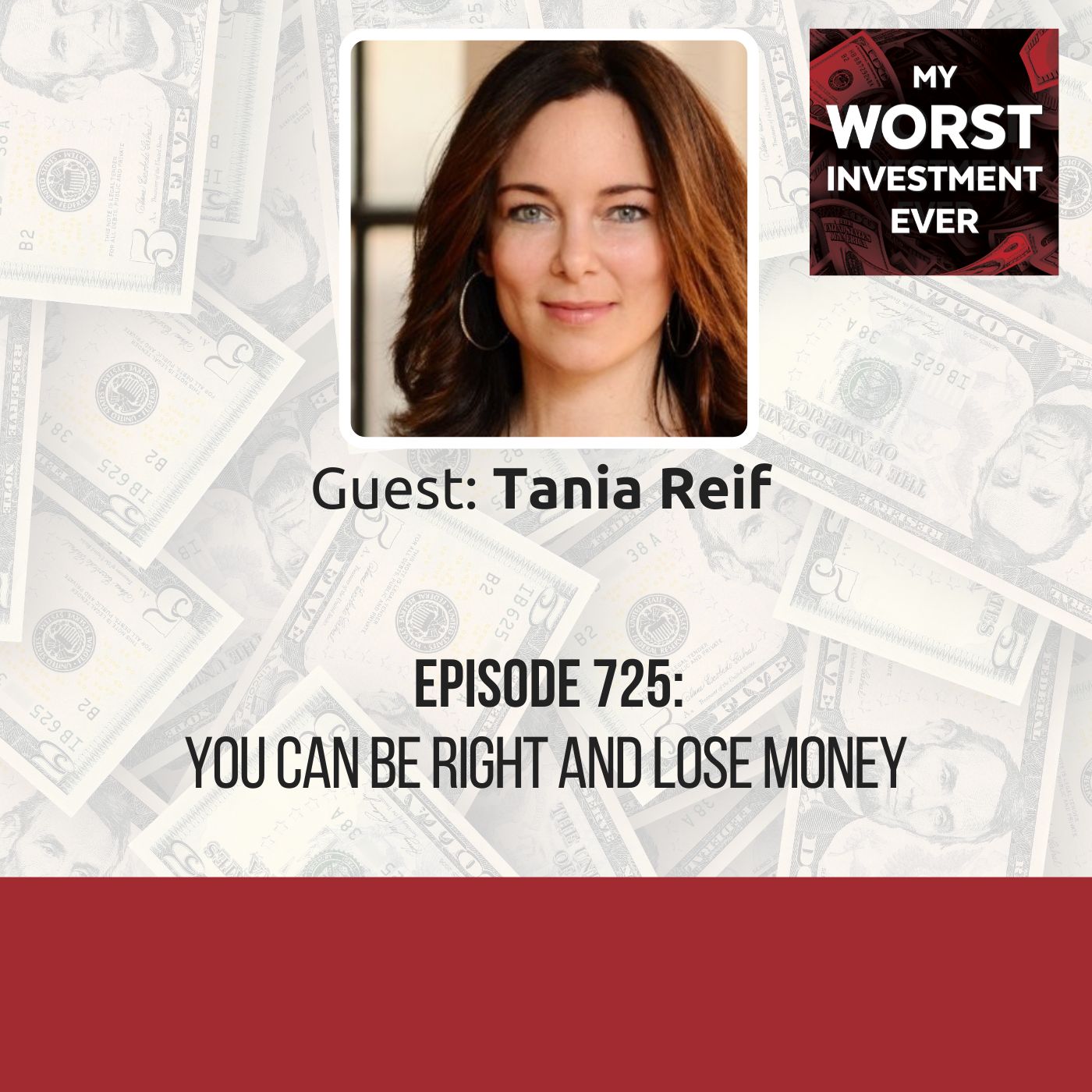
Tania Reif – You Can Be Right and Lose Money
BIO: Tania Reif is the Founder and CIO of Senda Digital Assets. Prior to her cryptocurrency focus, she built her investment pedigree at top macro hedge funds, including Soros Fund Management, Laurion Capital, Citadel, and Alphadyne Asset Management.STORY: Around the end of 2017, Talia believed the dollar would stay strong and rally. Unfortunately, it tanked in January 2018. It only started rallying three or four months later, but by that time, Talia had taken her chips off the table and didn’t profit from her view that played out a few months later.LEARNING: Reassess your investment model and make discretionary decisions to avoid getting into trouble. You can’t always be on top of everything in the financial world. Don’t fight the flow. “You actually can be right and lose money. This mostly happens when you’re, funnily enough, too early to a trade.”Tania Reif Guest profileTania Reif is the Founder and CIO of Senda Digital Assets. Prior to her cryptocurrency focus, she built her investment pedigree at top macro hedge funds, including Soros Fund Management, Laurion Capital, Citadel, and Alphadyne Asset Management.She was profiled in the 50 Leading Women in Hedge Funds 2017 survey by The Hedge Fund Journal. Her career spans public policy beginnings at the International Monetary Fund and experience in the banking industry at Citgroup’s Economic and Market Analysis team.She holds a Ph.D. in Economics with Distinction from Columbia University, where she earned the Jagdish Bhagwati International Economics Award for her work in currency dynamics.Worst investment everTania had a perfect model for trade currencies that had worked for many years. Then, in 2016, 17 and 18, it started to wobble. Around that time, she had a bunch of episodes where she’d put a trade on exchange rates, and it just wouldn’t go her way, or it would take longer.Around the end of 2017, Talia believed the dollar would stay strong and rally. Unfortunately, it tanked in January 2018. It only started rallying three or four months later. By then, Talia had taken her chips off the table and didn’t profit from her model that ended up playing out a few months later.Lessons learnedStay humble, and when things are not working, take a step back, reassess your investment model, and make discretionary decisions to avoid getting into trouble.Andrew’s takeawaysYou can’t always be on top of everything in the financial world.Don’t fight the flow.Actionable adviceHave a smaller size until you understand what’s happening. Be careful, and avoid the temptation to double down because you’re convinced you’re right.Tania’s recommendationsTania recommends following Michael Howell for fantastic research and data on liquidity. He also has a substack for young and non-institutional investors that you can subscribe to.No.1 goal for the next 12 monthsTania launched a crypto fund in 2022, and her number one goal for the next 12 months is to get this young fund up and running into a more mature and established institution.Parting words “Please reach out if you’re interested in learning more about...
33:5703/09/2023
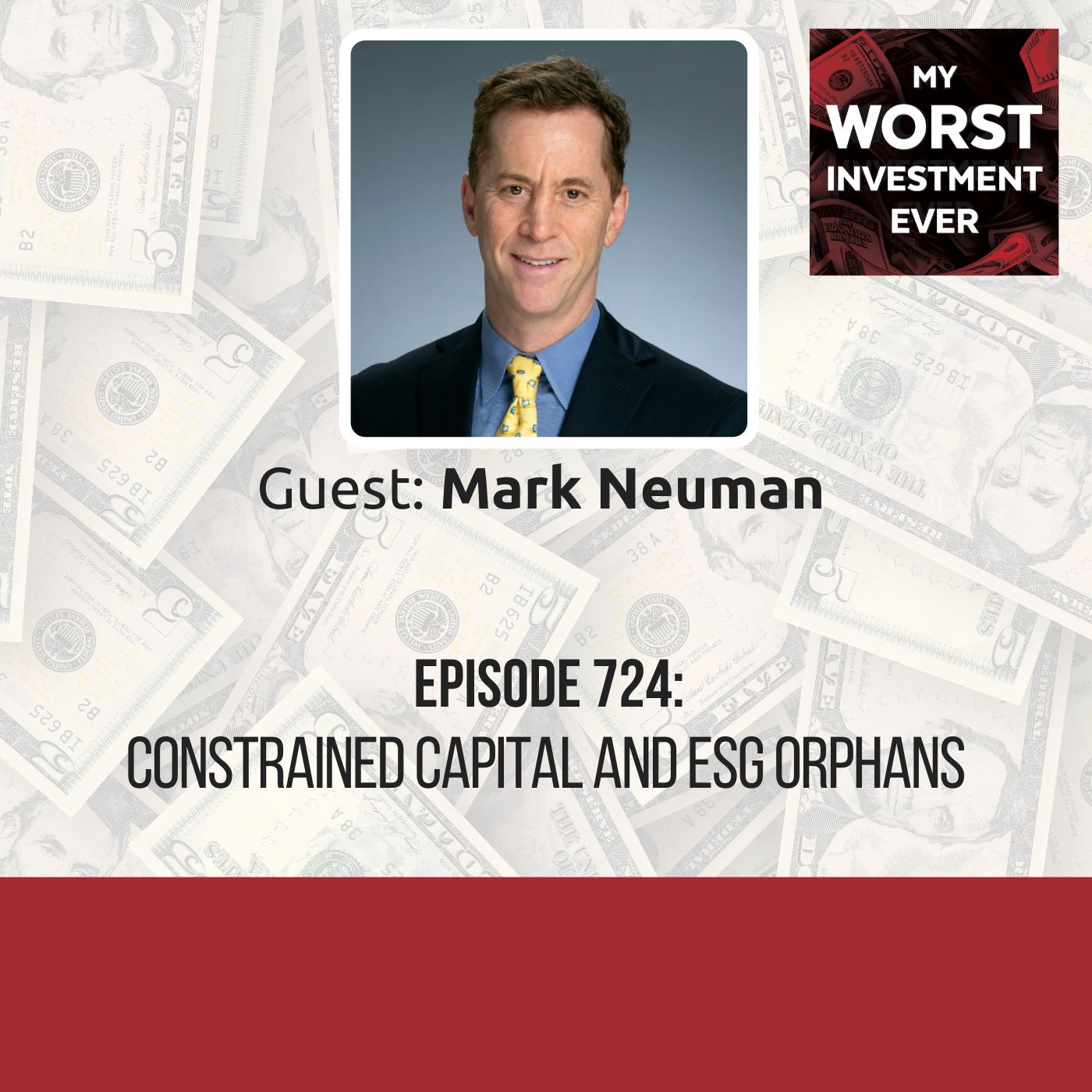
Mark Neuman – Constrained Capital and ESG Orphans
BIO: Mark Neuman is the CIO and founder of Constraint Capital. He is a CFA charterholder and creator of the ESG orphans index.STORY: Mark talks about constrained capital, ESG orphans, and his work around it.LEARNING: We can’t get to the future of energy without present energy. To win the renewable energy fight, we must put facts above feelings. “We can’t get to the future of energy without present energy.”Mark Neuman Guest profileMark Neuman is the CIO and founder of Constraint Capital. He is a CFA charter holder and creator of the ESG orphans index. He’s a 30-year Wall Street veteran and former global equity derivatives trader with Merrill Lynch, Susquehanna, Jones Trading, and Bay Crest partners. He’s a former event-driven hedge fund partner. In his recent investment project, he spent 1,000 hours of deep dive into all things ESG over the past six years. His goal is to deliver truth in ESG to protect and help investors make informed decisions with measurable results when understanding risk and reward.In today’s episode, Mark talks about constrained capital, ESG orphans, and the work he is doing around it.Constraints on capitalAccording to Mark, constraints on capital is a pattern that exists in the market based on policy, investment themes, and philosophies. Most recently, ESG (Environmental, Social, Governance) has been the most prominent example of constraints on capital. Constraints on capital cause misallocation and malinvestment. In general, they are starving specific industries and flooding others.For example, in ESG, constraints were heavily implemented on fossil fuels, nuclear energy, weapons, alcohol, tobacco, and gambling. Basically, ESG said those were bad. On the other side, they chose certain winners that were apparently good in ESG, leading to the misallocation of capital because, though these winners are considered great, they still have a considerable carbon footprint.Ultimately, the constraints push capital to one place and starve capital to another. The ESG orphans are the six sectors, fossil fuel, nuclear energy, weapons, alcohol, tobacco, and gambling, that were routinely excluded. As they’re being cut off from capital, the value of their stocks falls.Looming reversal flows for ESG orphansIn the last decade up through 2021, the Info-Tech space in the S&P 500 grew from 18% weighting to 36%. On the other hand, the energy sector shrunk from about 10% to 2.5% and became so cheap within the same decade. Mark indicates that we’ll see a reversion over a more extended period. As ESG gets called out, we’ll see reversal flows that will return to those excluded names.Put facts above feelingsMark insists he’s not anti-ESG; he’s simply anti the ESG bubble as an investor and a CFA charterholder. He says there’s significant value in many of these companies that have been discarded. We simply need a different energy plan. While Mark agrees we need to find a replacement for fossil energy, he believes that we can’t get to the future of energy without present energy.Therefore, it makes no sense to starve Exxon Mobil, for example, instead of leaning on it to lead the renewable energy change. Mark thinks people putting feelings above facts on some level is a troubling aspect of ESG.Mark has been doing a lot of ESG consulting, working with companies to help them understand the risks. If certain companies have been classified by ESG as medium risk or low risk, Mark wants to kick the tires and turn it over. He’s helping companies do their own due diligence and dig into what their ESG analysis...
34:5530/08/2023
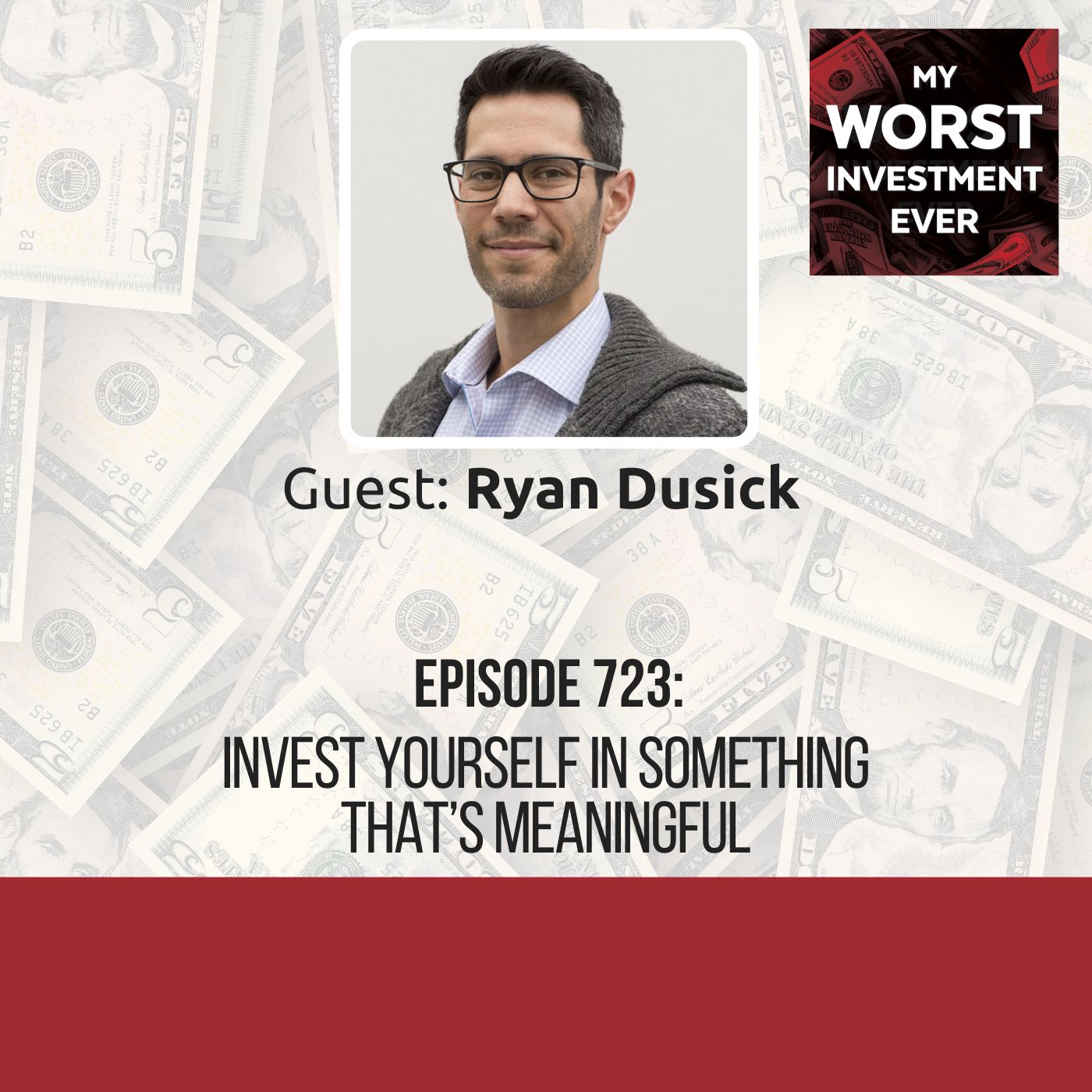
Ryan Dusick – Invest Yourself in Something That’s Meaningful
BIO: Ryan Dusick is an associate marriage and family therapist, life coach, mental health advocate, and the founding drummer of the world’s most popular band, Maroon 5.STORY: Ryan’s worst investment ever was spending a decade of his time, energy, and focus believing that he had control over his life. Simply playing God with the reality of his existence.LEARNING: Happiness comes from connection and purpose. Investing yourself in something meaningful to you establishes purpose. “If you want to achieve certain things in your life, you must put yourself out there and be prepared for setbacks, disappointments, and failures.”Ryan Dusick Guest profileRyan Dusick is an associate marriage and family therapist, life coach, mental health advocate, and the founding drummer of the world’s most popular band, Maroon 5.He is also a columnist for Variety Magazine and the author of the new book “Harder to Breathe: A Memoir of Making Maroon 5, Losing It All, and Finding Recovery.”His life has been a long and winding road from an aspiring pop star with anxiety to a heartbroken alcoholic to a thriving mental health survivor and messenger of hope in recovery.Worst investment everThe worst investment Ryan ever made was investing a decade of his time, energy, and focus into an illusion. The illusion was that he had control over his life, simply playing God with the reality of his existence. There were moments in that decade that were pleasant, enjoyable, and fun for Ryan.Maintaining the lie that Ryan had control of his life and that he could escape the feelings that were so painful was an exercise in futility. Life just got worse over time. His coping skills deteriorated. Ryan had invested in a way of life that was harming him and not benefiting him in any way other than maybe a moment of pleasure from time to time.Lessons learnedHappiness comes from feeling connection and purpose.Meaning and purpose are not necessarily handed to you by God or the universe. You can create them for yourself.Use your mindset to find ways to grow and find new connections and a new purpose.Investing yourself in something meaningful to you establishes purpose.Actionable adviceIf you want to achieve certain things in your life, to a certain extent, you have to put yourself out there and be prepared that there may be setbacks, disappointments, and failures. That’s part of the process, ultimately, of getting to where you want to be. Those setbacks, disappointments, and failures don’t make you a failure or mean it’s the end of the road. It’s part of the process of pursuing something valuable to you.No.1 goal for the next 12 monthsRyan’s number one goal for the next 12 months is to be more of a professional speaker, step it up to the next level, and share some of the things he’s learned on a bigger scale. He also wants to continue to write more.Parting words “Good luck to you on your journey. If it’s been a while for you, it’s still coming. Just be open to it.”Ryan Dusick [spp-transcript] Connect with Ryan DusickLinkedIn<a href="https://twitter.com/DusickRyan" rel="noopener noreferrer"...
36:2629/08/2023
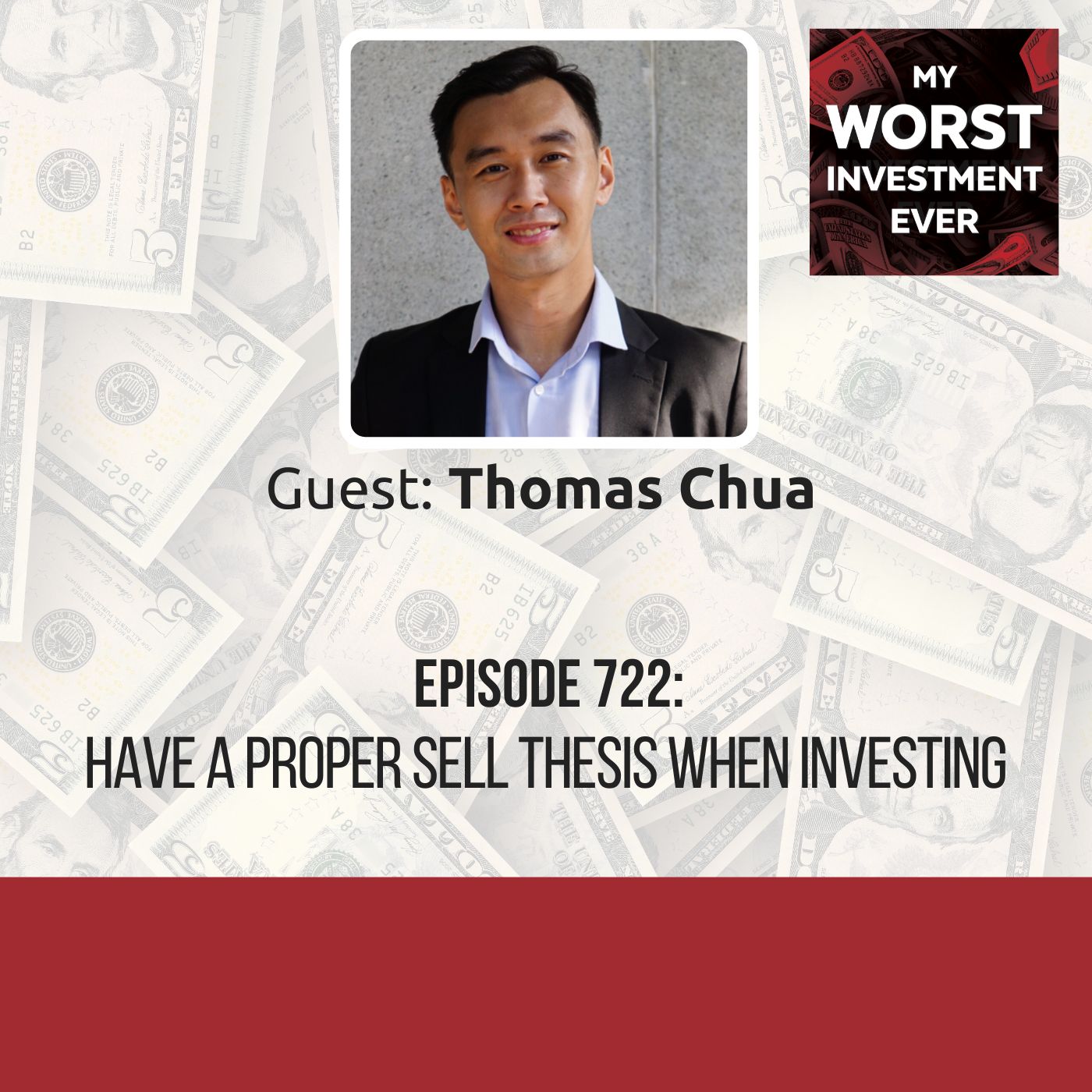
Thomas Chua – Have a Proper Sell Thesis When Investing
BIO: Thomas Chua is the founder of SteadyCompounding.com, where he writes about business breakdowns, investment concepts, and timeless lessons from super investors.STORY: Thomas invested in a company that had a gaming and e-commerce business. The gaming business was his main attraction, but over time, it started faltering. Unfortunately, Thomas held on until the stock went too low.LEARNING: Have a proper sell thesis when it comes to investing, especially for smaller companies. Always write down why you should buy certain companies and what will cause you to sell them. When investing in small to mid-companies, ensure you’re adequately diversified. “Start writing down what would cause you to sell the company to assess the risks and also to prepare yourself for the future.”Thomas Chua Guest profileThomas Chua is the founder of SteadyCompounding.com, where he writes about business breakdowns, investment concepts, and timeless lessons from super investors.Steady Compounding provides investing insights and business breakdowns every week to thousands of readers. You can sign up here for free.Worst investment everThomas started initiating a position in a company back in 2019. The company, Sea Limited, had two business arms, gaming and E-commerce. When Thomas first bought a position in this company, its market cap was about $14 billion. The gaming business, Garena, had a revenue figure of about 1.1 billion, and its operating income was 530 million, so the operating margins were high at about 50%. The company was growing at a 100% rate. The E-commerce business, Shopee, was also growing quickly but was unprofitable.Thomas was attracted to the company’s stock due to Garena’s success. It had a decent valuation compared with what other gaming companies were trading at.When COVID-19 hit, the stock took off. Everybody on Twitter was crazy about this company. Thomas got absorbed into the whole narrative that Sea Limited had become invincible. Like anything they touched, they turned into pure gold.The thesis behind Sea Limited was that Garena would finance Shopee until it became the most dominant player in whichever market it entered. Shopee’s management got a bit hot-headed back then. They started to go everywhere, and it was doing well in revenue.The problem with this thesis was that Garena started to falter. Much of its growth came from developing countries like Indonesia and India. At some point, India banned Garena’s Free Fire game. Also, as COVID-19 started to ease, the number of users on Garena began to reduce. The stock took a tumble. When Thomas first bought the company, the stock was over $30. Then it went all the way up to over $300. Now it went down to below $30.Lessons learnedHave a proper sell thesis when it comes to investing, especially for smaller companies.Before investing, always write down why you should buy certain companies and what will cause you to sell them.When investing in small to mid-companies, ensure you’re adequately diversified.Andrew’s takeawaysBe careful about just trying to build up a portfolio of small or medium-sized companies that you believe will be the next big thing because outcomes can be highly variable.When you feel that you need to sell, sell 10% first.Actionable adviceStart writing down why you buy and conduct a premortem to help you decide...
24:3827/08/2023
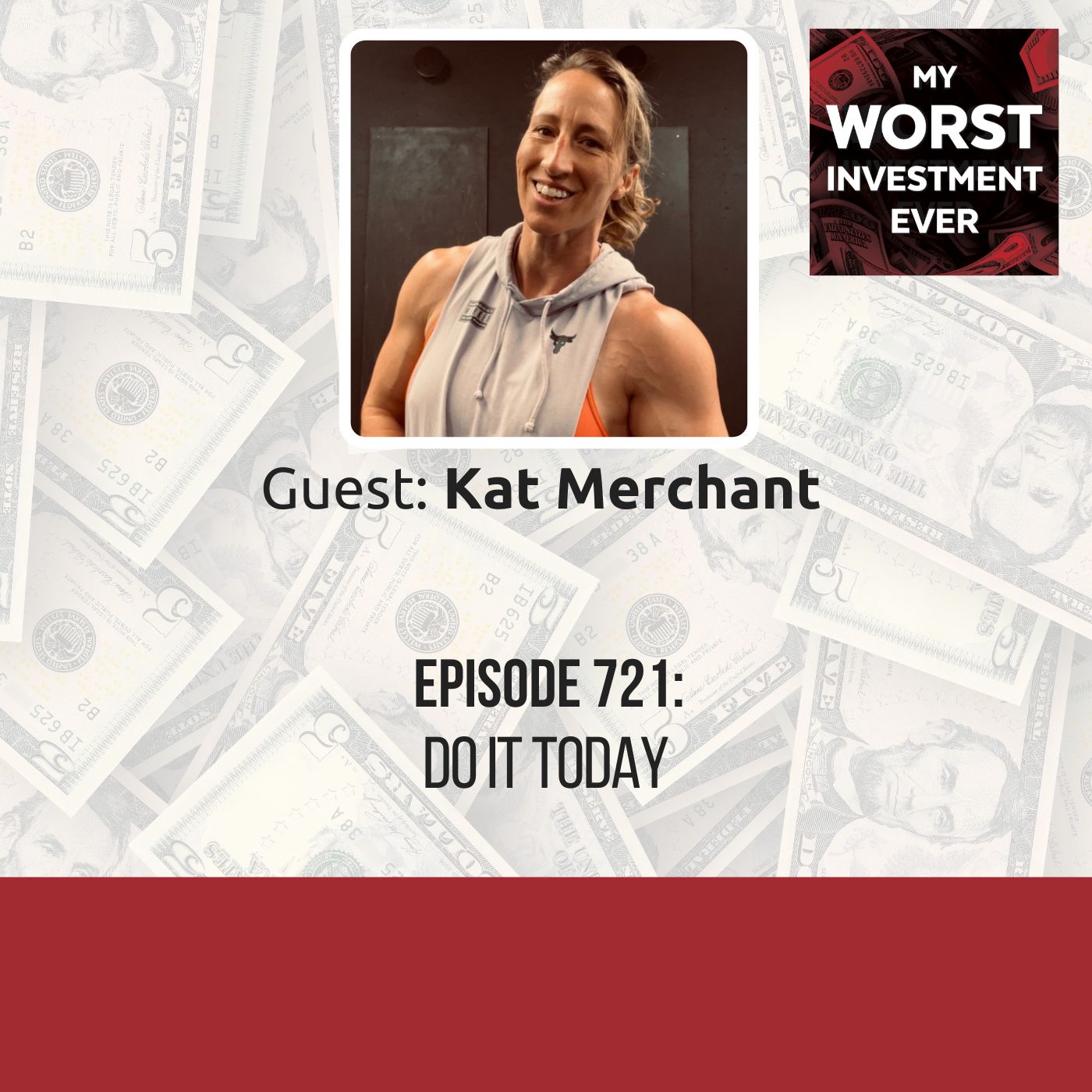
Kat Merchant – Do It Today
BIO: Kat Merchant is a Rugby World Cup Champion turned Lifestyle, Nutrition & Fitness Coach. Her mission is to show you how your weight-loss journey and making positive lifestyle and nutrition changes can catalyze improvement in EVERY aspect of your life.STORY: Kat had to retire early from her successful rugby career. A few years after that, she went through an awful breakup. At the same time, the world went into a lockdown because of COVID-19. She decided to spend all her energy trying to get back control of her life. So, she overtrained. The more she worked out, the more she felt empty inside, even though her outside was transforming.LEARNING: You can’t help people if you’re not in a good place. Be careful and choose how you spend your energy. People don’t care about you nearly as much as you think they do. “You cannot help people if you’re not in a good place yourself.”Kat Merchant Guest profileKat Merchant is a Rugby World Cup Champion turned Lifestyle, Nutrition & Fitness Coach. Her mission is to show you how your weight-loss journey and making positive lifestyle and nutrition lifestyle changes can be the catalyst for improvement in EVERY aspect of your life.From boosting your career performance to enhancing your personal relationships and mental well-being, turning sweat into success is what she lives for.Through her bespoke coaching program, Elite-14, she provides tailored strategies, support, and accountability to help you achieve your health and wellness goals and, ultimately, lead a happier and more balanced life.Worst investment everKat had her very successful rugby career cut short due to too many concussions. She was just 28 years old at the time. A few years after that, she went through an awful breakup. At the same time, the world went into a lockdown because of COVID-19.Kat didn’t know who she was anymore because she didn’t have rugby. She’d completely lost her confidence. Kat spent all her energy trying to regain control of her life. She wanted to look feminine and feel confident. So Kat overtrained and did exercises she didn’t like. For instance, Kat loved lifting, but because she was trying to get rid of her muscles, she did loads and loads of cardio. Kat got obsessed and weighed herself every day. The more she worked out, the more she felt empty inside, even though her outside was transforming.Lessons learnedYou can’t help people if you’re not in a good place.Be careful and choose how you spend your energy.Do things that are right for you.You don’t have to change yourself for anyone else. Change yourself for you if you want to.Andrew’s takeawaysYour whole life’s mission should be to become more you.People don’t care about you nearly as much as you think they do.Actionable adviceIf something’s an issue and you can change it, do it now before it becomes too late or before you go through rock bottom pain. Just change it.Kat’s recommendationsCheck Kat out on social media, where she shares valuable tips on how to lose fat, build muscle, stay motivated, and set yourself up for success. If you want to make that change and need support and accountability, drop Kat a message, and she’ll talk to you about her one-on-one program,No.1 goal for the next 12 monthsKat’s number one goal for the next 12 months is to keep getting fitter, stronger, and confident. Business-wise, Kat wants to keep...
34:3123/08/2023
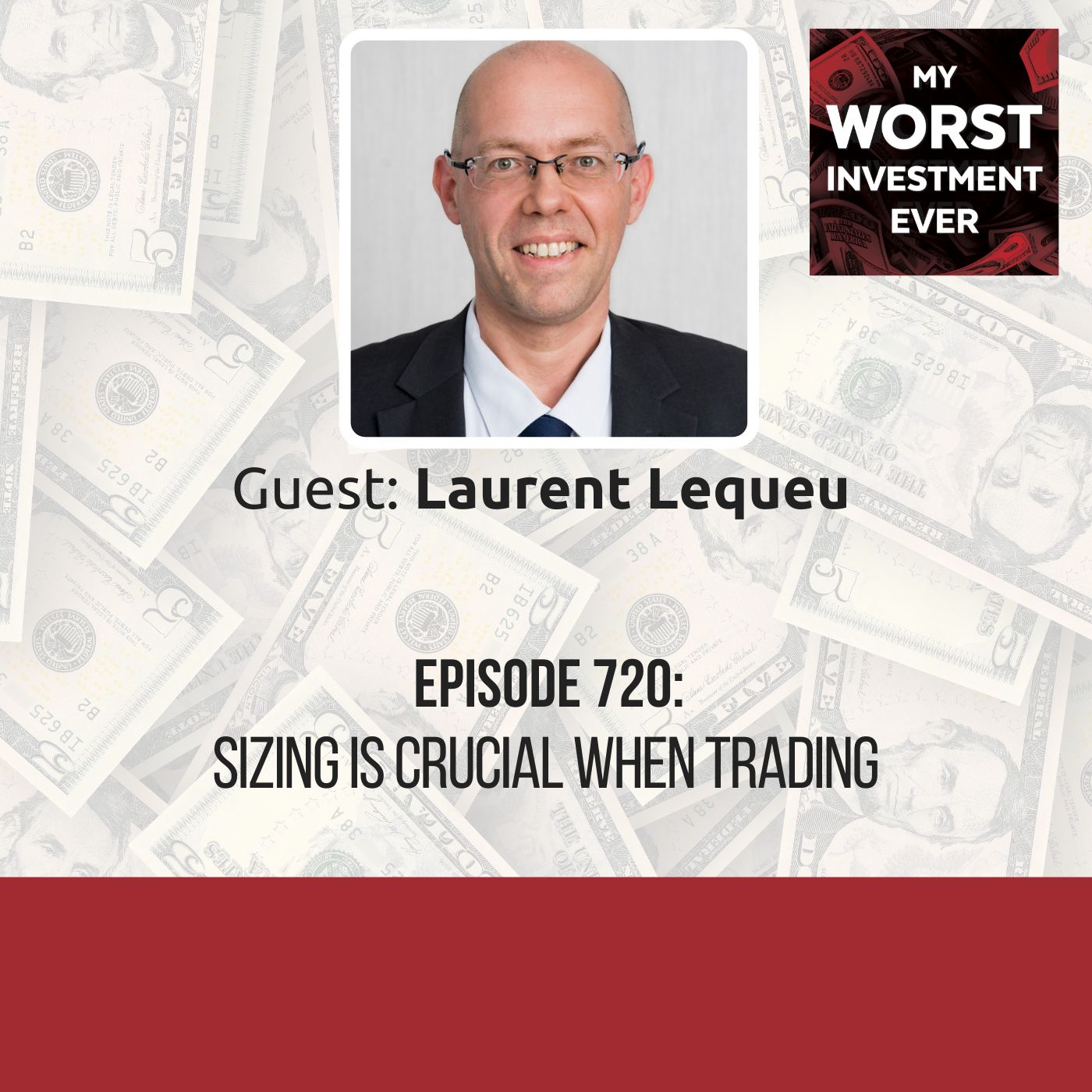
Laurent Lequeu – Sizing Is Crucial When Trading
BIO: Laurent Lequeu is a multi-asset investor dedicated to assisting High Net Worth Individuals and Retail Investors in achieving financial success through actionable investment insights derived from comprehensive global macro trends and meticulous bottom-up analysis.STORY: Laurent thought he could outsmart all the hedge funds and the most brilliant investors by shorting NVIDIA before the first quarter results. His thesis was that the stock was an extended and overcrowded trade. However, people were still interested in the stock, so the price didn’t fall as Laurent expected. Consequently, he made a loss.LEARNING: Sizing is crucial, especially in a short position. Apply risk management when investing. Accept that you’re going to be wrong. “You have to admit that you’re wrong and that the market is always right.”Laurent Lequeu Guest profileLaurent Lequeu is a multi-asset investor dedicated to assisting High Net Worth Individuals and Retail Investors in achieving financial success through actionable investment insights derived from comprehensive global macro trends and meticulous bottom-up analysis.Laurent is a global citizen with a mission to enhance financial literacy and empower individuals worldwide through education.Worst investment everNot too long ago, Laurent thought he could outsmart all the hedge funds and the most brilliant investors by shorting NVIDIA before the first quarter results. His thesis was that the stock was an extended and overcrowded trade. However, people were still interested in the stock, so the price didn’t fall as Laurent expected. Consequently, he made a loss.Lessons learnedSizing is crucial, especially in a short position.Apply risk management when investing.Andrew’s takeawaysYou have to accept that you will be wrong, and when you get it wrong, be willing to exit, particularly in a short position.If you don’t admit you’re wrong, the market will admit it for you.Actionable adviceBefore you enter the trades, know how much you can lose. Knowing what you can lose is more important than knowing what you can win. Also, admit that you’re wrong because there’s nothing wrong with being wrong. This is an industry where you must be right more often than wrong, but you will be wrong eventually.Laurent’s recommendationsLaurent recommends focusing on personal learning and personal development regarding financial literacy.No.1 goal for the next 12 monthsLaurent’s number one goal for the next 12 months is to be fully dedicated to his new company, which is focusing on improving financial literacy for everyone. He also wants to democratize and demystify macro investing.Parting words “Unlock your individual financial success and learn to be financially independent.”Laurent Lequeu [spp-transcript] Connect with Laurent LequeuLinkedInFacebookTwitterYouTube <a...
25:4820/08/2023
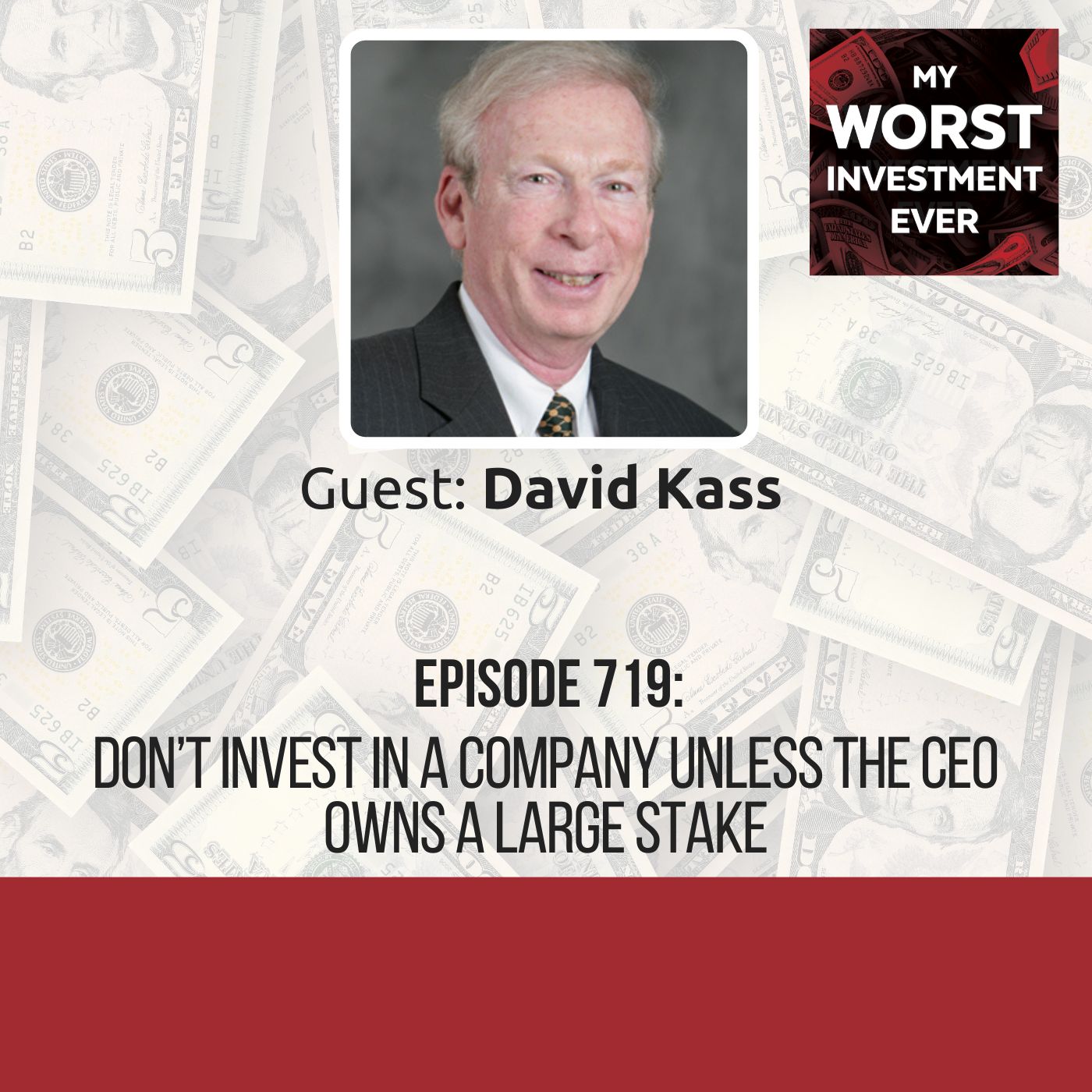
David Kass – Don’t Invest in a Company Unless the CEO Owns a Large Stake
BIO: Dr. David Kass received his Ph.D. in Business Economics from Harvard University and has published articles in corporate finance, industrial organization, and health economics. He currently teaches Advanced Financial Management.STORY: In his early 20s, David invested $2,000 in a company giving out high dividends. Only after he invested did he realize that none of the senior executives in the company owned its shares. Soon enough, the stock went down to zero due to accounting fraud.LEARNING: Only invest in a company if senior executives, especially the CEO, own a significant stake. The value of the CEO’s stock in his own company to his annual salary should be at least 3:1. “Look carefully at proxy statements and make sure the CEO and other senior managers have skin in the game, that their interests are likely aligned with yours and have a large stake through their stock holdings.”Dr. David Kass Guest profileDr. David Kass received his Ph.D. in Business Economics from Harvard University and has published articles in corporate finance, industrial organization, and health economics. He currently teaches Advanced Financial Management.Before joining the Smith School faculty in 2004, he held senior positions with the Federal Government (Federal Trade Commission, General Accounting Office, Department of Defense, and the Bureau of Economic Analysis).Dr. Kass has recently appeared on Bloomberg TV, CNBC, PBS Nightly Business Report, Maryland Public Television, Business News Network TV (Canada), FOX TV, Bloomberg Radio, Wharton Business Radio, KCBS Radio, American Public Media’s Marketplace Radio, and WYPR Radio (Baltimore), and has been quoted on numerous occasions by The Wall Street Journal, Bloomberg News, The New York Times and The Washington Post, where he has primarily discussed Warren Buffett, Berkshire Hathaway, the economy, and the stock market.He has also launched a Smith School “Warren Buffett” blog. Dr. Kass has accompanied MBA students on trips to Omaha for private meetings with Warren Buffett and Finance Fellows to Berkshire Hathaway’s annual meetings.Dr. Kass received a Smith School “Top 15% Teaching Award”, a “Distinguished Teaching Award (Top 10%),” and the prestigious “Krowe Teaching Award” on two occasions.Worst investment everDavid was fortunate to start as an investor in the stock market at age 12, courtesy of his grandfather, who gave him a gift of five shares of a $20 stock. Since then, David started following the market.Fast forward ten years or so, in his early 20s, when David was working and earning some money investing in the stock market. In 1969 the stock market was doing reasonably well, and a stock caught David’s attention. Back then, every day, the Wall Street Journal, New York Times, or Financial News would list the ten most active stocks by number of shares traded. Near the top of the list was this computer software company called Scientific Resources. It had a common and preferred stock. David noticed that the preferred stock was paying a 9% dividend yield.David didn’t understand the relationship between risk and return then. The average stock in the stock market then had an average dividend yield of 3%. Cash dividends were higher because more companies back then did not buy back their shares. They’d return capital to shareholders through a cash dividend. So a stock paying 9% was a huge deal. David bought 100 shares at $20 per share. The $2,000 was all the money he had to invest at the time. Then the share price started going down daily.Once a year, shareholders would be asked to vote under SEC...
53:3617/08/2023
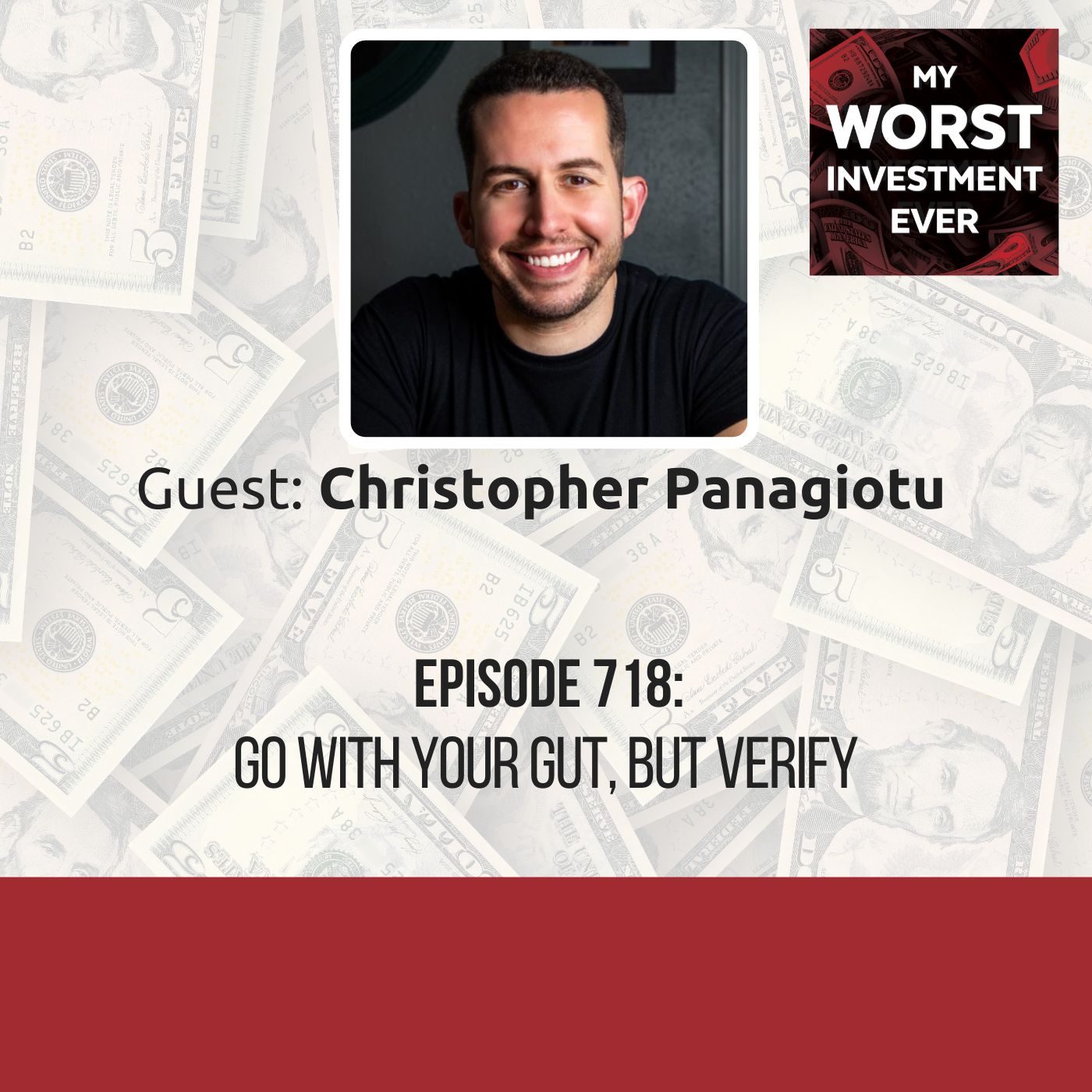
Christopher Panagiotu – Go With Your Gut, but Verify
BIO: Christopher Panagiotu hosts the “CAPitalize Your Finances” podcast and is the original CAPitalizer: one who is obsessed with understanding what there is to know about their passion.STORY: Chris was suckered into buying Ford and GameStop shares by the high dividends the companies were offering. However, both companies couldn’t afford to pay those dividends. Chris also started a business to steal customers from his father, whom he despised. The business lasted only seven months, and it was a complete failure.LEARNING: When in doubt, read more. Acknowledge that you made a mistake, and move on. Never invest in a company because of a celebrity CEO, founder, or CFO. “Always keep capitalizing.”Christopher Panagiotu Guest profileChristopher Panagiotu hosts the “CAPitalize Your Finances” podcast and is the original CAPitalizer: one who is absolutely obsessed with profoundly understanding what there is to know about their passion.Worst investment everChris bought the Ford stock, which he admits was a lackluster stock. Alan Mulally had saved Boeing and left the company for Ford. Mulally was the reason Chris invested in Ford. The celebrity CEO turned it around, so Chris hung on to the stock, but for too long. Chris was suckered into Ford’s high dividend, but he soon realized that the company couldn’t afford to pay that dividend.Another poor investment that Chris made was investing in GameStop. He was a gamer growing up, and in the 2000s, Gamestop was it. GameStop hooked Chris with the same thing that Ford did. Their dividend was huge, but they couldn’t afford it.Aside from stocks, Chris’s worst investment ever includes a business that he started to steal customers from his father, whom he despised. The company lasted only seven months, and it was a complete failure.Lessons learnedWhen in doubt, read more.Go with your gut, but verify.Humble yourself, acknowledge that you made a mistake, and move on.Never invest in a company because of a celebrity CEO, founder, or CFO.Don’t try to steal business out of spite.Andrew’s takeawaysTrees don’t grow to the sky, so there are very few stocks that you can hold forever.If you’re not getting trust from your business or personal relationships, walk away and get it elsewhere.Actionable adviceSurround yourself with amazing people and level up with the people in your life.Christopher’s recommendationsIf you want free content, head to Spotify and subscribe to CAPitalize Your Finances. Chris publishes new interviews with celebrities from all walks of life every Monday. They talk about capitalizing on your finances if you pursue that career. He also gives up-to-date, top-of-the-line research.You can also buy Chris’s book on Amazon to learn more from him. If you want to follow Chris on social media, head to Instagram, LinkedIn, or <a href="https://twitter.com/CAPinCAPitalize"
32:1010/08/2023
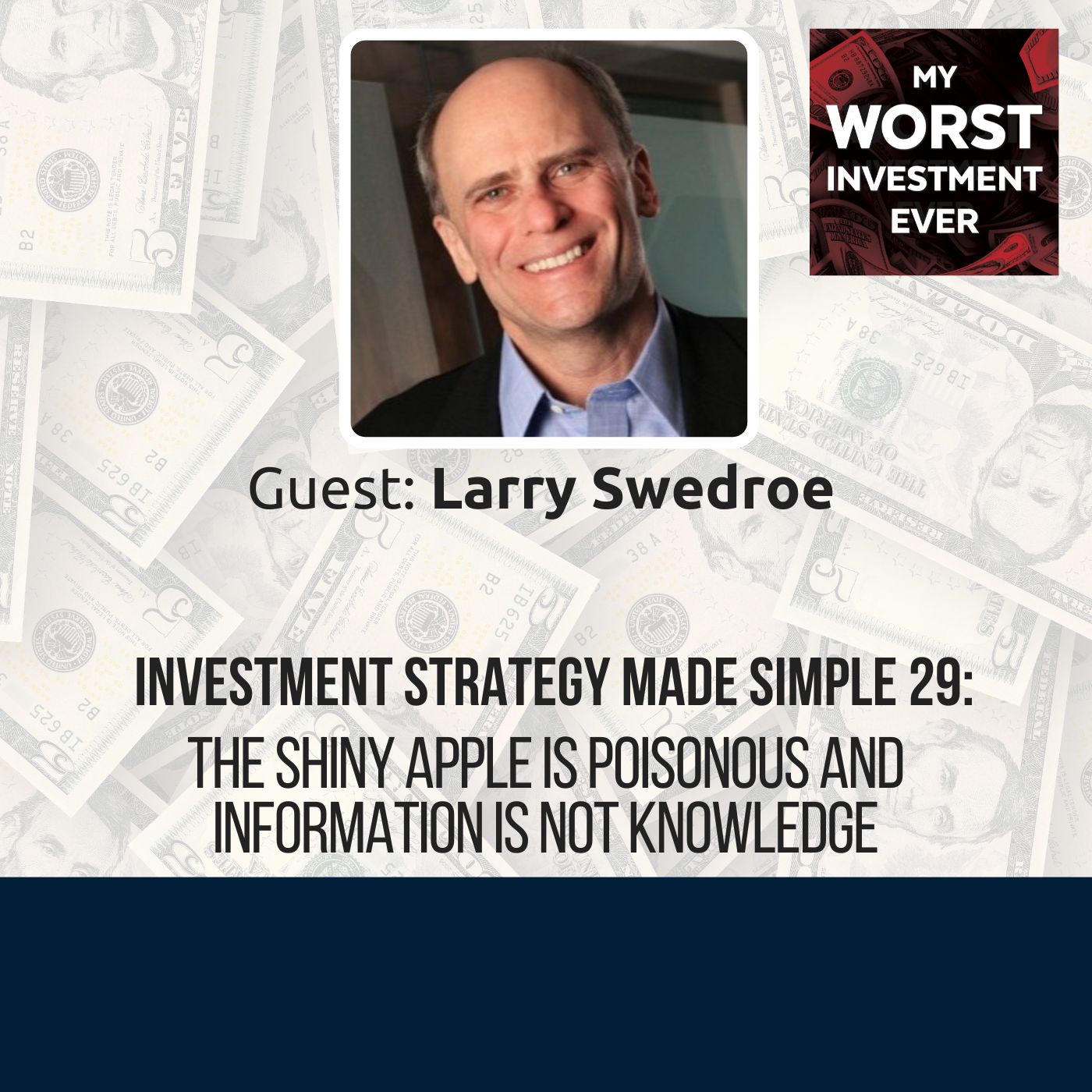
ISMS 29: Larry Swedroe – The Shiny Apple is Poisonous and Information is Not Knowledge
In this episode of Investment Strategy Made Simple (ISMS), Andrew gets into part two of his discussion with Larry Swedroe; Ignorance is Bliss. Today they discuss two chapters of Larry’s book Investment Mistakes Even Smart Investors Make and How to Avoid Them. In this ninth series, they discuss mistake number 16: Do You Fail To See The Poison Inside the Shiny Apple? And mistake number 17: Do You Confuse Information With Knowledge?LEARNING: Trust, but verify even when working with a financial advisor. Don’t confuse information with knowledge when buying individual stocks. “One of the rules of investing is you should always ask an advisor if they put their money where their mouth is.”Larry Swedroe In today’s episode, Andrew continues his discussion with Larry Swedroe, head of financial and economic research at Buckingham Wealth Partners. You can learn more about Larry’s Worst Investment Ever story on Ep645: Beware of Idiosyncratic Risks.Larry deeply understands the world of academic research and investing, especially risk. Today Andrew and Larry discuss a chapter of Larry’s book Investment Mistakes Even Smart Investors Make and How to Avoid Them. In this ninth series, they discuss mistake number 16: Do You Fail To See The Poison Inside the Shiny Apple? And mistake number 17: Do You Confuse Information With Knowledge?Missed out on previous mistakes? Check them out:ISMS 8: Larry Swedroe – Are You Overconfident in Your Skills?ISMS 17: Larry Swedroe – Do You Project Recent Trends Indefinitely Into the Future?ISMS 20: Larry Swedroe – Do You Extrapolate From Small Samples and Trust Your Intuition?ISMS 23: Larry Swedroe – Do You Allow Yourself to Be Influenced by Your Ego and Herd Mentality?ISMS 24: Larry Swedroe – Confusing Skill and Luck Can Stop You From Investing WiselyISMS 25: Larry Swedroe – Admit Your Mistakes and Don’t Listen to Fake ExpertsISMS 26: Larry Swedroe – Are You Subject to the Endowment Effect or the Hot Streak Fallacy?ISMS 27: Larry Swedroe – Familiar Doesn’t Make It Safe and...
55:4706/08/2023
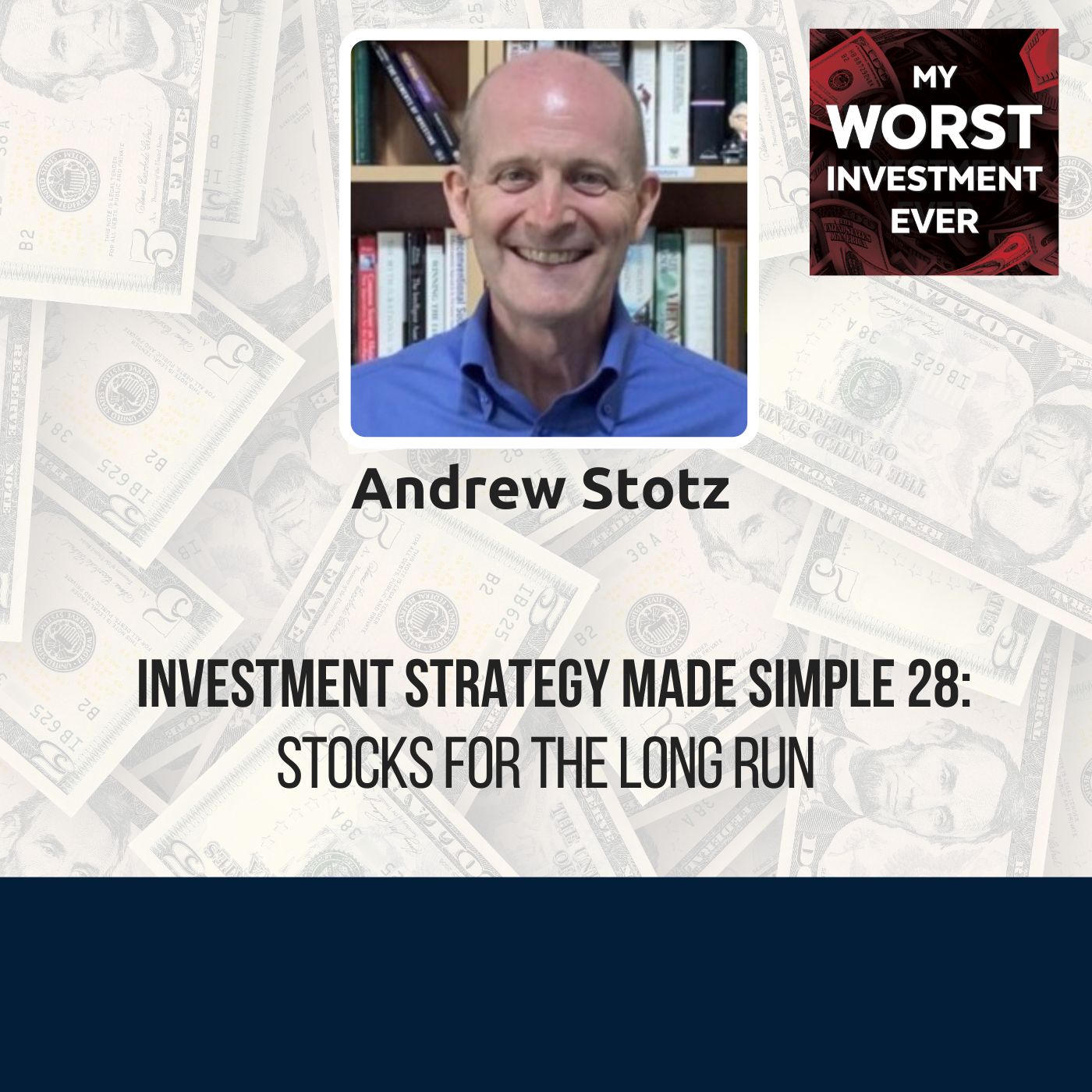
ISMS 28: Stocks for the Long Run
Stocks for the Long RunClick here to get the PDF with all charts and graphsWhat long-term return do you expect for US stocks? In Siegel’s “Stocks for the Long Run,” he tells us to expect a 5% LT real US stock market return I became a finance teacher in Thailand in 1992Then started as a financial analyst in 1993Siegel’s book came out in 1994 and was one of the best references available at the timeUS nominal returnsUS real returnsMore than 200 years of returns95 years of returnsHigher inflation and higher nominal stock market returns, but only slightly higher real returnsSlightly lower real LT bond return, near zero ST bond returnPost WWII/Bretton Woods 75 years of high inflationReal stock returns up slightlyReal LT bond returns downReal ST bond returns down to zeroGold outperformed ST bondsThe 21 years after the Dot Com bubble saw an unprecedented level of globalizationInflation was down, and real US stock returns also downReal US LT bond returns upNominal ST bond collapse, and real returns turn neg.Gold beats allSiegel’s adviceOver the long-term, an investor has paid about 15x PE for about 6-7% after inflation US stock market returnIn the future, expect to pay about 20x PE for about 5% after inflation returnClick here to get the PDF with all charts and graphsAndrew’s booksHow to Start Building Your Wealth Investing in the Stock MarketMy Worst Investment Ever9 Valuation Mistakes and How to Avoid ThemTransform Your Business with Dr.Deming’s 14 PointsAndrew’s online programsValuation Master ClassThe Become a Better Investor CommunityHow to Start Building Your Wealth Investing in the Stock MarketFinance Made Ridiculously SimpleFVMR Investing: Quantamental Investing Across the WorldBecome a Great Presenter and...
14:5001/08/2023
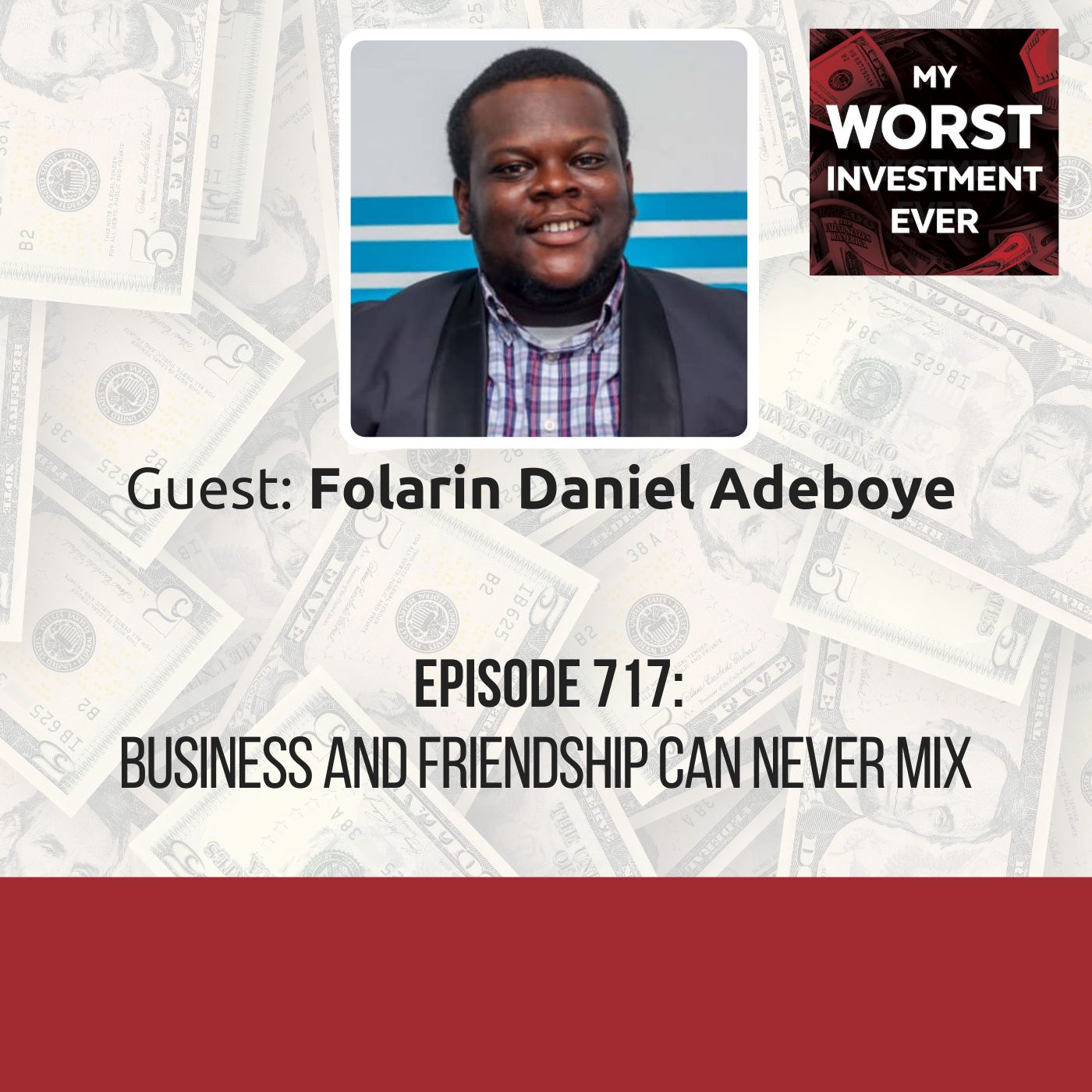
Folarin Daniel Adeboye – Business and Friendship Can Never Mix
BIO: Folarin Daniel Adeboye was a CEO and Co-Founder at F&K Savings. In 5 years of operations, F&K Savings was able to onboard over 35,000 users while processing over 4 million dollars in transaction volume.STORY: Daniel and his partner’s desire to grow F&K Savings fast made them lose substantial money to an investment they blindly entered. This, and other managerial mistakes, caused the business to go under.LEARNING: Don’t mix pleasure or family with business. Never forget why you got started. “Don’t mix pleasure or family with business; stick to basic business principles.”Folarin Daniel Adeboye Guest profileFolarin Daniel Adeboye was a CEO and Co-Founder at F&K Savings. In 5 years of operations, F&K Savings was able to onboard over 35,000 users while processing over 4 million dollars in transaction volume. F&K stopped operations due to many factors, some of which were simple mistakes by the management team. Folarin Daniel is currently consulting and branding whilst still open to new opportunities in emerging markets. He’s a tech enthusiast, a financial and business consultant, and determined to help people make better business decisions.Worst investment everDuring his university days, Daniel participated in so many activities in school. He was the Auditor General of his faculty for two years and did some internship jobs with some financial platforms. So Daniel had a basic knowledge of finances. But despite that, Daniel didn’t save any of his pocket money—and he received a lot from my parents. He was a reckless spender in school, and so when he wanted to start a business after university, he didn’t have enough money to start.Nevertheless, Daniel went ahead with his business idea because there was a need for his services. He wanted to help young students prepare for their financial future. Daniel partnered with a Ghanaian friend of his, and together, they started F&K Savings.This was at that point when startups were coming up and getting funded. The partners felt they could play in this space and do something incredible. And that was how it all started. The business started very well. They had to do everything manually because they were broke. They had to find ways to get things done. The partners got some people on board and shared the dream with them.The business had remarkable growth within two years. The partners were getting deals from companies ready to partner with them. That’s where their problems started. Down the road, the partners forgot why they started the business. They now just wanted to grow as fast as other startups did. They badly needed to raise money because they were spending so much on hiring as they needed to build the best app. Funds meant to grow the brand were used to pay people and consulting services.The partners started telling people that they were a full-fledged financial institution. They started spending more on setting up an office space. All this fast expansion started affecting the business. The partners had overexposed themselves.An investment partner came to Daniel and his partner with a fantastic offer. And since they wanted to grow too fast, they jumped onto this offer because it would give them so much money. Two years after jumping into the proposal, Daniel and his partner lost a considerable percentage of their customers’ funds to this investment after it went down.Another major issue the partners faced was that they didn’t have any frameworks in place when they got into the partnership. They simply trusted their abilities and trusted each other. They...
28:4930/07/2023
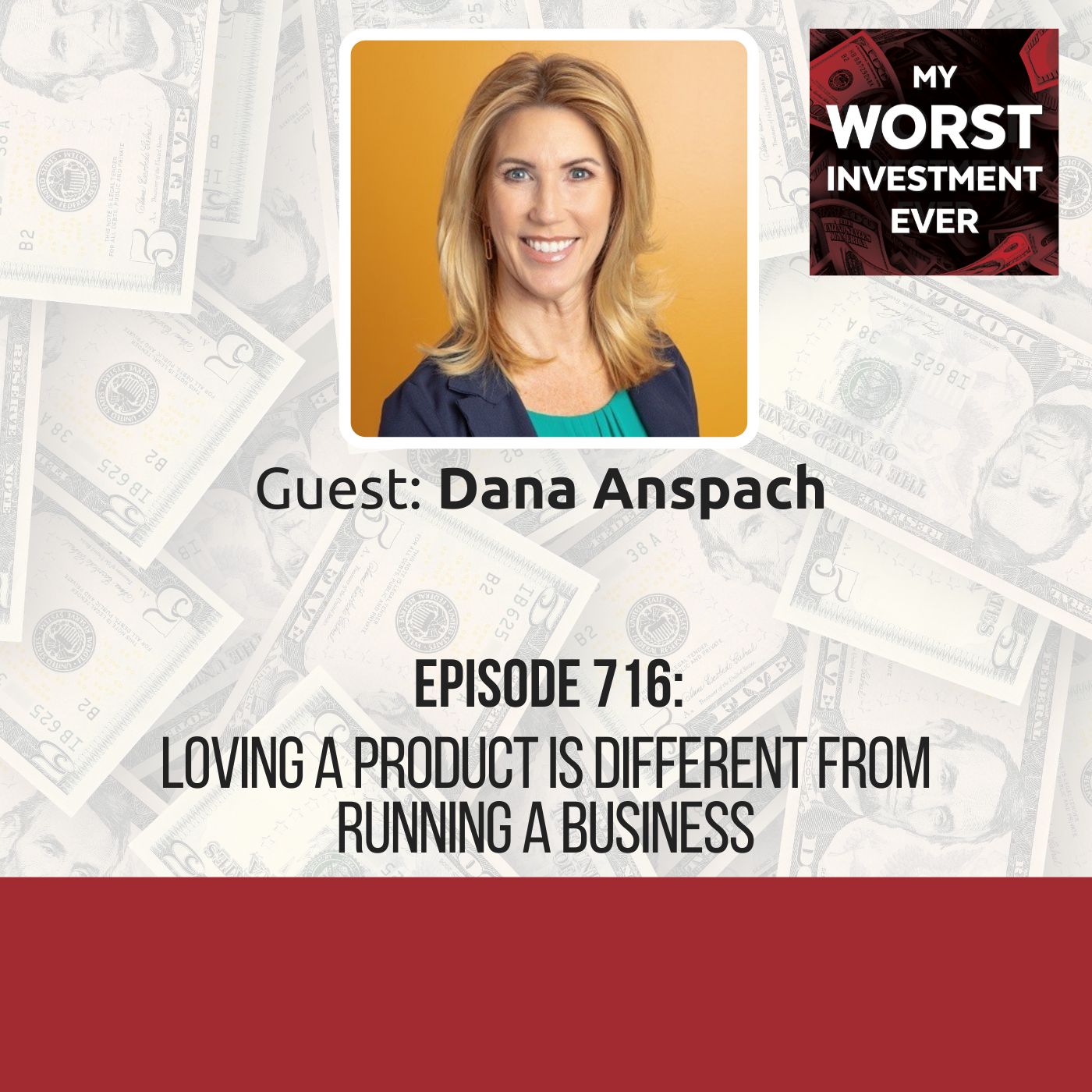
Dana Anspach – Loving a Product Is Different From Running a Business
BIO: Dana Anspach is the founder and CEO of Sensible Money, LLC, a firm specializing in retirement income planning. In 2022, Sensible Money ranked on the Inc. 5000 list of fastest-growing privately owned companies in the U.S.STORY: Dana loved a fitness product so much that she decided to open her own franchise. Soon enough, she discovered running a business is so much different from loving its product. She sold the company at a loss.LEARNING: Just because a product is great doesn’t mean the business will succeed. Instead of opening a second business, create a new revenue stream in your existing one. “Just because you love the product doesn’t mean the business itself will be highly profitable.”Dana Anspach Guest profileDana Anspach is the founder and CEO of Sensible Money, LLC, a firm specializing in retirement income planning. In 2022, Sensible Money ranked on the Inc. 5000 list of fastest-growing privately owned companies in the U.S.She is the author of How to Plan for the Perfect Retirement, a lecture series on The Great Courses and Control Your Retirement Destiny, available on Amazon. She has hundreds of articles online and numerous educational webinars on YouTube. Because of her continuing contributions to financial literacy, Investopedia named her three times to the country’s Top 100 Financial Advisors.Worst investment everFitness has been part of Dana’s life. One of her best friends married a man who founded a fitness franchise called Rockbox Fitness. When her friend moved to North Carolina, Dana and her fiancee visited. They went to check out Rockbox, and it was terrific. This was the best workout she’d ever been to.The couple inquired how much it costs to open a franchise, and they felt the franchise fee was reasonable. The price was about $40,000 at the time. The couple decided to open a franchise since there were none in the Phoenix area. They signed up to open four because of economies of scale—they wouldn’t profit from one.They found a beautiful location a mile from their house, did the pre-sales, followed the program exactly, and opened their franchise in October 2019. They had the most successful opening that the franchise had had so far. Running the gyms turned out to be more exhausting than Dana had anticipated.She thought it was all about handling the financials, payroll, and stuff that could be done in the background. But the gym required her to be at the forefront too. Not only that, they were open for less than six months when COVID hit. They had to shut down for eight weeks. They reopened for about four weeks and then got shut down again. At that point, Dana decided this wasn’t going to work.Eventually, they found a buyer for the franchise. The sale was substantially less than what the couple had put into it. Getting the franchise open cost about $400,000; they sold it for just $100,000.Lessons learnedLoving a product and being thrilled with the daily running of the business and making it profitable are two different things.Just because a product is great doesn’t mean the business will be a success.Andrew’s takeawaysInstead of opening a second business, create a new revenue...
27:3127/07/2023
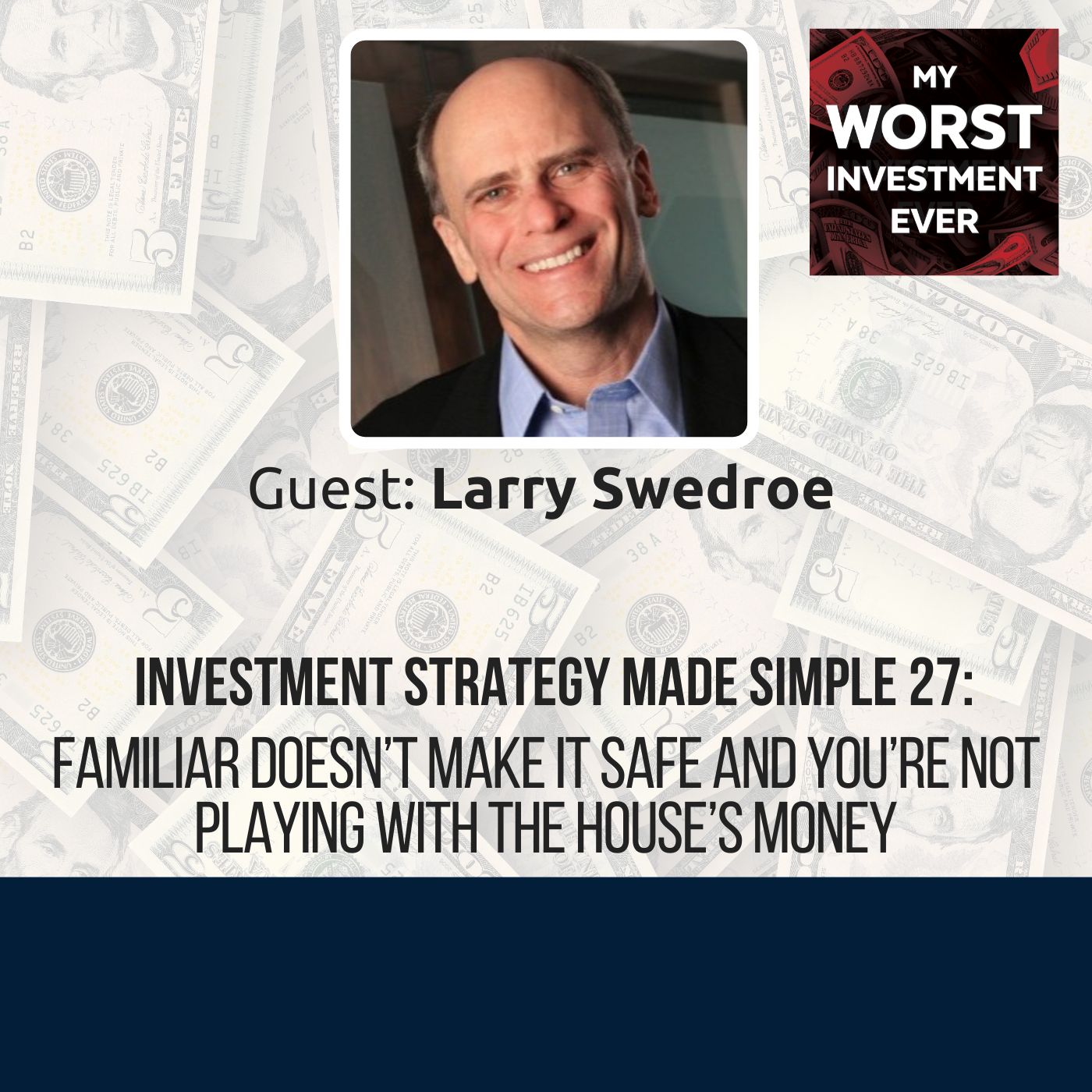
ISMS 27: Larry Swedroe – Familiar Doesn’t Make It Safe and You’re Not Playing With the House’s Money
In this episode of Investment Strategy Made Simple (ISMS), Andrew and Larry discuss three chapters of Larry’s book Investment Mistakes Even Smart Investors Make and How to Avoid Them. In this eighth episode, they discuss mistake number 13: Do you confuse the familiar with the safe? Mistake number 14: Do you believe you’re playing with the house’s money? And mistake number 15: Do you let friendship influence your choice of investment advisors?LEARNING: Just because you’re familiar with something doesn’t make it less risky. Diversify globally to get the real benefits of diversification. Your financial advisor is not your friend; it’s a business. Value and protect your investment gains as much as you value and protect the principle. “We’re all human beings and have made these mistakes. What differentiates smart people from others is that they don’t repeat the same behavior when they learn it’s a mistake. They change it. They become aware of investment biases and overcome them either on their own or with the help of a trusted financial advisor.”Larry Swedroe In today’s episode, Andrew continues his discussion with Larry Swedroe, head of financial and economic research at Buckingham Wealth Partners. You can learn more about Larry’s Worst Investment Ever story on Ep645: Beware of Idiosyncratic Risks.Larry deeply understands the world of academic research and investing, especially risk. Today Andrew and Larry discuss a chapter of Larry’s book Investment Mistakes Even Smart Investors Make and How to Avoid Them. In this eighth episode, they discuss mistake number 13: Do you confuse the familiar with the safe? Mistake number 14: Do you believe you’re playing with the house’s money? And mistake number 15: Do you let friendship influence your choice of investment advisors?Missed out on previous mistakes? Check them out:ISMS 8: Larry Swedroe – Are You Overconfident in Your Skills?ISMS 17: Larry Swedroe – Do You Project Recent Trends Indefinitely Into the Future?ISMS 20: Larry Swedroe – Do You Extrapolate From Small Samples and Trust Your Intuition?ISMS 23: Larry Swedroe – Do You Allow Yourself to Be Influenced by Your Ego and Herd Mentality?ISMS 24: Larry Swedroe – Confusing Skill and Luck Can Stop You From Investing WiselyISMS 25: Larry Swedroe – Admit Your Mistakes and Don’t Listen to Fake Experts<a...
50:1524/07/2023
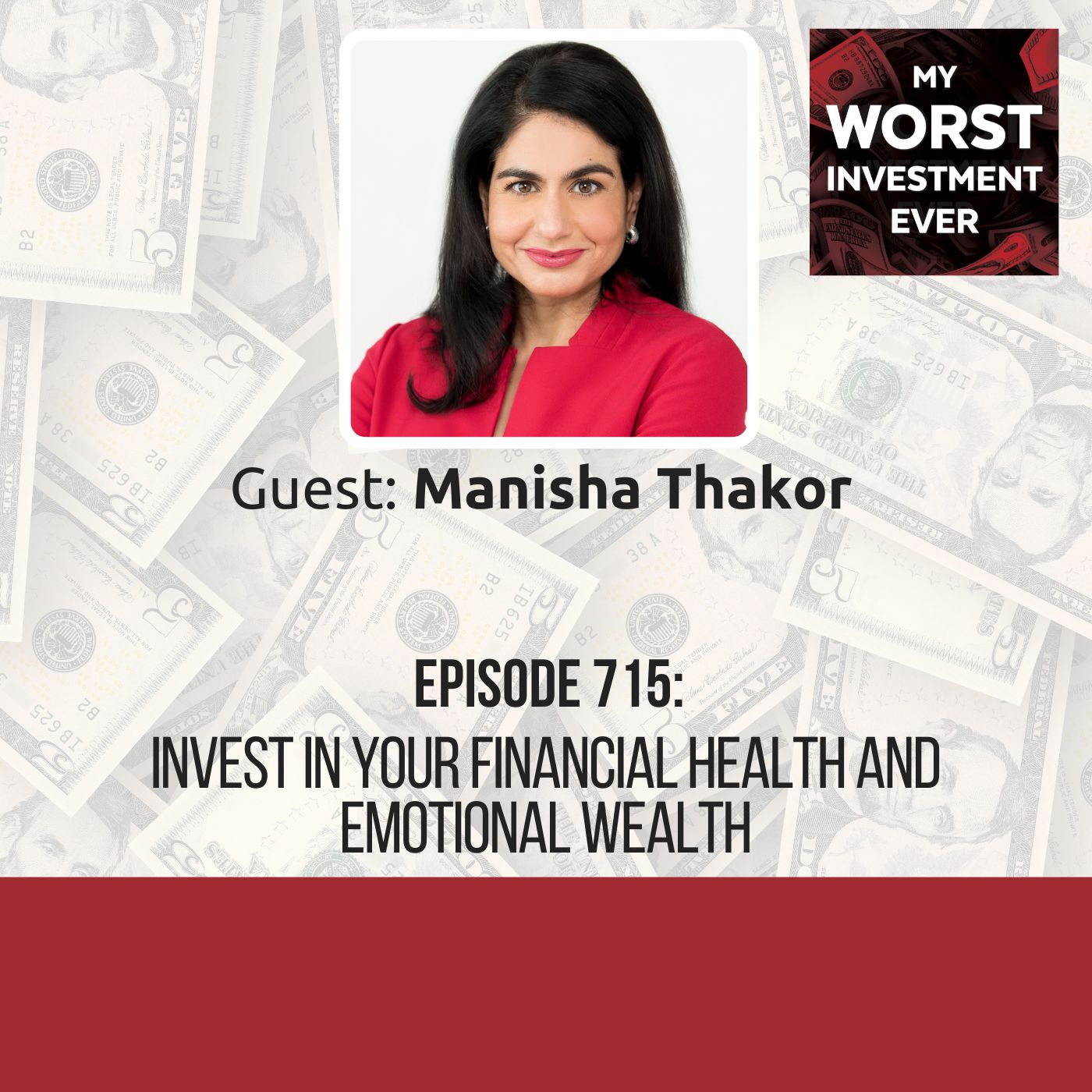
Manisha Thakor – Invest in Your Financial Health and Emotional Wealth
BIO: Manisha Thakor has worked in financial services for over 30 years, focusing on women’s economic empowerment.STORY: From a very young age, Manisha equated her self-worth to her achievements. This led her to overwork herself almost to death—twice.LEARNING: Don’t underestimate the incredible power of the net present value of your future earnings. Invest concurrently in your financial health and your emotional wealth. “Investing concurrently in your financial health and your emotional wealth is the secret formula to maximizing the NPV of your potential future earning stream.”Manisha Thakor Guest profileManisha Thakor has worked in financial services for over 30 years with a focus on women’s economic empowerment. A nationally recognized thought leader around the issues of financial literacy and education, Manisha has been featured in national media such as The Wall Street Journal, The New York Times, Barron’s, CNN, and CNBC. She has written two personal finance books for women in their 20s and 30s. Her latest book MoneyZen: The Secret to Finding Your “Enough,” comes out on August 8th, 2023. Manisha earned her MBA from Harvard Business School and her BA from Wellesley College. She also holds the CFA and CFP designations.Worst investment everGrowing up, Manisha lived in a small town in Indiana. Being mixed race, she got picked on a lot, particularly in grades four, five, and six. Those formative years put her on the search for a sense of belonging. The cheerleaders and football players didn’t like Manisha, but the teachers did because she worked hard and got good grades. So Manisha started getting endorphin high from teachers’ approvals and getting good grades. She kept studying and going after those grades because they made her feel whole and worth something in a way that she didn’t feel socially.When Manisha entered finance, she realized there were no teachers or grades, just bosses and money. And so, she developed a profoundly toxic relationship with work, money, success, and accomplishments. Manisha had come to identify her self-worth in her school years with grades. In her professional years, Manisha placed her self-worth in her net worth. Because Manisha was so locked into her identity and sense of self-worth as her achievements at work, she didn’t have friends or hobbies. She worked seven days a week and traveled 40 weeks a year for a decade.One day she was sitting on a plane and had tears streaming down her face. She had piles of paperwork on her small tray that she was trying to work on. All Manisha could think of was that she had no idea how she would make it through the next 48 hours of meetings because she had no energy left.A lady sitting across from Manisha came and gave her this look like she knew what she was going through. The lady opened this expensive-looking silver pill case and pulled out three yellow pills. She handed them to Manisha and told her to take just half a pill. Manisha grabbed the pills like candy. She didn’t even ask what she was putting in her mouth. Turns out it was Valium, and it helped. Manisha was able to calm down. She took another pill the following day and made it through her meetings.Manisha kept this life going until she had two near-death experiences. Both times Manisha wished she’d spent more time with family, that she’d not missed her grandmother’s funeral or the many weddings because she had meetings that were so important.The second near-death experience was her big wake-up call. Manisha had...
30:2523/07/2023
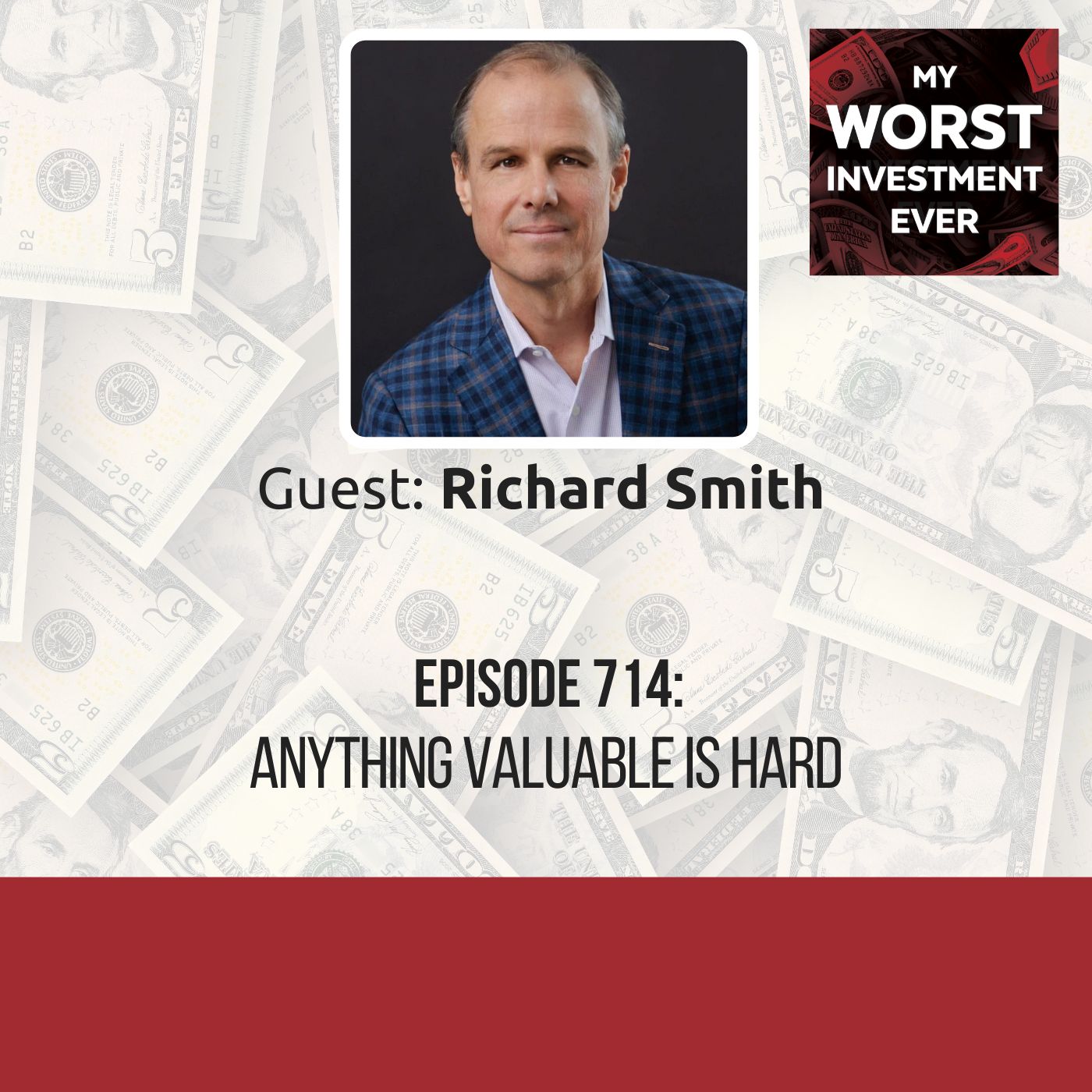
Richard Smith – Anything Valuable Is Hard
BIO: Dr. Richard Smith – Berkeley Mathematician and Ph.D. in System Science – is a fintech entrepreneur, the CEO of The Foundation for the Study of Cycles, and cofounder of the investment tool Finiac.STORY: Richard invested his entire live savings ($10,000), and in 18 months, it had grown to $40,000. Then suddenly, the investment went down to $30,000. He believed it would go up again, so he held on. Then it went further down to $20,000. Richard kept waiting. Eventually, it went to $10,000, and that’s when he panicked and took out all his money.LEARNING: Integrate trailing stops. It’s hard to do the right thing in the markets. “The markets wouldn’t be as interesting or as potentially valuable if it wasn’t hard. Anything valuable is hard.”Richard Smith Guest profileDr. Richard Smith – Berkeley Mathematician and Ph.D. in System Science – is a fintech entrepreneur, the CEO of The Foundation for the Study of Cycles, and cofounder of the investment tool Finiac.Richard has built a reputation as “The Doctor of Uncertainty” amongst his academic peers and has helped government agencies and Fortune 500 companies make sense of complex data sets.With his background in mathematical theories of uncertainty combined with his investing and trading experience, he is a regular speaker and lecturer and particularly enjoys opportunities to share his knowledge and help others gain an edge in the market.Worst investment everIn 1998/99, during the Dotcom boom, Richard had just started investing while in graduate school. In about 18 months, he’d managed to get his investment account up from $10,000 (his life savings at the time) to $40,000. Richard was over the moon and felt like a real expert investor.Then in March of 2000, all of a sudden, his $40,000 fell to $30,000 practically overnight. Though a significant loss, Richard decided to hold onto the investment and wait until it returned to $35,000. But instead, it went down to $20,000. Again, he said he’d get out when it gets back to $25,000. Finally, it went down to $10,000, and at that point, Richard panicked and got all his money out of the market.Lessons learnedIntegrate trailing stops.It’s hard to do the right thing in the markets.Andrew’s takeawaysAs a new investor, protect your capital first. This allows you to stay in the game, keep learning, and win over time.Actionable adviceGet your head out of the mass media. The opportunity isn’t there if everybody’s looking in the same place. Be willing to look off the beaten path.No.1 goal for the next 12 monthsRichard’s number one goal for the next 12 months is to make his business cash flow positive.Parting words “Stay the course. Remember that it’s time in the markets, not just timing the markets that will bring you success. Targeting the right level of exposure for you is also very important.”Richard Smith [spp-transcript] Connect with Richard SmithLinkedInTwitter<a href="https://www.youtube.com/@FSCtv/featured" rel="noopener noreferrer"
50:1619/07/2023
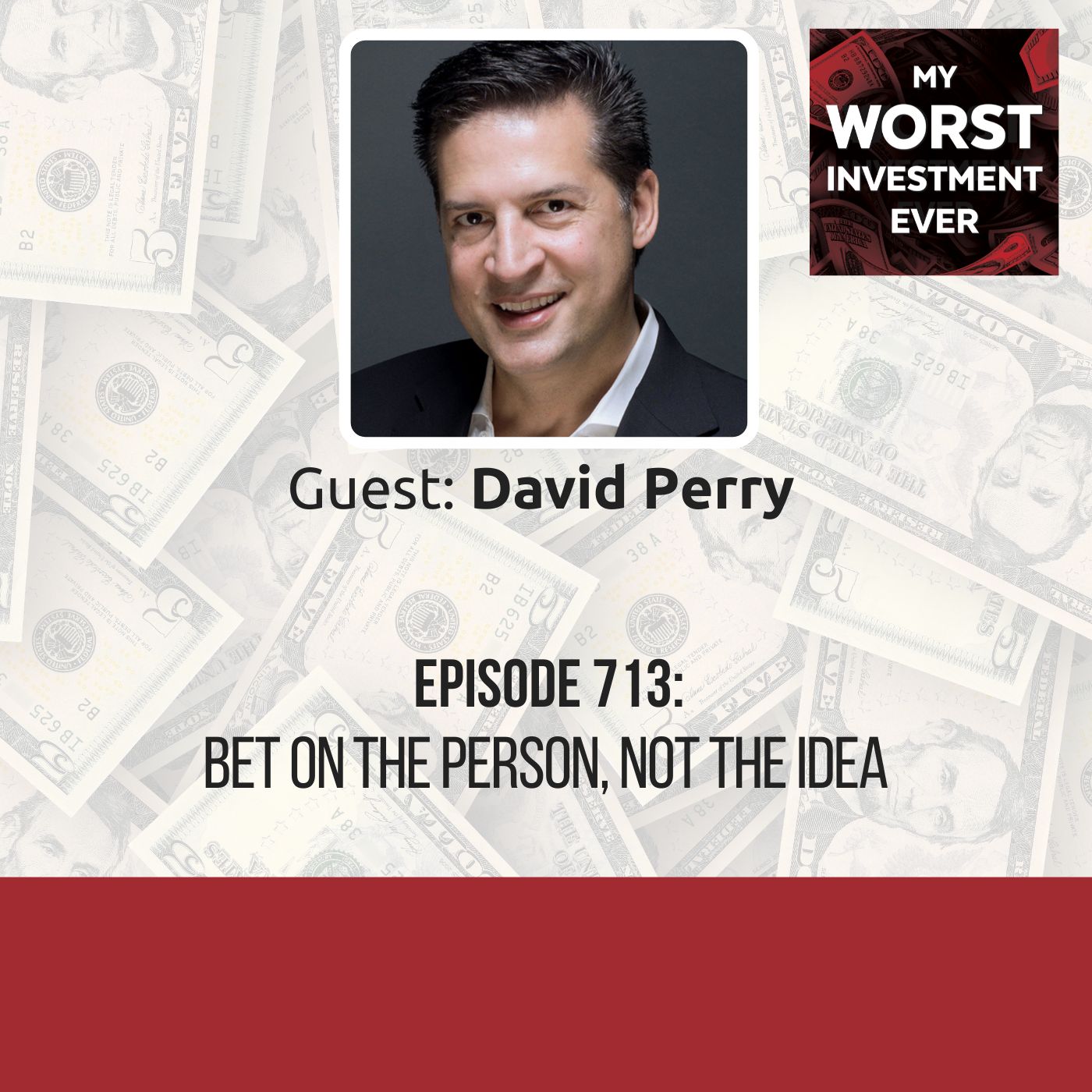
David Perry – Bet on the Person, Not the Idea
BIO: David Perry was in the video game industry for over 30 years, making hits like The Matrix, Aladdin, The Terminator, and Earthworm Jim. He sold his last company to Sony PlayStation and the one before that to Atari. He’s now building a startup in e-Commerce called Carro.STORY: One of David’s top former employees started a VR company and invited him to invest. Though David believed in this employee, experiencing motion sickness while trying out the VR games made him not invest in what became a multi-billion dollar company.LEARNING: When you really believe in somebody, go ahead and support them. Bet on the person, not the idea. “When you get great people, incredible things tend to happen. So when you’re betting on a CEO, bet on someone who you think can attract talent.”David Perry Guest profileDavid Perry was in the video game industry for over 30 years, making hits like The Matrix, Aladdin, The Terminator, and Earthworm Jim. He sold his last company to Sony PlayStation and the one before that to Atari. He’s now building a startup in e-Commerce called Carro. If you email [email protected] and mention My Worst Investment Ever podcast, you’ll get VIP personal support.Worst investment everDavid firmly believed that someday, every game ever made would be available on every device everywhere in the world instantly. And so, if that will eventually exist, why not start building it now?With that thought in mind, David began to build that technology and had some massive breakthroughs. He demonstrated that you could play a game from the cloud with the same feeling as playing with a console on your table. That caused people’s heads to pop off. Samsung wanted to work with David to power its video game strategy, and Sony bought the company.David’s employees made significant amounts of money from the company’s success and eventual sale. One of the employees decided to leave and start his own company using the money he had just made from the exit to Sony. As a CEO, David was committed to working with PlayStation. So he was watching this former employee build his own company.The employee contacted David and asked if he’d be interested in investing in his new company. David decided to check out the company. The guy demonstrated what he was working on, which was virtual reality. The company was called Oculus. David sat down and put on the VR headset. Then he started getting motion sickness because he was moving all over the place. He couldn’t wait to finish the demo.David was initially very interested in investing in the company because he genuinely believed in his former employee. But after the motion sickness, he needed time to think about it. He researched and read some military papers on how the military had tried their hardest to stop motion sickness but had found no solution as it’s biological. David decided to pass on the opportunity to be a founding Oculus investor.The company was a huge success and was bought for billions of dollars. David would have made hundreds of millions of dollars had he invested in the company.Lessons learnedWhen you really believe in somebody, go ahead and support them.Bet on the person, not the idea.Andrew’s takeawaysWe get stuck into frames of reference, and sometimes we get beholden to those references, and we can’t think beyond them.Actionable adviceIf there’s...
37:1018/07/2023
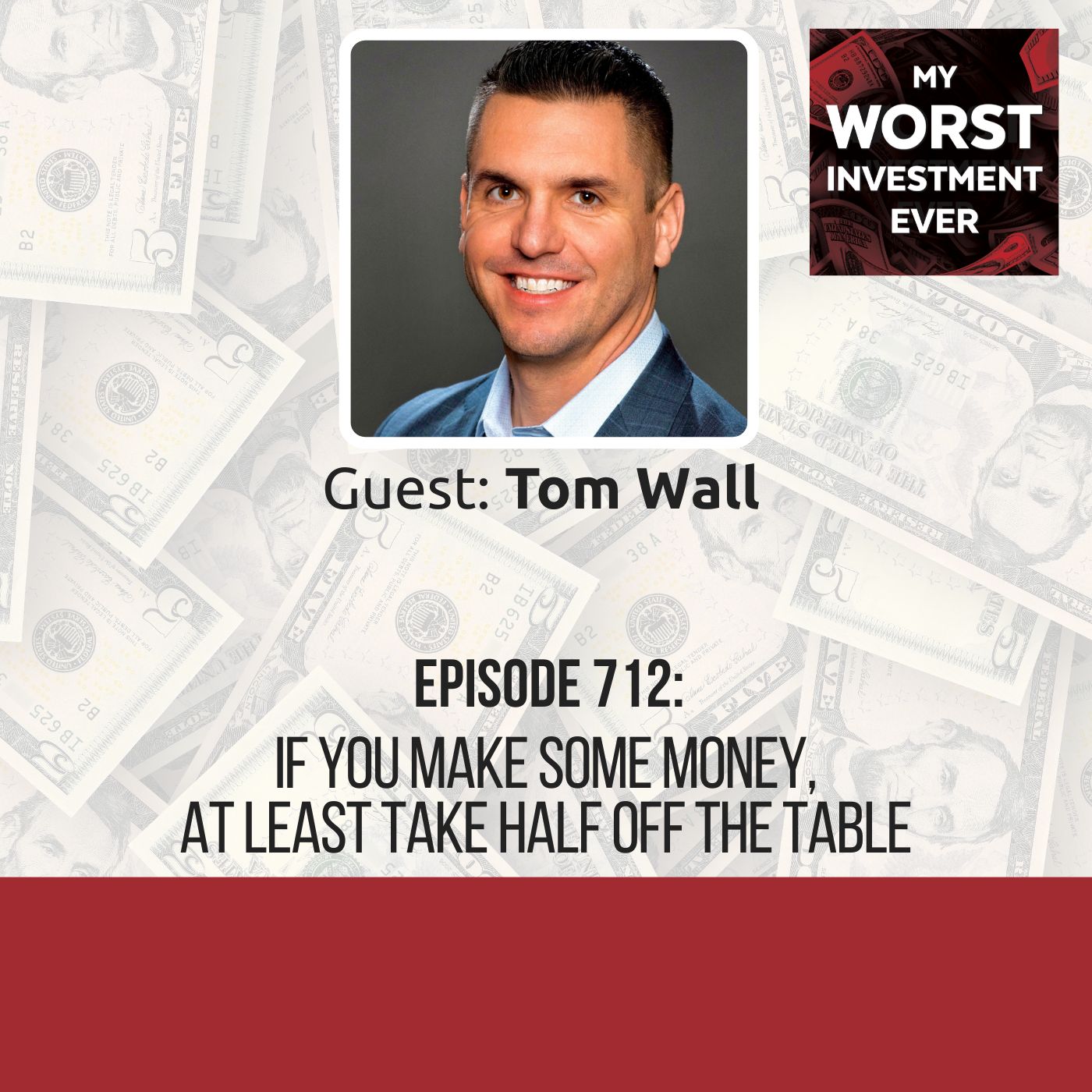
Tom Wall – If You Make Some Money, at Least Take Half off the Table
BIO: Tom Wall holds a Ph.D. in Retirement Income Planning, with original research on Whole Life as a Fixed Income Alternative under the advisement of industry thought leaders: Wade Pfau, Michael Finke, and Stephen Parrish.STORY: Tom got pulled into the Bitcoin frenzy in 2018 and made huge gains. He had also invested in an NFT performing really well and made 15X his investment. Tom took his investment from the NFT and invested the money in Bitcoin. Then Bitcoin’s value dropped, and Tom lost almost half of his investment.LEARNING: If you make some money, sell, or at least take half off the table. Have a piece of your portfolio that is continually growing but also accessible. “If you make any gain, take back your original investment, and let your gain ride.”Tom Wall Guest profileTom Wall holds a Ph.D. in Retirement Income Planning, with original research on Whole Life as a Fixed Income Alternative under the advisement of industry thought leaders: Wade Pfau, Michael Finke, and Stephen Parrish. His focus on academics and selling from a place of integrity comes from a 20-year career of positioning whole life insurance and competing against its alternatives.Recently he published Permission to Spend: Maximize Your Retirement with the Best-Kept Secret in Personal Finance. Starting in college as an award-winning advisor with Northwestern Mutual before moving his practice to MassMutual, he subsequently grew his career in prominent home office sales and marketing leadership roles.Tom has been a well-known storyteller at nationwide perennial company conferences and firm meetings. Tom now coaches and consults with financial advisors, hosts the Whole Life Masterminds study group, and authors multiple original thought leadership pieces, books, and other content.Worst investment everIn 2017/18, Tom’s friends started texting him about this thing called Bitcoin. He had heard about it before but dismissed it because he couldn’t find it anywhere or buy it. But when his friends started talking about it, he got interested and decided to invest in it. At the time, Bitcoin was at $2,000. Tom invested $10,000, and in just a year, Bitcoin’s value was $20,000. Tom made some really good money.Then the NFT craze started, and there was one in particular that Tom believed in, and he bought it. The NFT went up about 15 times his investment. Tom was pleased. Then he decided to move the NFT winnings to Bitcoin, but unfortunately, Bitcoin had started going down at the time. Tom lost over half the value of his gains.Lessons learnedIf you make some money, sell, or at least take half off the table.A bird in the hand is absolutely worth two in the bush.Have a piece of your portfolio that is continually growing but also accessible.Andrew’s takeawaysIf you make some gains, take 50% off the table, and keep the other 50%.No.1 goal for the next 12 monthsTom’s number one goal for the next 12 months is to add value to as many people as possible and be the voice of reason in the insurance space.Parting words “Go out there and take those risks. Just make sure you do it responsibly and take those gains off the table when you get them.”Tom...
28:3516/07/2023
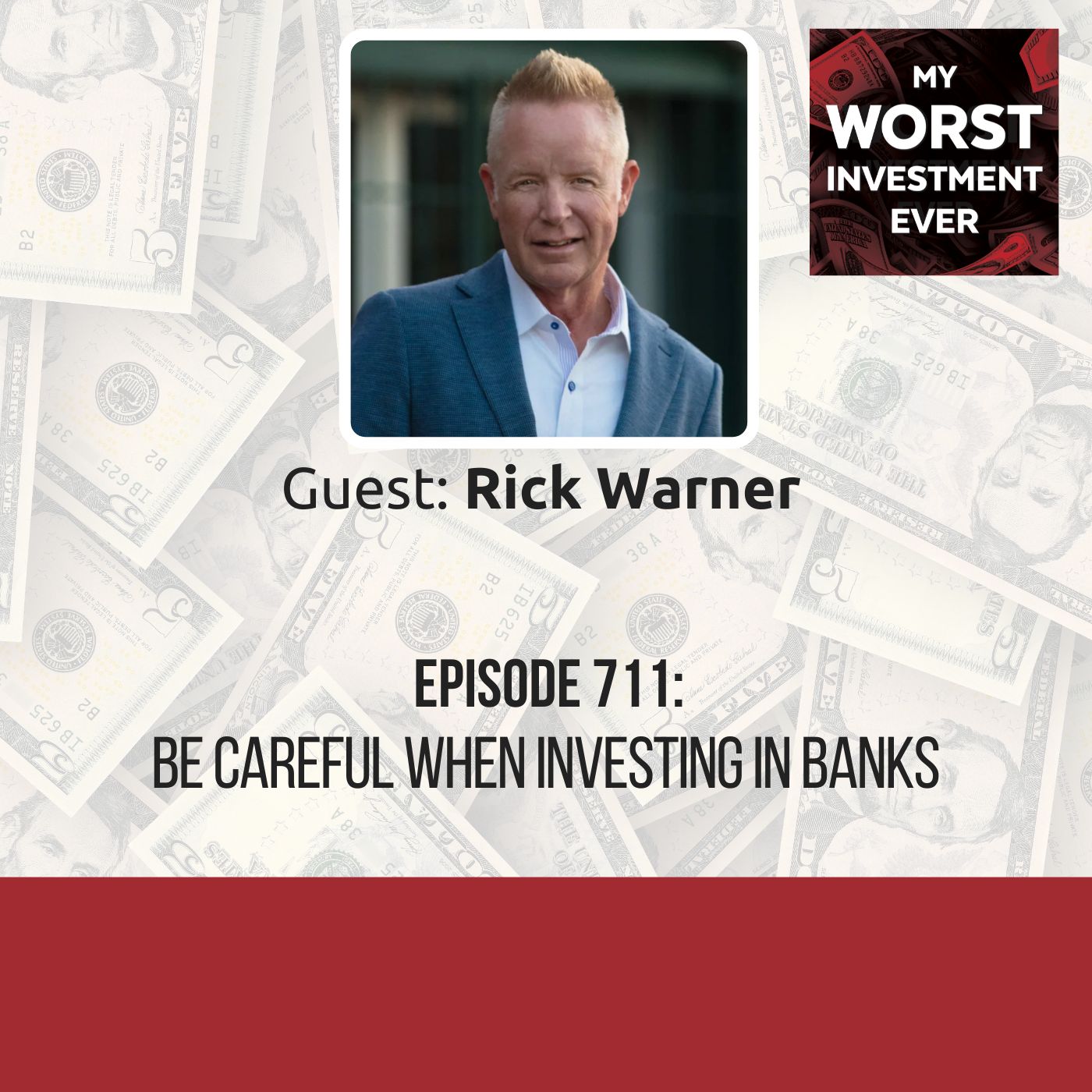
Rick Warner – Be Careful When Investing in Banks
BIO: Rick Warner is a personal development coach, mentor, and highly respected real estate broker based in California. Rick’s story is one of triumph over adversity.STORY: Rick took his money from well-performing stocks and decided to time the market. After much waiting, he came across the First Republic Bank’s stock, whose share price had fallen from $300 to $30. He bought 700 shares at $29 each. The price kept falling. Rick bought 700 more shares at $13, hoping the price would turn around, but it didn’t. The bank was bought out, and the shares went to zero.LEARNING: Do a lot of research before investing. Banks are very volatile, so you must be careful when investing in them. “Availing myself to others, reading books, learning stuff, and listening to people like you has been my biggest game changer.”Rick Warner Guest profileRick Warner is a personal development coach, mentor, and highly respected real estate broker based in California. Rick’s story is one of triumph over adversity. At 20 years old, he found himself homeless and addicted to drugs. But with the help of a supportive community, he was able to turn his life around. Now, over 30 years later, Rick remains committed to personal growth and helping others achieve success. He has developed the Navigator program, a groundbreaking approach to personal productivity and purposeful living.Worst investment everRick had made some pretty good investments in stocks about three years ago. Then he felt things would go sideways, so he took all his money off the table. Rick’s plan was to wait and time when the market was right to reinvest. He waited and waited, but the market kept going up and stayed up, so Rick couldn’t get in until recently with the banking crisis.First Republic Bank’s stock, previously $300, had gone down to $30. He figured this was what he’d been waiting for. Rick bought 700 shares for $29 each, and by the end of that day, it had gone down to $21.The stock price kept falling; at some point, it was $13. Rick figured this was a big well-known bank with a good reputation and had done lots of business, so the stock price would eventually turn around. With this in mind, he decided to double down and bought another 700 shares. Three weeks later, the share price was $3. JP Morgan later bought the bank, and the shares went to zero.Lessons learnedDo a lot of research before investing.Andrew’s takeawaysWhen investing in banks, you invest in a highly speculative asset.Banks are very volatile, so you must be careful when investing in them.If you invest in something and it starts to go down, and you never thought it would, there’s nothing wrong with getting out. You can always get in again at another point.Actionable adviceAvail yourself to the people that have been around before you and be willing to ask them for help instead of doing everything yourself. Learn from other people’s mistakes instead of waiting to make the mistakes yourself.Rick’s recommendationRick recommends reading The Four Agreements, a simple guide on personal development. You can also look Rick up on his website if you want to just have a conversation or if you need mentorship.No.1 goal for the next 12 monthsRick’s number one goal for the next 12 months is to make his real estate business location independent so he can spend more time in his...
33:0412/07/2023
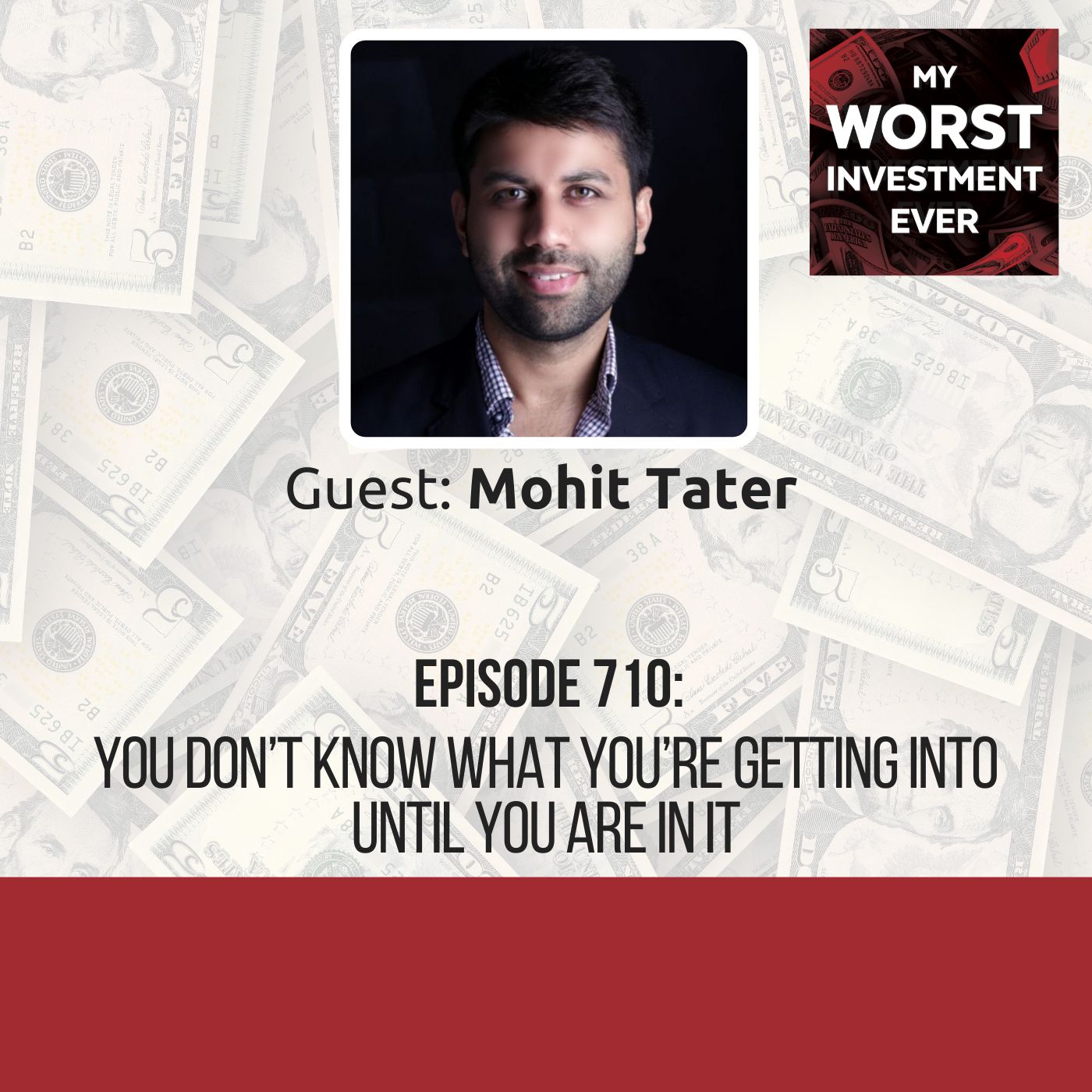
Mohit Tater – You Don’t Know What You’re Getting Into Until You Are in It
BIO: Mohit Tater is a serial entrepreneur, investor, and consultant. He founded BlackBook Investments and quickly became a recognized expert investor in online businesses and digital assets.STORY: Mohit got enticed by the numbers his favorite pizza shop was turning and decided to start his own shop. Since he and his partner had no experience in the F&B industry, they were to receive full support from the franchise owner. Unfortunately, the owner went into a coma before the shop opened. The partners tried all they could, but the shop eventually failed.LEARNING: Don’t venture into an industry you don’t understand and chase high returns. You don’t know what you’re getting into until you are in it. “It’s more difficult to execute something you don’t know. Try and stick to something that is already working for you.”Mohit Tater Guest profileMohit Tater is a serial entrepreneur, investor, and consultant. He founded BlackBook Investments and quickly became a recognized expert investor in online businesses and digital assets. Mohit has extensive experience in SEO, content marketing, social media marketing, and conversion rate optimization. He has worked closely with brands such as eBay, Groupon, Microsoft, Nokia, and many more on their digital marketing strategies. Today, Mohit lives his passion as an investor, growing online businesses for himself and his clients.Worst investment everMohit would visit a pizza place in his city every so often. One day he casually talked to the manager about how many pizzas they sell daily, what the operations are like, how much it costs to start a pizza shop like that one, etc. The numbers the manager shared with Mohit were very lucrative and enticing.Mohit set up a meeting with the owner of the franchise. He seemed very positive, and the numbers looked good. The guy had the whole business plan mapped out for expansion. Mohit and his business partner decided to open a pizza shop with the manager’s support, who would hire the team for them and ensure that the operations ran smoothly. Mohit and his partner had no experience in this business. Still, they believed they’d learn eventually and hopefully turn around and make a profit.The partners spent $100,000 setting up the shop, and just before it was about to open, the franchise owner got a stroke and went into a coma. This guy was the brains behind branding, marketing, operations, and everything, basically. Without him, Mohit and his partner were like sitting ducks. They had no option but to continue with the plan because they had spent so much money building it.The team the franchise owner had hired came and tried to run the pizza shop as efficiently as possible. But they were not turning a profit. The partners were just putting more money every month into sustaining and still not breaking even. Both partners had no experience with the F&B industry, and even though they tried all they could, the shop eventually failed.Lessons learnedDon’t venture into an industry you don’t understand and chase high returns because it’s not as easy as it looks from the outside.Unless you have good experience in an industry, don’t bother putting your money at stake. Learn about it first.You don’t know what you’re getting into until you are in it.You have to dedicate time to your business.Andrew’s takeawaysGet into a business knowing that unexpected things are going to happen.You think you can control all the variables,...
24:5611/07/2023
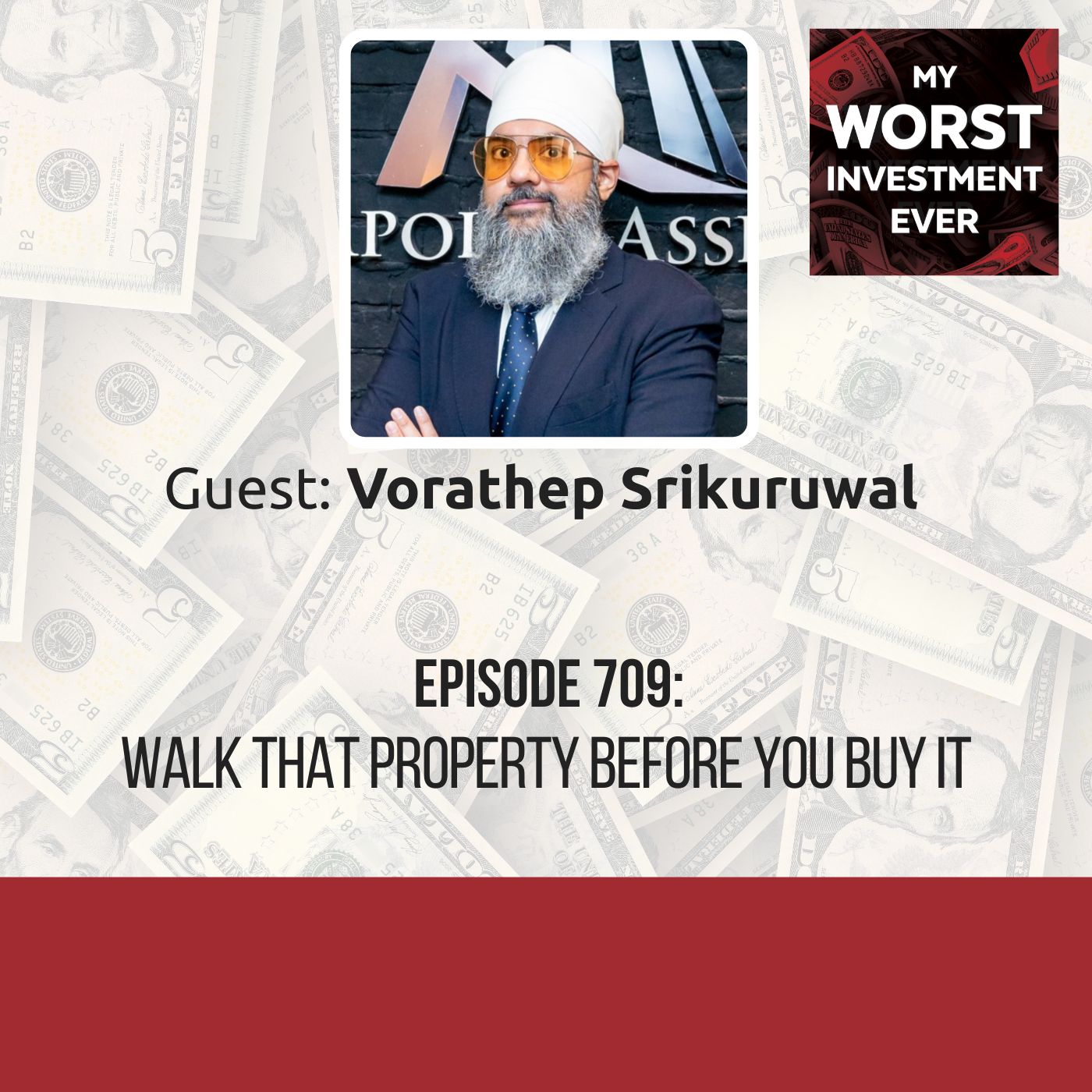
Vorathep Srikuruwal – Walk That Property Before You Buy It
BIO: As the owner of Apollo Assets Co Ltd, Mr. Vorathep Srikuruwal is a prominent figure in the real estate industry of Thailand. He has established a track record and extensive experience as a visionary leader in this field.STORY: Vorathep came across a bank property he thought would be a good investment. He bought it for half its value and even got the bank to give him a loan. His biggest mistake was never visiting the property in person before buying. If he had, he’d have seen its terrible state.LEARNING: If you’re thinking of buying anything, whether cheap or expensive, first go there, and have a look. Just because it’s cheap doesn’t mean you have to buy it. “Walk through that property, touch it, and do a lot of homework before you buy it.”Vorathep Srikuruwal Guest profileAs the owner of Apollo Assets Co Ltd, Mr. Vorathep Srikuruwal is a prominent figure in the real estate industry of Thailand. He has established a track record and extensive experience as a visionary leader in this field.His business acumen has enabled Apollo Assets Co Ltd to reach great heights, placing it among the leading players in the Thai real estate industry.Having earned a reputation for excellence, innovation, and integrity, Vorathep continues to contribute to the growth and development of the Thai real estate market.He is happy to offer free real estate consultancy, whether buying /selling/renting/leasing or prelim valuations of the assets in Bangkok and the rest of Thailand.Worst investment everVorathep started his real estate business in 2007 as a family business. About 10 years later, after building about seven projects, Vorathep saw an opportunity to buy two commercial shophouses in Chiang Mai, Thailand. The building was on the main road, just two minutes from one of the CBDs. The property belonged to a bank.Vorathep did a lot of homework before investing in the property. He checked the location and everything nearby (using Google Maps). He also used his knowledge of Chiang Mai to evaluate the property. The market valuation for the shophouses was $400,000. The property was roughly 800 square meters in size. The four-story building had a rooftop that could be converted into a lovely boutique hotel, office, or restaurant.The real estate mogul told the bank he’d be interested in getting the property for $200,000 because it was a non-performing asset. Three months later, the bank called and said he could have the property for $200,000. He just had to pay 1% of the value ($2,000), and the bank would provide him a loan for the property for another eight years. The deal seemed too good to be true. Vorathep did the math and saw that if he rented the property, he’d get about $4,000, pay $2,500 to the bank, and make a profit of $1,500 monthly. It was a good deal, so he accepted it.Vorathep put a for rent sign on the building, but six months later, he had no tenants. This shocked him because the building was in a decent location with a bank, shops, hotels, and a university nearby. After two years of paying the bank loan out of pocket, Vorathep decided to do something because the building was still not bringing in any income. He visited the building for the first time. Yes, Vorathep didn’t do a property visit before paying for it. He had relied on the photos the bank had sent him and Google Maps.The building was in a horrible state; no wonder nobody wanted to rent it. A year later, Vorathep flew to Chiang Mai after the COVID lockdowns. He went to the building...
29:2709/07/2023
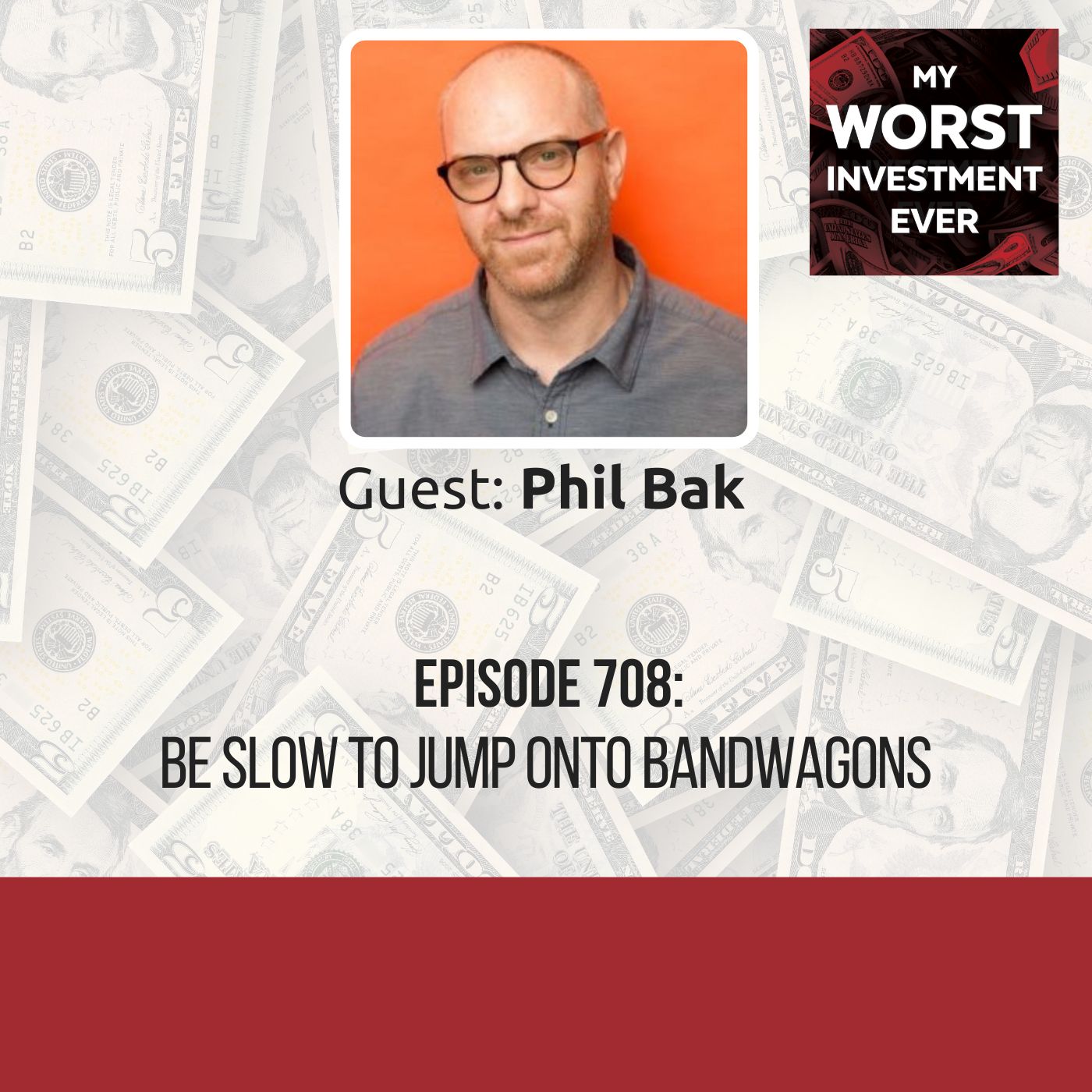
Phil Bak – Be Slow to Jump Onto Bandwagons
BIO: Phil Bak is the CEO of Armada ETFs, a REIT-specialty asset manager that delivers customized solutions to REIT investors through ETFs, SMAs, and proprietary AI and machine learning REIT valuation models.STORY: Phil got into baseball cards when he was 14. Rookie Greg Jeffries became the hype one year and was poised to be the next big thing. Phil bought the hype, sold all his cards, and invested in Jeffries’ cards. He believed cards would be worth $40 to $50 a piece in just a few years. It never happened because Jeffries’ career didn’t pan out, and the entire baseball card bubble collapsed.LEARNING: Be slow to jump onto bandwagons. Expect the unexpected, be prepared, and have a backup plan. Be diversified in as many different ways as possible. “As long as you can recognize your mistake, learn and grow from it, then you understand that investing is a risky business. That will make you a smarter investor.”Phil Bak Guest profilePhil Bak is the CEO of Armada ETFs, a REIT-specialty asset manager that delivers customized solutions to REIT investors through ETFs, SMAs, and proprietary AI and machine learning REIT valuation models. Phil has previously served as the Founder/CEO of Exponential ETFs (acquired by Tidal Financial Group), Chief Investment Officer at Signal Advisors, and Managing Director at the New York Stock Exchange.Phil is the author of two patents on innovative ETF structures and has led market structure enhancements that have become industry standard. Phil has been featured in top-tier media outlets such as the Wall Street Journal, Bloomberg, CNBC, Financial Times, and Reuters. Phil hosts The Phil Bak Podcast and writes regularly on Substack.Worst investment everAt 14, Phil got interested in baseball cards after accompanying his brother to card shows. He saved all the money he made from his summer jobs and bought Roberto Clemente cards, which were like a blue chip. With time he also bought other cards.The following year, a young guy was coming up, Greg Jeffries, who was poised to be the next big thing. Phil bought the hype. He sold all his cards and decided to invest in just this one card. He got himself a bounty of 25-30 Greg Jeffries cards.Phil believed this guy would be the next big superstar, and his cards would be worth $40 to $50 a piece in just a couple of years. It never happened because Jeffries’ career didn’t pan out, and the entire baseball card bubble collapsed. Phil still has a stack of Greg Jeffries rookie cards that are literally worthless somewhere in his closet.Lessons learnedBe slow to jump onto bandwagons.Expect the unexpected, be prepared, and have a backup plan.Be diversified in as many different ways as possible.Andrew’s takeawaysThere are many risks around the corner that you only know about once you get some experience. So be very careful, mindful, and try to learn as much as possible, but don’t put all your money down.Actionable adviceThe worst time to invest in anything is after a big run because there’s always an element of mean reversion and cyclicalities. Never chase the hype, be patient. If you’ve missed it, wait for the next opportunity. There’s always there’s another opportunity coming.Phil’s...
34:5605/07/2023
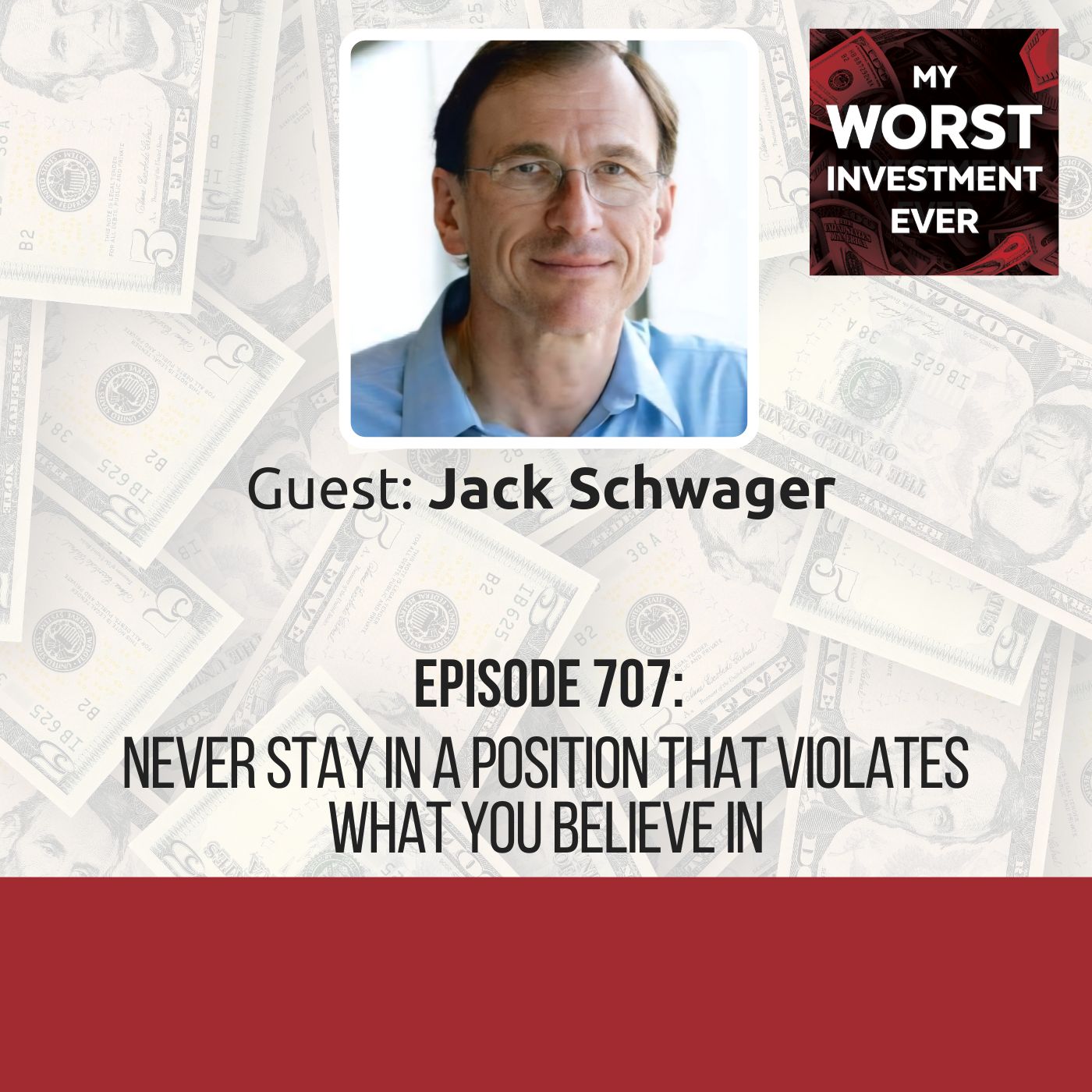
Jack Schwager – Never Stay in a Position That Violates What You Believe In
BIO: Jack D. Schwager is a recognized industry expert on futures and hedge funds and the author of the iconic Market Wizards series, in which he interviewed about 70 trading legends of our time.STORY: Jack stayed too long in a position where his short was the strongest and his long the weakest, even though he knew this wasn’t the way to invest.LEARNING: Never stay in a position that violates something that you believe in. In every position, know where you’ll get out before you get in. “A mistake is not a trade that loses money. It’s a trade where you did something that violated whatever your approach is that makes money over time.”Jack Schwager Guest profileJack D. Schwager is a recognized industry expert on futures and hedge funds and the author of the iconic Market Wizards series in which he interviewed about 70 trading legends of our time.His most recent work in the series is Unknown Market Wizards, published in November 2020. Previous books in the series include Market Wizards (1989), The New Market Wizards (1992), Stock Market Wizards (2001), Hedge Fund Market Wizards (2012), and The Little Book of Market Wizards (2014). His other books include the revised edition of A Complete Guide to the Futures Markets (2017). Market Sense and Nonsense (2013), Getting Started in Technical Analysis (1999), and the three-volume Schwager on Futures series (1995-96).Worst investment everIn late 2008, the world was falling apart. Jack looked at certain things like the metals index, down about 80%. He thought China was still an emerging market growing rapidly and had every reason to continue growing. Jack believed that this economy would come back somewhat.So, Jack decided to buy ETF calls on China and the metals as far out as he could, assuming that the longer the time, the more likely they were to come back. He bought them deep out of the money, so they were pretty cheap.Several years later, Jack still had that position. Instead of just taking the profits, he hedged himself by selling the S&P Retail ETF (XRT) and the NASDAQ ETF. Jack put himself in a spread position where he was short NASDAQ and the retail index and long China.One day, China dropped 2%, and the XRT rose 2%. So Jack’s long position went down 2%, and his short position went up 2%. So he got a 4% loss on position in a single day. Essentially, you want to be long the strongest and short the weakest. Jack’s position was precisely the opposite. Instead of getting out of the position, he stayed, hoping it would return in a bit, but it didn’t. Jack eventually got out but lost most of his profits.Lessons learnedEnsure your long position is the...
46:4004/07/2023
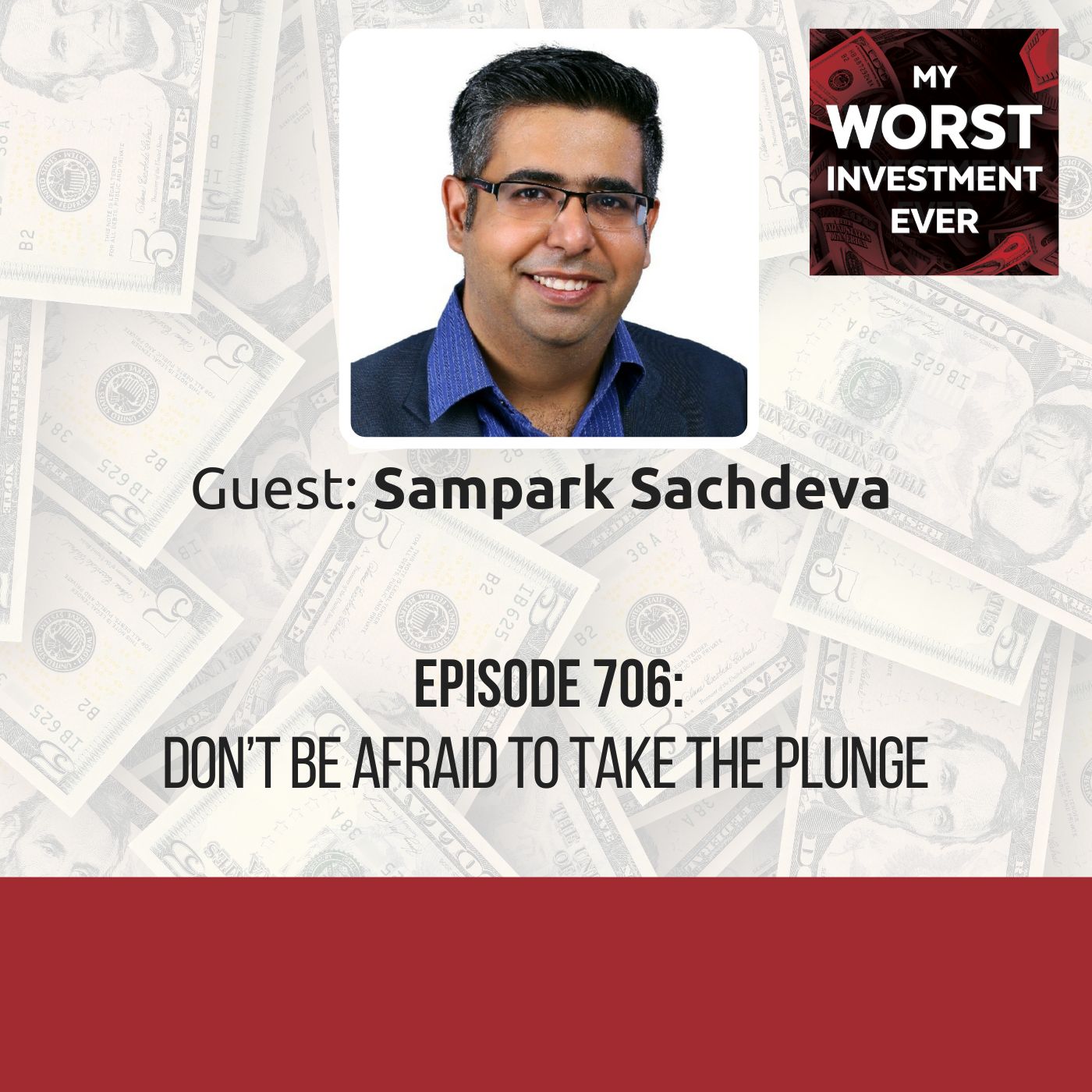
Sampark Sachdeva – Don’t Be Afraid to Take the Plunge
BIO: Sampark Sachdeva has 12 years of corporate experience across Asian Paints and other businesses.STORY: Sampark let the security of his corporate job distract him from building a business out of his love for training. It wasn’t until COVID struck and he found himself without a job that he decided to work on the plan. The business turned out to be a huge success.LEARNING: Nothing good comes easy. Don’t let job security restrict you from pursuing your entrepreneurial dreams. “No matter how bad your situation might be, the victim card can only be played once. You can’t keep playing that card again and again.”Sampark Sachdeva Guest profileSampark Sachdeva has 12 years of corporate experience across Asian Paints and other businesses. He was awarded the best digital coach of 2021 at the India coaching awards. He was a TEDx speaker in 2020 and won the LinkedIn Spotlight Award in 2019, recognizing him as one of India’s top content creators. Paul Ryder and Oracle also awarded Sampark as a top marketing and sales professional in 2019.Sampark has trained over 20,000 people across 125 sessions across 10 countries. He has over 125,000 followers across social media channels.Worst investment everSampark had an excellent corporate career. He was with Asian Paints, India’s largest paints company, for over five years. In 2015 he moved to Ola, the Indian Uber, and was there for three years. Then he moved to Oyo, the country’s largest hospitality brand, for another two years. Sampark won the Top 100 Marketing and Sales Professionals Award during this career journey. So yes, everything was going well on the corporate side.On the passion side, Sampark had been writing on LinkedIn for close to six years. He’d posted over 2000 posts in 2019 and won the LinkedIn Spotlight Award. Everything seemed rosy, and Sampark felt this was the time to take off.In 2020, Sampark moved into a new role in the same organization. But that’s when COVID struck. He was in the hospitality industry, leading corporate events. He had just been in that role for a few months when the lockdown occurred. In one day, everything stopped.Sampark sat down with his family, and they looked at their savings. They could survive for a couple of years with what they had. Sampark decided to explore a plan he had put on the back burner. Sampark loved training, and after getting the content creator award, he consulted his mentors on how to make something out of his love for training.They all advised him to work on the plan for the next three to four years and then look at how to do it long-term. But when the lockdown started, the three-year plan became an overnight plan. Sampark decided to give himself four months to execute the plan. If it didn’t work, he still had a corporate career to return to after the lockdown.At the end of four months, Sampark did a review and realized the training business was going better than he expected. He gave himself another four months, and it was still going well. He continued doing it until April 2022, when an old boss offered him a job. Sampark turned down the job because his business was doing well. He had trained close to 80,000 people and had a lot of clients in the pipeline. Sampark’s only regret is having waited for so long to start his passion venture.Lessons learnedAs a corporate professional, you’re restricted by your own thoughts and the false sense of security.Running a business is a hustle because now you have to do everything alone.Networking is crucial. But remember, it’s not about transactional relationships;
29:5202/07/2023

ISMS 26: Larry Swedroe – Are You Subject to the Endowment Effect or the Hot Streak Fallacy?
In this episode of Investment Strategy Made Simple (ISMS), Andrew and Larry discuss two chapters of Larry’s book Investment Mistakes Even Smart Investors Make and How to Avoid Them. In this seventh episode, they talk about mistake number 11: Do you let the price paid affect your decision to continue to hold an asset? And mistake number 12: Are you subject to the fallacy of the hot streak?LEARNING: Look at everything you own from an economic perspective and decide whether to keep holding or selling. Avoid FOMO (fear of missing out) and stock picking; build a diversified portfolio. “One of the biggest values of a good advisor is to educate people on rational economic decision-making so they can make informed investment decisions.”Larry Swedroe In today’s episode, Andrew continues his discussion with Larry Swedroe, head of financial and economic research at Buckingham Wealth Partners. You can learn more about Larry’s Worst Investment Ever story on Ep645: Beware of Idiosyncratic Risks.Larry deeply understands the world of academic research and investing, especially risk. Today Andrew and Larry discuss a chapter of Larry’s book Investment Mistakes Even Smart Investors Make and How to Avoid Them. In this sixth episode, they talk about mistake number 9: Do you avoid admitting your investment mistakes? And mistake number 10: Do you pay attention to the experts?Missed out on previous mistakes? Check them out:ISMS 8: Larry Swedroe – Are You Overconfident in Your Skills?ISMS 17: Larry Swedroe – Do You Project Recent Trends Indefinitely Into the Future?ISMS 20: Larry Swedroe – Do You Extrapolate From Small Samples and Trust Your Intuition?ISMS 23: Larry Swedroe – Do You Allow Yourself to Be Influenced by Your Ego and Herd Mentality?ISMS 24: Larry Swedroe – Confusing Skill and Luck Can Stop You From Investing WiselyISMS 25: Larry Swedroe – Admit Your Mistakes and Don’t Listen to Fake ExpertsMistake number 11: Do you let the price paid affect your decision to continue to hold an asset?According to Larry, people value things more when they own them. This is due to the endowment effect, which causes people to put extra value emotionally and make decisions based on this. This type of decision-making is utterly irrational from an economic perspective.The endowment effect is a big mistake that investors make, especially when they get gifted...
36:0429/06/2023

Vishal Bhardwaj – Do Not Let Emotions Run Your Business for You
BIO: Vishal Bhardwaj is a serial entrepreneur and founder of Predictions For Success, Engineer By Mistake, and Passionate Management Services.STORY: Vishal gained immediate success when he started his company and had about 100,000 followers. He thought this indicated that people loved what he was doing, so he decided to sell a corporate gift for Diwali 15 days before the festival. He didn’t do any market research, so when he went to sell the product, no one would buy it as they had ordered their gifts months in advance.LEARNING: Do proper research before you jump into anything. Don’t let emotions run your business for you. Timing is as important as pricing. “You may have a lot of good audiences, but those may not be the people who will purchase the products you introduce.”Vishal Bhardwaj Guest profileVishal Bhardwaj is a serial entrepreneur and founder of Predictions For Success, Engineer By Mistake, and Passionate Management Services. He loves to inspire students and aspiring entrepreneurs and has been at TED Talks, TCS, Money Control, Bakstage, and others.For any personal guidance on career and relationships, Vishal is reachable on WhatsApp.Worst investment everVishal started Predictions for Success in 2014 and got around 100,000 followers. This immediate success motivated him to leverage everything, and he thought that whatever he touched would turn into gold because people loved what he was doing. Vishal and his team thought selling something would be a good idea.Diwali was just 15 days away, and Vishal suggested to his partner that they sell corporate gifts for the famous Indian festival. They started shopping for things even though they had no idea what the people would want. They thought having something in the range of $10 would be easy to crack. While at the market, Vishal suggested that rather than purchasing everything at a wholesale rate, they should buy something a little pricey but as a sample. So, if it didn’t get sold, they would only have a little inventory sitting idle. His partner was against the suggestion. He thought they should buy cheap and in bulk. Vishal insisted that they forget about profits and try to learn something.They invested 100,000 rupees (about US$1,200) and purchased products in bulk. They did a professional photoshoot, and everything was exciting until it came time to sell the products. They talked to the companies to see if they were interested in purchasing the products, but the prices they quoted were less than even what the company had bought the products for. They couldn’t sell even a single product and had to give them out as gifts to their customers for the next three years. Vishal still has a couple of them lying around in his backyard.Lessons learnedDo proper research before you jump into anything.Emotions can overwhelm you, but do not let them run your business for you.Having an audience and having a customer who will purchase are two very different stages.The timing of your launch is as important as the pricing of your product.Andrew’s takeawaysYour audience isn’t necessarily there to buy. It could be there for the experience.Start slow, think carefully, test the market, and test the response before you act.Actionable adviceWhen you hear any idea, even a unicorn idea, wait seven days before acting on it. If you...
24:3328/06/2023

Harjeet Khanduja – Work Smarter Not Harder
BIO: Harjeet Khanduja is an international speaker, author, poet, visionary, inventor, influencer, and HR Leader. He is an alumnus of IIT Roorkee and INSEAD. He is currently working with Reliance Jio. STORY: Harjeet regrets wasting so much of his life working hard instead of working smart. Though he succeeded in his career, he completely ignored his family and led an unbalanced life. LEARNING: Learn how to delegate so you can have time to focus on other things in your life. You must care for your family and inner self to be more productive. “When you harness everyone’s energy, then you can work in a broader environment and grow. When you’re happy, you can do more things in life, not just for your business.” Harjeet Khanduja Guest profile Harjeet Khanduja is an international speaker, author, poet, visionary, inventor, influencer, and HR Leader. He is an alumnus of IIT Roorkee and INSEAD. He is currently working with Reliance Jio. He is an SAP HCM consultant, Six Sigma Green Belt, and Assessor for Predictive Index. He has 3 published patents, and his book “Nothing About Business” has been a best-seller on Amazon. Harjeet has been conferred with the HR Leadership Award, Pride of Nation Award, HR Personality of the Year, Global Digital Ambassador, Global Learning Award, ET HR Influencer of 2022, and Top 200 Global Leadership Voices of 2022. Harjeet has been a LinkedIn Power Profile, TEDx speaker, Guest Faculty at IIM Ahmedabad, Board Member of the Federation of World Academics, Member of the CII HR IR committee, and Co-chair of Nasscom Diversity Committee. Worst investment ever The first investment mistake Harjeet ever made was opening a PPF account because his father asked him to. Harjeet kept investing in that account year after year without knowing why he was investing. He regrets never having control over that decision. Harjeet also regrets wasting so much of his life working hard instead of working smart. In every company Harjeet worked for, he’d work himself to the bone trying to prove his abilities. Even though he achieved massive success in every position he took up, his life outside work suffered. Harjeet barely had any time to spend with his family. After all the time and effort he put into his work, Harjeet soon realized his life was not balanced. In 2012, Harjeet started looking at life holistically rather than unidimensional. Now his life is better, and his wife is happier. Lessons learned Your team can solve problems on their own. You don’t need to hold their hands constantly; delegate and only assist where necessary. You must care for your family and inner self to be more productive. Andrew’s takeaways Life is a balance of opposing forces, and we’re constantly making trade-offs. Actionable advice Learn to delegate and trust. It will take time for others to catch up to your quality or delivery standards. But if you don’t start delegating, you’ll never have time to focus on other important parts of your life. Parting words “It’s okay to fail. Just believe in yourself. Whatever you’ve got, nobody can take it from you.” Harjeet Khanduja <h3...
29:5527/06/2023

Laurens Swinkels – Stay Liquid Even When Investing Long-Term
BIO: Laurens Swinkels is an Associate Professor of Finance at Erasmus University in Rotterdam and Executive Director and Head of Quant Strategy at Robeco’s Sustainable Multi-Asset Strategies team.STORY: Lauren bought a house in Rotterdam. Just five years later, he had to move to Norway. Laurens managed to sell the house in the Netherlands many years later at a loss.LEARNING: Liquidity is very important even when investing long-term. Remove emotions from your decision-making. “Even though you’re a long-term investor and you think you’re really long-term, there may be things that cross your path that require liquidity.”Laurens Swinkels Guest profileLaurens Swinkels is an Associate Professor of Finance at Erasmus University in Rotterdam and Executive Director and Head of Quant Strategy at Robeco’s Sustainable Multi-Asset Strategies team. His areas of expertise include allocation research and empirical asset pricing. He teaches Finance courses and has published his academic work in peer-reviewed journals such as the Journal of Financial Economics. Laurens holds a Ph.D. in Finance and a Master’s in Econometrics from Tilburg University in the Netherlands.Worst investment everWhen Laurens started his masters in Tilburg, Netherlands, he decided to move out of his parent’s home. He was torn between buying an apartment and renting one because the real estate prices were quite favorable for buyers then. He decided to rent since he would only be in school for a few years.After completing his master’s, Laurens decided to do a Ph.D. and stayed another five years in Tilburg. He was still renting his apartment. After graduating, Laurens moved to Amsterdam, where the house prices were unimaginably high. Hoping that the prices would go down, he rented an apartment. But the prices just kept going up. Laurens had to commute daily from Amsterdam to Rotterdam. After getting tired of the commute, Laurens decided to buy a house in Rotterdam, where the prices were lower than in Amsterdam.Laurens didn’t foresee that he would have to move to Norway five years after that decision. At this point, the house he’d bought was 25% underwater. The investment in this house made a large part of his wealth, so taking a 25% loss was tough for Laurens. He managed to sell the house only two years ago.Lessons learnedThe liquidity that allows you to sell and buy a house in another location whenever you want is very valuable.Even when you’re investing long-term, liquidity is still essential.Remove emotions from your decision-making.Andrew’s takeawaysBuying a house is a trap because you may lack liquidity.Home buying comes with the risk of not realizing the final capital gain that you thought you would.Actionable adviceIf you’re not yet ready to buy a home or don’t know where to buy, you can first get exposure to real estate through listed markets.Lauren’s recommendationsLaurens recommends his data page on the university website, where you can download datasets if you want to do number crunching when investing. You can also check out Google Scholar or SSRN, where people post their latest thoughts. You can set alerts and get notified when papers on topics you’re interested in are published. If you don’t have the time for that, there are several people, like <a...
37:5325/06/2023

Spencer Jakab – Don’t Take Investment Tips from People
BIO: Spencer Jakab is the global editor of the Wall Street Journal’s financial and economic analysis column, Heard on the Street. Prior to becoming a financial journalist 20 years ago, he was a top-rated emerging market stock analyst.STORY: Spencer took investment advice without doing due diligence and ended up losing his entire investment.LEARNING: Don’t take investment tips from people; do your due diligence. Diversify your portfolio. Don’t invest more than you can lose. “Don’t take investment tips from people because those who tell don’t know, and those who know, don’t tell.”Spencer Jakab Guest profileSpencer Jakab is the global editor of the Wall Street Journal’s financial and economic analysis column, Heard on the Street. Prior to becoming a financial journalist 20 years ago, he was a top-rated emerging market stock analyst. He has written two books, the most recent being “The Revolution That Wasn’t,” about novice investors caught up in GameStop mania.Worst investment everSpencer moved to Hungary in the early 90s because he was very excited about all the changes due to the fall of the Berlin Wall and the opening up of the Eastern European region. Spencer wanted to make money and also see history being made.After writing to many investment banks looking, he got a couple of interviews with local accountants and banks. Spencer accepted a job as a country analyst in Hungary. He had no idea what he was doing.The job was to meet fund managers who were wealthy, nicely dressed, and suave, talking about all these things they had done and how much money they’d made from various investments. He thought they were so clever and believed that if he followed their lead, he’d be rich too. At the time, Spencer had saved $5,000. He invested half the money in a Southeast Asia fund and the other half in a US bond fund. The market became bearish, and Spencer lost most of his investment.Later, Spencer met a suave, sophisticated fund manager who convinced him to invest in a Canadian company. The company made permanent magnets. The company had a PE ratio of about nine, which is very low. Spencer looked the company up and read the annual report. He still couldn’t figure out what a permanent magnet was, but it sounded impressive and very high-tech. The company also had all these PhDs working for them. So Spencer decided to invest in it. He also told his good friend about it, who also invested.Some time went by, and one day as Spencer read the newspaper, he came across a story of how the FBI had raided the offices of the magnet company. The company was run by Russian mobsters and was just a front. Obviously, the stock went to zero after the expose. Spencer and his friend lost all their investment.Lessons learnedDon’t take investment tips from people; do your due diligence.Do your own research.Diversify your portfolio.Only invest what you can lose.If you want to be a stock picker, do it with a small amount of your money.Invest in diversified, low-cost funds, hold for the long term, and don’t try to time the market. You’ll do better than 85% of fund managers over any 10-year period.Andrew’s takeawaysOnly buy a stock recommended by a person after researching it.Focus on taking care of yourself, but be very careful about starting to promote something to other people because...
45:5921/06/2023

Charles Rotblut – Realize When You’re Lucky and Walk Away
BIO: Charles Rotblut, CFA, is a vice president and financial analyst at the American Association of Individual Investors (AAII).STORY: Charles bought a Dotcom stock in 1998. A week later, the stock had tripled. His dad advised him to take the profits, but he insisted the stock would keep going up. Three days later, the stock lost almost all its value. Charles sold the stock and made very little profit.LEARNING: Don’t confuse luck with skill. Utilize a rolling stop loss to manage risk. Always have a diversified portfolio. “The market has an uncanny ability to make you look silly. It doesn’t matter how smart you are, how skilled you are, the market can and will make you look stupid, and not just on one occasion, but on several occasions.”Charles Rotblut Guest profileCharles Rotblut, CFA, is a vice president and financial analyst at the American Association of Individual Investors (AAII). He is the editor of the AAII Journal, created both the PRISM Wealth-Building Process and VMQ Stocks, and authors the weekly AAII Investor Update email. His book, “Better Good than Lucky: How Savvy Investors Create Fortune With the Risk-Reward Ratio,” was published in November 2010. Charles holds the Chartered Financial Analyst (CFA) designation and has analyzed both publicly traded and privately held companies.Worst investment everCharles bought a Dotcom stock in 1998, right before Thanksgiving. The stock took off, and he made triple-digit gains. On Thanksgiving day, Charles told his dad about the stock, and he advised him to take the profits. Charles insisted that the stock could run even higher. The following Monday, he got to work, logged into his computer just as the market opened, and saw that the stock had increased. On checking on the stock again a few hours later, it had lost almost all its value. All the profits had pretty much vanished.Charles got out of the stock and made just a slight gain, but nothing near what he could have made had he listened to his dad.Lessons learnedIt’s easy to confuse skill with luck, so be conscious of when luck happens.If you don’t want to sell your stock, take some of your profits and hold a little.Put the gains you take in an index fund.Andrew’s takeawaysWhenever you get to a point where a stock has gone up or down so much that you’re starting to question your situation, sell 50% of your position.Utilize a rolling stop loss to manage risk.Always have a diversified portfolio.Charles’s recommendationsCharles recommends using a stock screen to find stocks with all the traits you seek that nobody else is discussing.No.1 goal for the next 12 monthsCharles’s number one goal for the next 12 months is to save more than last year. He also wants to get onto the TED Talk stage.Parting words “Just be disciplined. Think about simple strategies. If all you do is write down very simple buy and sell rules and follow those routinely, you’ll have returns that are far in excess of the average investor.”Charles...
33:2920/06/2023
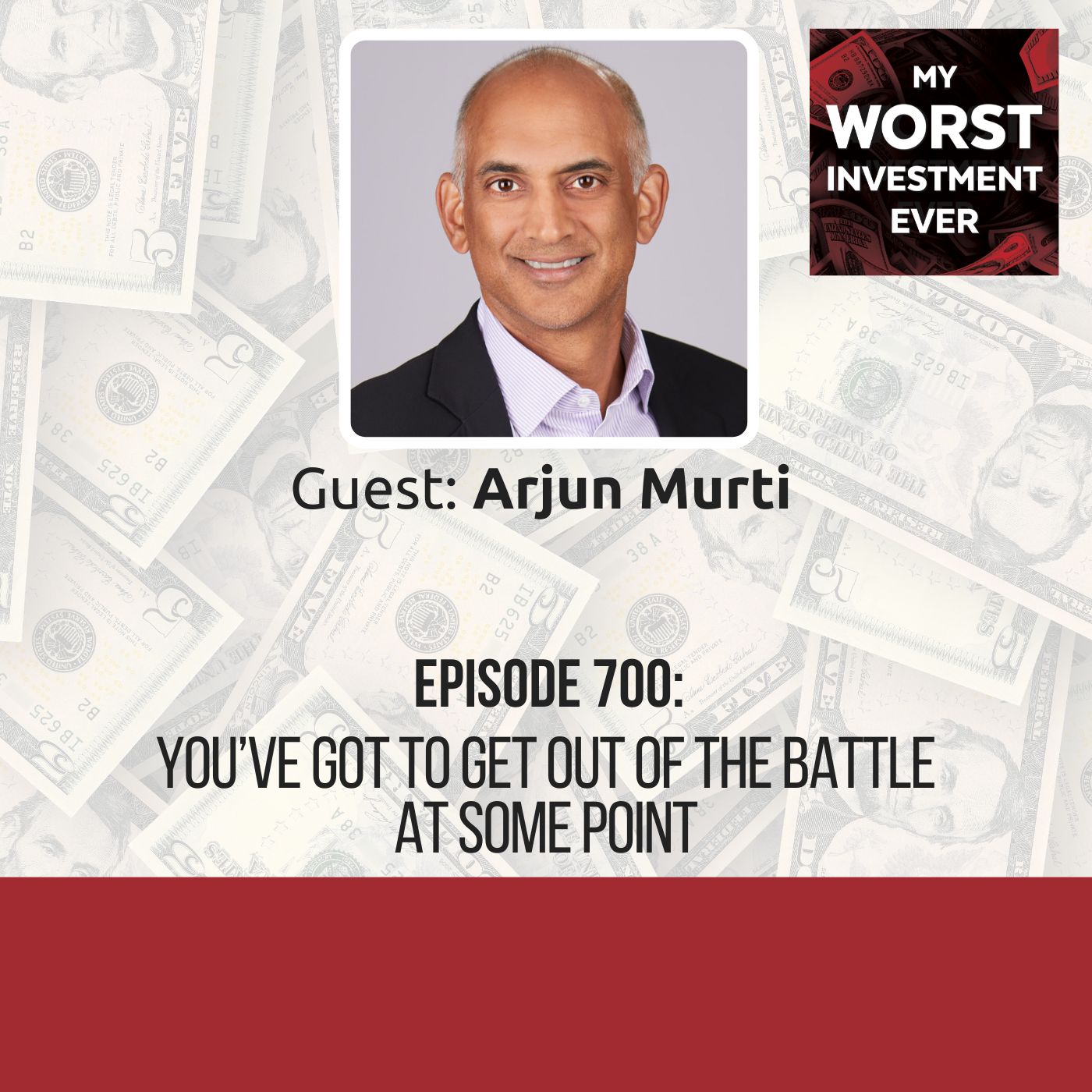
Arjun Murti – You’ve Got to Get Out of the Battle At Some Point
BIO: Arjun Murti has over 30 years of experience as an equity research analyst, senior advisor, and board member, with global expertise covering traditional oil & gas and new energy technologies.STORY: Arjun made a call that oil prices would quintuple from $20 a barrel in the 90s to $105 in the 2000s and stay there for at least five years. The price averaged $100 a barrel from 2000 to 2014, entirely consistent with Arjun’s call. However, after the 2008 financial crisis, the return on capital in the energy sector started falling. Arjun made excuses and continued to ride the wave all the way down.LEARNING: Let go of your ego and get out of the battle at some point. Frameworks need to grow, evolve and adjust to circumstances. Understand and inculcate reversion to the mean into your thinking. “At some point, you got to get out of your own ego and get out of the battle.”Arjun Murti Guest profileArjun Murti has over 30 years of experience as an equity research analyst, senior advisor, and board member, with global experience covering traditional oil & gas and new energy technologies.The bulk of his Wall Street career was at Goldman Sachs, where he retired as a partner in 2014. He recently “un-retired” to join Veriten, an energy research, strategy, and investing firm. Arjun publishes Super-Spiked, a Substack blog focused on the messy energy transition era.He is on the board of ConocoPhillips, a senior advisor at Warburg Pincus, and on the advisory boards for ClearPath and the Center on Global Energy Policy.Worst investment everAt the height of his career, Arjun made a call that oil was going to go from the $15 to $20 a barrel range it had been in from the mid-80s. He said the price would rise to between $50 to $105 in the 2000s and stay there for at least five years. And with that, the returns on capital and profitability in energy as a sector would do very well. Arjun called this the super spike.In 2002, the market started becoming bullish, and oil went from the 20-dollar range everyone thought the sector would be at forever to ultimately as high as $147 in 2008. The price averaged $100 a barrel from 2000 to 2014, entirely consistent with the high end of the range of Arjun’s original call. He was pretty excited about the sector’s profitability and experienced an ego boost after being proven right for five years.However, the returns on capital started rolling over, and Arjun made excuses for it. From 2006 to 2008, oil went from $65 to $100 a barrel, but returns on capital for the sector fell from 22% to 19%. 19% is still an excellent number, and that’s the excuse Arjun used to continue riding the call. The sector then got interrupted by the great financial crisis of 2008, which Arjun never viewed as an energy event. The industry rebounded dramatically off those 2008 and 2009 lows, but the returns on capital had now fallen to 16%. Arjun kept making excuses as the returns continued to fall and never got off. Making excuses for his framework the entire way down became his worst investment mistake ever.Lessons learnedAt some point, you’ve to get let go of your ego and get out of the battle.Frameworks need to grow, evolve and adjust to circumstances.Andrew’s takeawaysUnderstand and inculcate reversion to the mean into your thinking.Understand what the average is. Ride the wave but remember the...
40:2518/06/2023
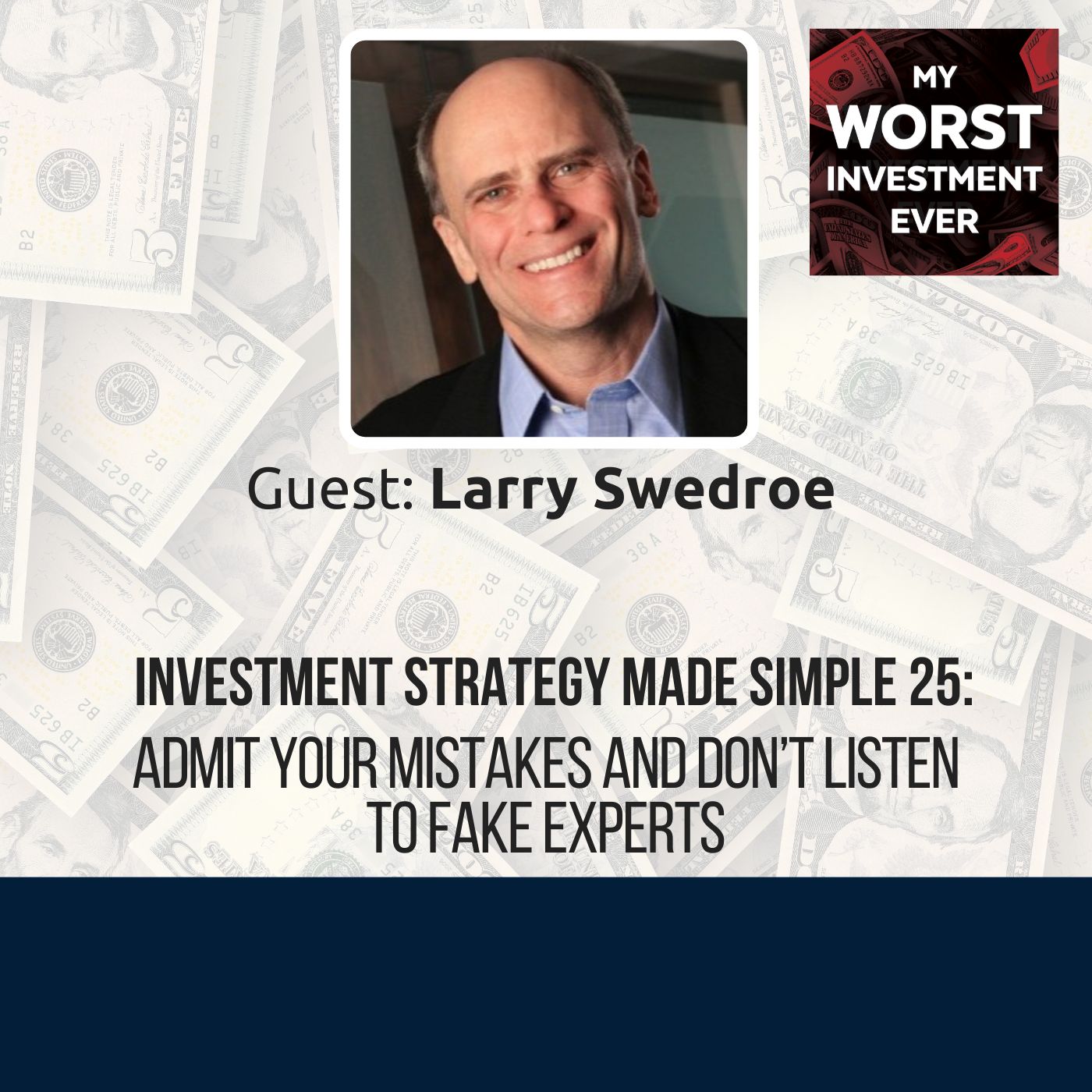
ISMS 25: Larry Swedroe – Admit Your Mistakes and Don’t Listen to Fake Experts
In this episode of Investment Strategy Made Simple (ISMS), Andrew and Larry discuss two chapters of Larry’s book Investment Mistakes Even Smart Investors Make and How to Avoid Them. In this sixth episode, they talk about mistake number 9: Do you avoid admitting your investment mistakes? And mistake number 10: Do you pay attention to the experts?LEARNING: You’ll only learn from mistakes if you admit that you made them. Just because someone is famous and confident in what they’re saying doesn’t mean they’re experts who know what they’re saying. “If you could admit a mistake when it’s the size of an acorn, it’s easier to repair than when it’s the size of a tree with deep, wide-ranging roots.”Larry Swedroe In today’s episode, Andrew continues his discussion with Larry Swedroe, head of financial and economic research at Buckingham Wealth Partners. You can learn more about Larry’s Worst Investment Ever story on Ep645: Beware of Idiosyncratic Risks.Larry deeply understands the world of academic research and investing, especially risk. Today Andrew and Larry discuss a chapter of Larry’s book Investment Mistakes Even Smart Investors Make and How to Avoid Them. In this sixth episode, they talk about mistake number 9: Do you avoid admitting your investment mistakes? And mistake number 10: Do you pay attention to the experts?Missed out on previous mistakes? Check them out:ISMS 8: Larry Swedroe – Are You Overconfident in Your Skills?ISMS 17: Larry Swedroe – Do You Project Recent Trends Indefinitely Into the Future?ISMS 20: Larry Swedroe – Do You Extrapolate From Small Samples and Trust Your Intuition?ISMS 23: Larry Swedroe – Do You Allow Yourself to Be Influenced by Your Ego and Herd Mentality?ISMS 24: Larry Swedroe – Confusing Skill and Luck Can Stop You From Investing WiselyMistake number 9: Do you avoid admitting your investment mistakes?As human beings, we’re hardwired to avoid admitting mistakes. And, of course, you can’t correct a mistake unless you acknowledge that your behavior was a mistake in the first place. A typical investment mistake most people make is engaging in actively managed funds and stock picking, even though there’s hard evidence that a vast majority of active managers fail persistently to outperform over the long term.According to Larry, when you’ve made an investment mistake and have a poorly performing asset, the right thing to do is count your losses and substitute the asset with a superior choice. However, many people don’t want to sell because they’ll hurt their ego. Selling means...
26:0415/06/2023

Steven Wilkinson – Your Success Is 100% Dependent on You
BIO: Sir Steven Wilkinson is the founder and CEO of Good & Prosper and has been involved in business finance and investment for the best part of 30 years, having started working for Merrill Lynch Investment Bank in Munich, Germany, in 1987 at the age of 24.STORY: Steven entered a successful partnership that saw them take a stock from 50 cents to 400 euros. They made so much money from their business, but the problem was Steve wasn’t ready for that kind of success. He had no system for dealing with the wealth he created and eventually lost all his money.LEARNING: Being successful is 100% dependent on you. Working on yourself is the key to having whatever it is that you want to have. “You’ve got to be the owner in order to do the things that owners do and thereby to have the things that owners have.”Steven Wilkinson Guest profileSir Steven Wilkinson is the founder and CEO of Good & Prosper and has been involved in business finance and investment for the best part of 30 years, having started working for Merrill Lynch Investment Bank in Munich, Germany, in 1987 at the tender age of 24.Good & Prosper is an advisory and investment company through which Steven acts as a thinking partner for business leaders and owners, supporting them as a generalist business expert across the fields of finance, leadership, and culture.Good & Prosper is also a knowledge platform teaching finance to entrepreneurs with a focus on Small & Medium sized businesses, primarily in the English-speaking world.Steven founded the publishing business Pitchfork Press and publishes a weekly essay, “Pitchfork Papers,” via Substack to a rapidly growing and diverse international audience.Worst investment everSteven started his investment business in 1998 and had an excellent first couple of years. This was because, as a value investor, he had no interest in any of the new economy stocks. Steven stuck with stocks in the public markets, mainly because that’s all he could afford. Steven had a couple of stocks that were mind-bogglingly great investments. And so his business did quite well, and capital increased substantially over the following years.Steven met an American gentleman who invited him to be on the board of a company he was considering setting up. The gentleman was working for one of the more famous German companies. This publishing company profited enormously from the new economy boom. He’d been in charge of managing what was a promiscuously bought portfolio of new economy businesses.The gentleman invited a senior law firm partner and a guy with deep restructuring experience to join his board. The gentleman set up the initial board meeting to get to know each other. The meeting was at the lawyer’s office. The gentleman never showed up, and the lawyer had to return to work. So Steven and the restructuring guy chatted and were fascinated by each other’s stories. They decided to stay in touch.The restructuring guy had made much money with his previous partnership and wanted to see what he could do on a bigger stage. That’s how Steven got into a partnership with him. The guy was impressed by Steven’s capital markets intelligence and excellent networks. And Steve saw the guy as an absolutely focused money maker and restructuring genius, which he undoubtedly was.The two new partners came up with the idea of buying a shell company, an empty...
01:08:0314/06/2023

Shawn O'Malley – Geopolitics Can Take Your Investment to Zero
BIO: Shawn O’Malley is the chief editor and writer of the We Study Markets newsletter from The Investor’s Podcast Network, the world’s largest stock-investing podcast with over 110 million downloads.STORY: Shawn wanted to hedge inflation during the COVID pandemic, so he invested in the Russian ETF at the end of 2021. The ETF performed well, and Shawn was happy. Then rumors of Russia invading Ukraine started. The invasion happened in February, and the Russian ETF stopped trading, taking Shawn’s investment to zero.LEARNING: Understand how geopolitical events and domestic politics affect investments. You won’t be compensated for lack of knowledge. “Investing is all about continuous learning and getting comfortable with the risks that we take.”Shawn O’Malley Guest profileShawn O’Malley is the chief editor and writer of the We Study Markets newsletter from The Investor’s Podcast Network, which is the world’s largest stock-investing podcast with over 110 million downloads.He writes for an audience of over 30,000 readers daily, breaking down the most important stories in financial markets with longer write-ups exploring financial history, the economics behind everyday life, and insights from legendary investors.Shawn hopes to help keep people informed about current news while adding the perspective of a long-term investor.Worst investment everIn April 2020, Shawn was sent home from school because of the COVID lockdowns. He was a junior in college at the time. He spent a few weeks doing nothing productive but soon realized this would be an extended lockdown. Shawn decided to find valuable ways to manage his time. He started taking long walks while listening to the We Study Billionaires podcast, which interested him in value investing.At the time, oil prices were negative. Shawn didn’t understand the futures market or know anything about oil. Still, it felt like an opportunity since he believed oil prices wouldn’t stay negative forever. Shawn bought into some oil and gas stocks and held them.Over the next year or so, Shawn developed this sort of outlook that some of the inflationary pressures of the lockdown would eventually manifest. So he started thinking more about how to hedge inflation to have exposure to energy prices. Shawn naively started looking for the most undervalued energy stocks in Russia. At the end of 2021, he bought into the Russia ETF as a creative and cheap way to play this inflation and energy price spike he was trying to foresee.Shawn held that investment for a year, and things were looking good. The inflation manifested, and the energy stocks started to rally. At this point, Shawn thought he was pretty clever. In January 2022, all these rumors about Russian troops gathering around Ukraine for an invasion started. Shawn believed it was just a conspiracy theory. He played down the risk and held down his investment. The attack happened in February, and the Russian ETF stopped trading, taking Shawn’s investment to zero.Lessons learnedUnderstand how geopolitical events and domestic politics affect investments.Andrew’s takeawaysIt takes time to become aware that risks are everywhere, and your first job is to understand them.You won’t be compensated for lack of...
33:2113/06/2023

Peter Saddington – I Got Fired From My Own Company
BIO: Peter Saddington is a software developer, a multi-founder, an author, and a VC. He founded a $2.5M BTC mining fund, a $10M IoT fund, and a$50M Web3 fund in 2022.STORY: Peter hired an engineer who had impeccable technical skills. Peter was so impressed by the guy that he decided to make him the CEO of his startup. Six months later, the guy fired Peter from his own company.LEARNING: It takes more than technical skills to be a leader. A leader needs to be a person that can be led and can lead others. “The number one most important skill, I believe, in any type of investment, is are you willing to ask every single question possible?”Peter Saddington Guest profilePeter Saddington is a software developer, a multi-founder, an author, and a VC. He founded a $2.5M BTC mining fund, a $10M IoT fund, and a$50M Web3 fund in 2022. He published three books - Scrum, Agile, and PersonalBranding. He writes “The Agile VC” newsletter, which covers Inside Startups, Venture Capital, and life!Worst investment everOver a decade ago, Peter built a great startup and bootstrapped it out of his garage. This was a passion project of his. At the time, the digital currencies were growing. Interestingly, there were all these silos of exchanges and no ability to create arbitrage opportunities between multiple exchanges. As an engineer, Peter thought this was an absolutely fantastic proposition of becoming a middleware solution provider so that traders and investors could trade across platforms and multiple exchanges and find opportunities for liquidity.Peter started building it. He put together a team and bootstrapped it with his own money. Eventually, over many validations, his community and user groups said this was amazing and should be scaled. Peter raised $4.8 million for this venture. Everything was great, and it seemed like there was no possibility that this thing could ever go off the rails. His global community of cryptocurrency and digital currency enthusiasts grew and had almost 78% daily active users.Peter had hired an engineer in whom he saw an amazing ability to take the company to great heights. Peter was so enamored by this engineer’s communication ability that he decided to mentor him. Peter was really impressed by his technical prowess. In his naivety, he believed this was the primary value that the engineer could bring to his company. Peter elevated the engineer to CEO. Big mistake! Six months later, the engineer fired Peter from his passion project.Lessons learnedWhen promoting an employee, you must understand the individual deeper than just what they bring to the table.When choosing a leader, they need to be a person that can be led and can lead others.Spend enough time with people before you promote them to truly understand their depth, morality, ethics, and, most importantly, integrity.Andrew’s takeawaysWhen hiring a prospective leader, analyze everything that person can bring to the table, not just the skills.Leaders need to be multifaceted and able to rise when things are tough.The key to asking questions is listening; the key to listening is taking notes.Actionable adviceAsk more questions. Reach for questions that avail emergent opportunities in emergent contexts and conversation. Be situationally aware enough to listen actively and ask pertinent and essential questions that give you context for informed decision-making.No.1 goal for the next 12 monthsPeter’s goal for the next 12 months is to launch a startup that intertwines his...
39:4511/06/2023

Neville Medhora – Hot Stock Tips Are Generally Unreliable
BIO: Neville Medhora has been starting businesses and side projects since high school and has learned a bunch about what works and what doesn’t work. He is an advisor to numerous software companies and teaches copywriting at his business, CopywritingCourse.com.STORY: Neville started day trading in college and would try to get inside scoops to find cheap stocks that would explode. None of the scoops he ever got worked. Neville only made 5% return on his investment after a year of trading.LEARNING: 99% of the inside scoop is unreliable secondhand information. Do your due diligence. It’s important to know when to sell. “I realized that hot stock tips are terrible; none of them ever panned out. It’s when I did my due diligence that my investment worked out really well.”Neville Medhora Guest profileNeville Medhora has been starting businesses and side projects since high school and has learned a bunch about what works and what DOESN’T work. He is an advisor to numerous software companies and teaches copywriting at his business, CopywritingCourse.com.You can find him at “Neville Medhora” across all socials.Worst investment everNeville was fortunate to have a little extra cash in college because he had started several businesses before. He started day trading stocks, and his plan was to pick a stock when it was cheap and then sell it when the price went up.Neville would try all sorts of things to find cheap stocks about to go up. He’d wake up in the morning to catch the bell ringing and start talking to people about stocks just to get the inside scoop, but none of his tactics worked.After a year of all the stress of trying to beat the market, Neville made just 5% gains on his investments.Lessons learnedIt’s important to know when to sell.The market is crazy and erratic and doesn’t obey timelines.Buying a good business is better than trying to beat the stock market.Andrew’s takeaways99% of the inside scoop is unreliable secondhand information.Always do your due diligence before you invest.Actionable adviceDon’t get caught up in buying something because it’s cheap. Instead, read the company statements and learn how to analyze a company.Neville’s recommendationsNeville recommends following him on social media, where you’ll find much of the stuff he teaches. He also recommends joining his newsletter to get helpful marketing tips every Friday.No.1 goal for the next 12 monthsNeville’s goal for the next 12 months is to make sure that he is set up well to retire at 50.Parting words “Be well and prosper. Don’t make stupid mistakes, but when you do, learn from them.”Neville Medhora [spp-transcript] Connect with Neville MedhoraLinkedInTwitterFacebook<a href="https://www.youtube.com/kopywriting" rel="noopener noreferrer"...
34:2307/06/2023

Jack Farley – Don’t Play in Markets You Don’t Know
BIO: Jack Farley is the host of the Forward Guidance podcast. He is interested in all things liquidity, macro, and central banking.STORY: Jack bought a lot of put options on the markets and individual stocks, notably Tesla, in February 2020 when the market was bearish. When the market crashed in March 2020, Jack made so much money. But, soon, the market started going up, and his position dropped to zero.LEARNING: Don’t view the market as a place to create wealth; view it as a place to grow it. Don’t confuse being lucky with being an intelligent investor. “When you get a windfall, realize those gains, and at the very least, trim the position down.”Jack Farley Guest profileJack Farley is the host of the Forward Guidance podcast. He is interested in all things liquidity, macro, and central banking. Jack graduated from Brown University with a degree in Economics and has done nearly 500 long-form interviews on investing and macroeconomics.Worst investment everJack had gotten quite bearish on the market in January and February 2020. So he bought a lot of put options on the markets and individual stocks, notably Tesla. All individual stocks crashed throughout early March 2020. Jack made so much more money than he ever thought was possible.He continued consuming this bearish macro content from CNBC, Bloomberg, and the Wall Street Journal. When the stock market rallied from March 23 to April 1, Jack was told it was just a bear market rally and believed it. But the market continued to grind higher, and Jack’s position kept falling until it reached zero.Lessons learnedKnow the difference between winning because you were smart and made the right decision and when you were lucky.It’s really tough to beat the market.The ultimate hack is to beat the stock market and then invest in the S&P 500 for the rest of your life.When you get a windfall, and you’re lucky enough to win the day, don’t assume it’s because you’re so smart because, most likely, you’re not.Andrew’s takeawaysSet up your wealth creation engine. That’s either your business or your salary.Don’t view the market as a place to create wealth; view it as a place to grow it.Actionable adviceDon’t play in markets where you don’t know what you’re doing.Jack’s recommendationsJack recommends listening to his podcast for a deep-dive conversation on finance. The talks are associated with what’s going on now.No.1 goal for the next 12 monthsJack’s goal for the next 12 months is to create kickass content for his podcast and grow the show.Parting words “I feel like a winner for having been on the show.”Jack Farley [spp-transcript] Connect with Jack FarleyLinkedInTwitterYouTube<a...
34:4506/06/2023

Carter Malloy – Valuation Is Not a Reason to Invest
BIO: AcreTrader’s CEO, Carter Malloy, grew up in an Arkansas farming family and has had a lifelong passion for agriculture and investing. Before founding AcreTrader, he spent five years as part of the founding team of a successful global equity investment firm.STORY: Carter was super impressed by a healthcare software company whose stock was really expensive, and the valuation was crazy high. Carter decided to short the company’s stock. However, he lost most of his money because the stock almost doubled on him.LEARNING: Valuation is not a reason to invest. Don’t bet against really good management teams. “Valuation should inform your position size. However, look at it across a large spectrum of metrics and measurements to help you determine whether you have a thesis or not.”Carter Malloy Guest profileAcreTrader’s CEO, Carter Malloy, grew up in an Arkansas farming family and has had a lifelong passion for agriculture and investing. Before founding AcreTrader, he spent five years as part of the founding team of a successful global equity investment firm.Before joining in 2013, Carter was a Managing Director with Stephens Inc., a large private investment bank, where he was an equity research analyst.At AcreTrader, Carter has successfully raised over $60 million in Series B funding and grown from 20 employees to 120 employees across the company’s two business divisions, which include AcreTrader, the farmland investing platform, and Acres, a land research platform.Worst investment everAs an equity investor, Carter would generally chase okay businesses valued as great ones. One particular company, a healthcare software business, caught Carter’s attention. He had a thesis around the macro developments—both cyclical and secular headwinds—that this company faced. He realized there were these real pressures on that business that the rest of Wall Street and the investment world was seeing. The stock was really expensive, and the valuation was crazy high.Carter started digging into the company. He met with the company CEO, and this guy was unbelievably impressive. Carter dug deeper into the company culture and the people who worked there, concluding that this was a well-run business. Carter decided to invest in the company. However, he lost most of the principal because the stock almost halved on him.Lessons learnedValuation is an essential part of your research. It can support an investment decision but is not a reason to invest.Don’t bet against excellent management teams because they can absolutely—and often do—determine the outcome.Valuation should inform your position size.Andrew’s takeawaysValuation will be a tool if you don’t have any other fundamental things driving your investment decision.Actionable adviceDon’t invest in single securities. Instead, invest in ETFs.Carter’s recommendationsIf you want to be a good investor, understand what CFAs read and then take the Kaplan Schweser CFA Level One course.No.1 goal for the next 12 monthsCarter’s goal for the next 12 months is to spend more time with his children.Parting words “This has been fantastic. I sincerely appreciate you.”Carter...
31:4004/06/2023

ISMS 24: Larry Swedroe – Confusing Skill and Luck Can Stop You From Investing Wisely
In this episode of Investment Strategy Made Simple (ISMS), Andrew and Larry discuss two chapters of Larry’s book Investment Mistakes Even Smart Investors Make and How to Avoid Them. In this fourth episode, they talk about mistake number 7: Do you confuse skill and luck? And mistake number 8: Do you avoid passive investing because you sense a loss of control?LEARNING: When gauging a fund manager’s performance, consider risk-adjusted performance. If you’re a passive investor and use a systematic strategy, you’re 100% in control. “You have to accept that you can only control what you can control; you can’t control the unpredictable things that happen.”Larry Swedroe In today’s episode, Andrew continues his discussion with Larry Swedroe, head of financial and economic research at Buckingham Wealth Partners. You can learn more about Larry’s Worst Investment Ever story on Ep645: Beware of Idiosyncratic Risks.Larry deeply understands the world of academic research and investing, especially risk. Today Andrew and Larry discuss a chapter of Larry’s book Investment Mistakes Even Smart Investors Make and How to Avoid Them. In this fifth series, they talk about mistake number seven: Do you confuse skill and luck? And mistake number eight: Do you avoid passive investing because you sense a loss of control?Missed out on previous mistakes? Check them out:ISMS 8: Larry Swedroe – Are You Overconfident in Your Skills?ISMS 17: Larry Swedroe – Do You Project Recent Trends Indefinitely Into the Future?ISMS 20: Larry Swedroe – Do You Extrapolate From Small Samples and Trust Your Intuition?ISMS 23: Larry Swedroe – Do You Allow Yourself to Be Influenced by Your Ego and Herd Mentality?Mistake number 7: Do you confuse skill and luck?According to Larry, investors don’t know statistics well enough to differentiate skill from luck. To understand if an outperformer is outperforming because of skill and not luck, look at risk-adjusted performance. So, for example, over the very long term, value stocks have outperformed growth stocks, and small stocks have outperformed large stocks. So somebody who outperforms simply because they owned lots of small and value stocks more than the market isn’t outperforming on a properly adjusted basis. Other factors than size and value, such as momentum, profitability, or quality, can also drive the return. Larry recommends Portfolio Visualizer, a tool that shows how much exposure an active fund has to those factors. It also reveals the alpha or the remaining performance that cannot be explained.The second thing you need to consider is whether the fund’s assets are growing. If they’ve
40:5001/06/2023

Gisela Hausmann – Encourage and Appreciate Your Employees’ Creativity
BIO: Gisela Hausmann graduated with a master’s degree in film & mass media from the University of Vienna. She’s one of a dying breed of adventurers – she digs in and researches topics of interest from the ground up, then tells things as she sees them.STORY: Gisela joins the podcast again, discussing her new book Winning @ Amazon. Today she shares advice on how employees can allocate their creativity in a way that’s appreciated. She also talks about why employees need to start thinking outside the box and focus on problem-solving and innovation instead of feeling sorry for themselves and staying stuck where they’re not appreciated.LEARNING: Encourage and appreciate your employees’ creativity. “Appreciated creativity creates more creativity.”Gisela Hausmann Guest profileGisela Hausmann graduated with a master’s degree in film & mass media from the University of Vienna, the oldest university in the German-speaking world.She is one of a dying breed of adventurers – she digs in and researches topics of interest from the ground up, then tells things as she sees them.An author of two dozen books, her work has been featured in regional, national, and international publications, including GeekWire, Inc, Success (print magazine), Entrepreneur, and Bloomberg’s podcast ‘Decrypted.’ She is also the winner of the 2016 Sparky Award “Best Subject Line.”Born to be an adventurer, she hiked in the Himalayas and the Gobi Desert, crossed Russia on the Trans-Siberian Railway twice, and meditated in the Dalai Lama’s private room at the Potala Palace in Lhasa, Tibet.Her motto is: “Don’t wait. The time will never be just right.” – Napoleon HillEncourage employee creativityGisela Hausmann first appeared on the podcast in episode 539, where she narrated how Amazon implemented suggestions she’d made in her book Inside Amazon: My Story. Gisela is back with a new book Winning @ Amazon. Today she shares advice on how employees can allocate their creativity in a way that’s appreciated. She also talks about why employees need to start thinking outside the box and focus on problem-solving and innovation instead of feeling sorry for themselves and staying stuck where they’re not appreciated.According to Gisela, companies consistently ignore the input from clever, hardworking, dedicated people and—seemingly—perceive them as “irrelevant little cogwheels in a big machine.” Senior management is often threatened by subordinates who seem more innovative than them, and it’s no wonder they ignore their creative suggestions. This has led to employees choosing to keep suggestions to themselves, and this is killing most organizations, especially the big ones.Gisela advises organizations that want to encourage employee creativity to make a written plan. Define how employees who come up with ideas implemented in the company will be rewarded. Ensure that your rewards are something better than an in-house product. It should be something special that makes the employee feel appreciated. Gisela insists on the written plan because if you don’t encourage creativity in black and white, it won’t happen.You create positive energy in your business by acknowledging that you need creative ideas from your...
40:5531/05/2023

Connor Steinbrook – Do Due Diligence Before Visiting a Real Estate Property
BIO: Connor Steinbrook is the Founder of the EXP realty Wolfpack Revenue Share Organization, with more than 2,700 agents operating in all 50 states and 12 countries. The group closed almost 10,000 houses and 3.5 billion in sales in 2022.STORY: Connor came across a house in a high-priced area that was being sold for dirt cheap. It caught his attention, and he decided to buy it. It turns out the person who sold the house to Connor had killed the homeowner and stolen his identity.LEARNING: Always be careful when going into properties to meet strangers. Before you go to view a property, ask the right questions and do due diligence. “Just because you wouldn’t do something or you wouldn’t think that this could happen doesn’t mean that people think the way you do and that they’re not setting you up.”Connor Steinbrook Guest profileConnor Steinbrook is the Founder of the EXP realty Wolfpack Revenue Share Organization, which has more than 2,700 agents operating in all 50 states and 12 different countries. The group closed almost 10,000 houses and 3.5 billion in sales in 2022.Worst investment everWhen Connor started in real estate, he got a regular appointment to check a property out. The property was an old house that looked like a single-family house but was built in a duplex-type way. The property was in a high price point area, and the owner asked for a very low amount that didn’t make sense. The owner was not there, and after waiting for a while, Connor decided to go home. After about 15 minutes on the highway, the owner called him, and since the numbers looked so good, he decided to go back.Connor found the door open, and when he went in, he couldn’t believe his eyes. It was quite a rundown house. While doing a tour of the place, he had this strong intuition that there was something off about it. But he shook off the feeling and went ahead and bought the property.About six weeks later, Connor got a phone call from a detective of a famous murder detective show in Dallas. The detective informed Connor that a resident had found a dead body at one of his properties, and he needed him for questioning.It turns out the guy Connor had bought the rundown house from was not the actual owner. The guy had murdered the homeowner, buried him in the backyard, and stolen his identity to sell the house.Lessons learnedAlways be careful when going into properties to meet strangers.Andrew’s takeawaysThings happen when you’re least prepared and least expecting it.Actionable adviceBefore you go to view a property, ask the right questions and do due diligence. When you go for the viewing, take another person with you.Connor’s recommendationsConnor recommends several books for self-education and development:Think and Grow RichOutwitting the Devil: The Secrets to Freedom and SuccessAs A Man ThinkethThe Richest Man in BabylonNo.1 goal for the next 12 monthsConnor’s number one goal for the next 12 months is to get his EXP organization to 10,000 agents. He also wants to develop properties in North Dallas as a long-term investment plan. Connor also wants to get his new <a...
28:5630/05/2023

Zachary Resnick – Invest in People Not Just Ideas
BIO: In 2013, Zachary Resnick began to make a living from playing poker cash games and investing in other poker players, providing a unique understanding of risk management that is largely shaped through leveraging volatility to outperform others in the high-risk, high-reward situations of poker.STORY: Zach invested in two founders with a brilliant idea and overlooked the fact that they were not A+ founders. He ended up riding the company down by more than 80%.LEARNING: Back people that completely blow you away. People are super important, especially at the earlier stage of the business that you invest in. “When investing in early-stage companies, the qualities of the founders are paramount and almost inarguably the most important thing for that company.”Zachary Resnick Guest profileIn 2013 Zachary Resnick began to make a living from playing cash games and investing in other poker players, providing a unique understanding of risk management that is largely shaped through leveraging volatility to outperform others in the high-risk, high-reward situations of poker.In 2016 he made his first personal investment in Bitcoin and, by 2017, was focused on investing and trading crypto full-time.In 2018 he founded Unbounded Capital, an early-stage venture capital firm focused on payment infrastructure.He is also the founder of FlyFlat - a luxury concierge service that specializes in last-minute, heavily discounted business and first-class air travel.Worst investment everZach’s company invested in these two founders, who loved the company’s media content on the blockchain world. The founders were building a solution that Zach believed was A+. It would be a 100x improvement to existing solutions. There was one problem, though; the founders were not A+ founders. This became the first startup Zach’s company rode down by more than 80% since he started the investment firm.Lessons learnedBack people that completely blow you away.People are super important, especially at the earlier stage of the business that you invest in.Know your investing style.Andrew’s takeawaysWhen investing in a startup, you’ve got to trust the founders, believe in the idea, have a ready market and ensure the startup has the muscle to execute the vision.Actionable adviceIf you’re in the startup investing business, especially in the early stage, meet with founders in-person before investing.Zachary’s recommendationsFor frequent, flexible travelers who fly business class and want to save money, Zach recommends checking out Fly Flat.To enhance deeper thinking, Zach recommends reading great books such as The Elephant in the Brain: Hidden Motives in Everyday Life and Thinking Fast and Slow.Zach recommends reading his first e-book, How A Scalable Blockchain Will Win, to learn more about how scalable and efficient blockchains will transform the internet and how data and payments operate worldwide.No.1 goal for the next 12 monthsZachary’s number one goal for the next 12 months is to have more spaciousness in his life so he can spend more quality time with his amazing partner....
39:1828/05/2023

Chris Mamula – Take Responsibility for Your Financial Situation
BIO: After poor experiences with the financial industry early in his professional life, Chris Mamula educated himself in investing and tax planning.STORY: Because Chris trusted his parents, he also blindly trusted their financial advisor. It was only after he stumbled upon better financial advice that Chris realized he’d wasted well over $100,000 in fees and another $100,000 in taxes.LEARNING: Gain financial literacy and take responsibility for your financial situation. Don’t trust financial advisors blindly. “The less money you spend on your financial advice and financial products, the more money you’ll have to invest.”Chris Mamula Guest profileAfter poor experiences with the financial industry early in his professional life, Chris Mamula educated himself in investing and tax planning.He now draws on his experiences to write and speak about wealth building, investing, financial planning, financial independence and early retirement (FIRE), and lifestyle design at the blog “Can I Retire Yet?”.Chris is also the primary author of the book ChooseFI: Your Blueprint to Financial Independence.In addition, he works one-on-one with those looking to improve their finances and use them to create a better lifestyle as an advice-only financial planner with Abundo Wealth.Worst investment everChris was a college graduate with a master’s degree starting to learn how to make and spend money. Like many people, he was overwhelmed and intimidated by the technical parts of finance, investing, and tax planning. The advice Chris would hear everywhere was; if you need help, seek a recommendation from someone you trust. So he went to his parents, whom he trusted more than anyone else. Chris’s parents were generally decent with their money as far as stretching a paycheck, managing a budget, and taking care of their children’s needs.Chris didn’t realize that his parents used a financial advisor because they had no idea what they were doing. And because Chris trusted them so much, he started using the same advisor and blindly trusted everything he told him—no questions asked.After a decade of this, Chris finally stumbled into some better investment advice and found out all the mistakes he had made. He realized that over a decade, he had wasted well over $100,000 in fees and another $100,000 in taxes. Because he’d started it so early in life, it could easily be a million-dollar mistake when you compound it over time.Lessons learnedSo many conflicts with financial advice exist, so you can’t blindly trust anyone.When looking for an advisor, ask as many questions as possible. What does this person know well? Is there a conflict between your interest and theirs? Are you getting the best advice?Gain financial literacy and take responsibility for your financial situation.Andrew’s takeawaysInvesting is actually quite simple, but financial professionals often make it complicated.Never invest in anything that somebody calls you about.A piece of advice could work for someone but not necessarily for you.You have the right to ask for further clarification if you don’t understand the fees you’re being charged.Actionable...
26:1224/05/2023

Michael Howell – Liquidity Is the Main Driver of Asset Markets
BIO: Michael Howell is CEO of CrossBorder Capital, a London-based FCA-registered, independent research and investment company he founded in 1996.STORY: Michael was once in a meeting with the governor of the Bank of Thailand, who told him they would cut interest rates the following week. Even though all possible data showed this would be a wrong move, Micahel believed him. The bank didn’t lower the rates; instead, it increased them.LEARNING: Don’t listen to what people say, particularly central bankers; watch what they do. When participating in macro investing, understand where you are on the liquidity cycle and where investors are positioned. “Don’t buy a market with a low PE because you think it’s cheap. It actually tells you a lot more about the liquidity background or about the investors’ positioning, which may be structural features of the markets.”Michael Howell Guest profileMichael Howell is CEO of CrossBorder Capital, a London-based FCA-registered, independent research and investment company that he founded in 1996. The firm provides asset allocation and capital markets advice to institutional investors and manages US$1 billion of assets.Worst investment everIn the mid-1990s, when Michael was working at ING Barings, there was evidence of some economies beginning to overheat. Michael had a lot of discussions with central bankers, and one of those meetings in early 1995 was with the governor of the Bank of Thailand. Michael remembers the governor saying that the bank would cut interest rates. Michael assumed that the governor wanted to inform people, so it’s not a shock that interest rates will be cut.In context, that was a crazy decision to make because Thailand was already overheating. The Chinese had previously overvalued the renminbi by about 30%, and the Japanese yen was beginning to strengthen significantly.The governor wasn’t honest because the Bank of Thailand raised interest rates instead of cutting them. This taught Michael never to listen to what central bankers are saying. Instead, he now looks at the numbers and the underlying backdrop.Lessons learnedWhen participating in macro investing, understand where you are on the liquidity cycle and where investors are positioned.Equity markets are best valued against inflation, not against bonds.From a global perspective, liquidity will likely be the primary driver of asset markets.Big currency appreciations destroy earnings, and currency devaluations boost earnings.PE multiples work very well at the individual stock level but certainly don’t work at the macro level.Andrew’s takeawaysDon’t listen to what people say, particularly central bankers; watch what they do.PE multiples are not a great measure when looking at the overall macro picture.No.1 goal for the next 12 monthsMichael’s number one goal for the next 12 months is to get more people to understand that liquidity is the key thing going forward.Parting words “Just watch the markets and understand what’s going on. Look at the data. Don’t read the central bankers’ lips; watch their hands.”Michael Howell [spp-transcript] Connect with Michael Howell<a href="https://www.linkedin.com/in/michael-howell-357b1416/" rel="noopener...
44:5423/05/2023
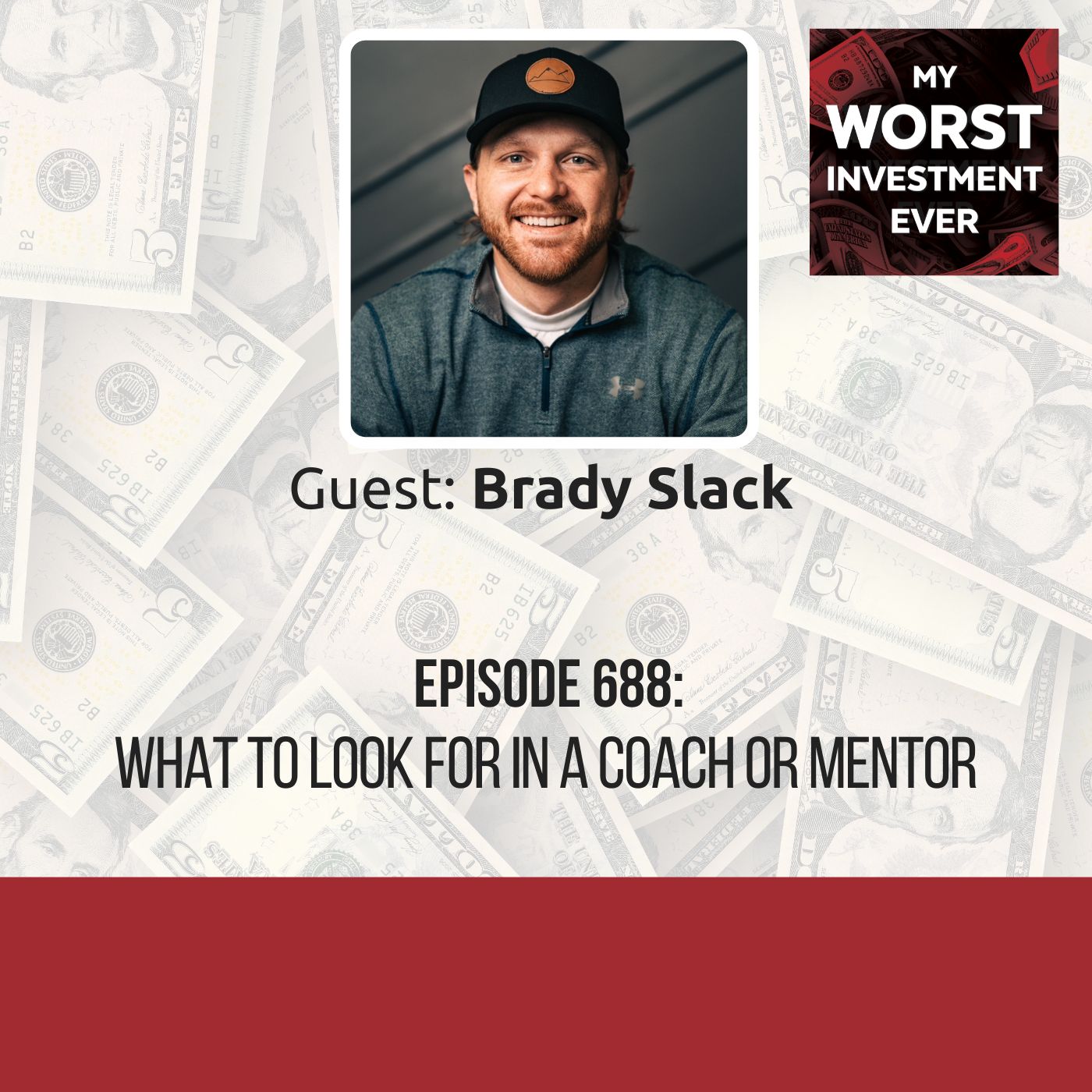
Brady Slack – What to Look For in a Coach or Mentor
BIO: Brady Slack is the owner of High Country Finance, LLC, a full-service tax and accounting firm based in Utah in the US. His purpose is to be a resource that helps everyone experience wealth while paying the fewest taxes possible.STORY: Brady came across a coaching group on Facebook that was good at marketing its coaching package. He was fascinated by the package and bought it for $50,000. While it was a good package, it wasn’t a good fit for him as it didn’t align with his business goals.LEARNING: Vet the mentor, coach, or advisor before you engage with them. Pick a mentor or a coach who embodies what you want to be. Don’t decide out of desperation or pressure. “If you’re going to make a decision or buy something, or spend money, go to bed first. If you still feel the same in the morning, do it. But if anything’s changed, rethink it.”Brady Slack Guest profileBrady Slack is the owner of High Country Finance, LLC, a full-service tax and accounting firm based in Utah in the US. His purpose is to be a resource that helps everyone experience wealth, all while paying the fewest taxes possible.Worst investment everWhen Brady turned 23, he quit his job at an accounting firm and started a business. He didn’t have the expertise or the experience to create an accounting firm, but he decided to do it anyway. A close friend, a successful businessman, told Brady that the quickest way to learn and grow is to hire someone. So Brady started seeking out mentors, coaches, and development opportunities.Brady connected with a group on social media that asked him to speak at their event. He felt this would be an excellent way to reach more people and boost his business. He later found out the group had an offer attached to the back end of the speaking engagement, including some coaching, marketing and advertising, and websites. This was an even better deal for Brady. This all came as a coaching package that cost over $50,000. Brady purchased it.While the coaching program was great, Brady soon realized that it didn’t necessarily align with where he wanted to go with his business. It just wasn’t the right fit for him.Lessons learnedIf you need more financial resources to pay for an opportunity, wait until you have it.Vet the mentor, coach, or advisor before you engage with them.Before you pick a mentor or coach, define your goals, your intentions, and what you want your outcome to be.Andrew’s takeawaysPick a mentor or a coach who embodies what you want to be.You may get less value from a generalist, so go for a specialist in your interests.Avoid getting sucked into the flashy coaches on your Facebook feed because those guys are great at selling but not necessarily great at coaching.Don’t decide out of desperation or pressure.Actionable adviceTake time to define what you want out of your venture clearly, and then look for someone who has already done that and reach out to them to mentor or coach you.Brady’s recommendationsBrady recommends getting as much information and education as possible from the numerous free online resources. Further, vet someone who can accelerate the growth within your venture and ask them to mentor you.No.1 goal for the next 12 monthsBrady’s number one goal for the next 12 months is to get his newly launched software to a point where it pays all its capital back and is profitable.Parting...
31:2221/05/2023

Richard Lawrence – Avoid the Stock That’s the Hype of the Day
BIO: Richard H. Lawrence, Jr., is the Founder and Executive Chairman of Overlook Investments Group, an independent fund management company established in Hong Kong in 1991.STORY: Richard invested heavily in a successful Korean company that brought him great returns until the founder died. The son took over and brought the stock to its demise.LEARNING: If it’s not working, get out. Invest in a company with no or minimal debt. Operating return is the purest way to measure profitability. “I’m a big believer in modest self-financed growth.”Richard Lawrence Guest profileRichard H. Lawrence, Jr., is the Founder and Executive Chairman of Overlook Investments Group, an independent fund management company established in Hong Kong in 1991. Overlook invests US$6 billion in a concentrated portfolio of public equities throughout Asia, excluding Japan.Richard and his wife, Dee, have founded several non-profit organizations; he’s a philanthropist who is devoted to climate change. He has two grown kids and lives in San Francisco, California.Worst investment everIn 1992, Richard discovered that stocks in Korea were incredibly cheap. He owned everything at 2-4x earnings. Richard owned a hair dye company and all kinds of oddball companies. Within that mix, there was one company that stood out. Korea, at the time, had massive debt. But this one company didn’t have any debt, so Richard was immediately attracted to it.Richard purchased shares in the company initially in 1992. At the time, the company was the largest synthetic fiber producer in South Korea, making spandex. It was a formidable company going from strength to strength. It became among Richard’s most significant holdings, the strongest of this cohort of Korean companies he owned.The company was founded by one of the greatest titans of the Asian textile industry. The founder was Korean and a larger-than-life figure in a manner unlike any other business leader in Korea in the lead-up to the Asian financial crisis when Korea went burst. He was a nonconformist in a culture that admired conformity. That was one of the reasons his company had no debt. He had the confidence and independence of someone who knew how to run a company for cash flow. Just as he disliked debt, he also disliked paying taxes. He was the most aggressive executive Richard had ever encountered in Asia or anywhere else. In one instance, he built a US$400 million facility, depreciated it over two and a half years, then revalued it and depreciated it a second time. By doing so, the founder minimized reported profits to minimize taxes and used cash savings to avoid debt. Richard liked this business model, so he invested heavily in it.The company did very well in the start-up years until the founder died. His son took over, but he struggled to fit into his father’s giant shoes. Richard thought he could help him be successful and worked on it from 1997 to 2000 during and after the Asian financial crisis. Richard gave him all the advice he could, but he was ignored. By 2000, with no concrete action taken by management, and no upward movement in the sock, Richard’s patience wore thin. Then the new leader crossed a red line and blatantly undertook an unfair related party transaction that effectively bailed out an insurance company owned by the family with cash from the spandex company.Richard, at that time, requested a reversal of the acquisition. He asked management to initiate paying cash dividends, execute a series of share splits, establish an...
38:4617/05/2023

Vineer Bhansali – You Create Real Value by Being Different
BIO: Vineer Bhansali is the CIO of LongTail Alpha. The firm was founded in 2015 to help provide risk mitigation strategies.STORY: In early 1993, most investors held a significant long position on the Eurodollar futures contract, betting that interest rates would go down. Vineer decided to follow the herd. The Fed increased rates, and Vineer kept buying until he lost his investment.LEARNING: Don’t follow the herd blindly. Success in the markets is all about timing. Have an investment framework within which you operate. “You’ve got to be very humble and disciplined with your loss thresholds and risk limits.”Vineer Bhansali Guest profileVineer Bhansali is the CIO of LongTail Alpha. The firm was founded in 2015 to help provide risk mitigation strategies. Vineer was a partner at PIMCO and started their first hedge fund and also started and managed their quantitative investment portfolio teams from 2000-2015.He has a Ph.D. in Theoretical Physics from Harvard University and has written six books on finance. He has also run over 60 ultramarathons. He is also an Airline Transport Pilot rated to fly jets and helicopters and has over 4,500 hours of flight time.Worst investment everVineer started at Citibank in late 1992, just after the 1987 big stock market crash. He was participating in a bull market created by an extremely easy central bank policy. At that time, probably the easiest trade to do was just to buy anything like fixed income or stocks, and it would go up.Veneer was at some dinner in late 1993, and everybody in that room held a pretty significant long position on the Eurodollar futures contract, betting that interest rates would go down. That should have been a signal that something was amiss. But as a young trader, seeing everything was going up, Veneer also got long Eurodollar futures.Then as a surprise, the Fed got a little worried in February of 1994 and raised interest rates by 25 basis points. The Treasury market started to fall, and Vineer thought it was a good time to buy, so he bought some bond futures contracts. The interest was raised again in March, and the market sank a little bit more. He kept buying more, hoping the rates would soon go down again. Eventually, his trades were blown over, and he lost his investment.Lessons learnedHaving an original idea is always good because you create value by being different.Don’t follow a herd blindly.Success in the markets is all about timing.Have an investment framework within which you operate.The markets are very demanding, and to survive, you need to take care of everything about yourself; your mind, your body, and your health.Andrew’s takeawaysThe market is a predator.Original ideas create value.Markets are a human construct, and you never know which way they can go.Don’t get too hooked on your creative idea because it may not be time right for it.Have an investment framework and follow it.Vineer’s recommendationsThere’s a lot of stuff that’s on Vineer’s website that can help with risk management. He also recommends reading The Feeling of Risk: New Perspectives on Risk Perception. Veneer...
36:2516/05/2023

Brenden Kumarasamy – Follow the Data, Not Your Emotions
BIO: Brenden Kumarasamy is the founder of MasterTalk; he coaches ambitious executives & entrepreneurs to become the top 1% of communicators in their industry.STORY: Brenden decided to promote his YouTube channel by sending 500 cold emails per day to university professors. After sending 2,000 emails, he received very negative responses. Instead of reviewing his strategy, he sent more emails for three months and got nothing out of it.LEARNING: Follow the data and remove emotion as much as possible when making decisions. Make sure your marketing content offers undeniable value. “If you want to be in the top 1% of any category, you need to behave in a way that 99% of people aren’t willing to.”Brenden Kumarasamy Guest profileBrenden Kumarasamy is the founder of MasterTalk; he coaches ambitious executives & entrepreneurs to become the top 1% of communicators in their industry. He also has a popular YouTube channel called MasterTalk, with the goal of providing free access to communication tools for everyone in the world.Worst investment everWhen Brenden started MasterTalk, he had this brilliant idea to send 50,000 cold emails to university professors in Canada and the US. His thought was pretty strategic. Even if 10% or even 1% of the recipients shared his videos with their college students every year, Brenden’s distribution would be unlimited, and his YouTube channel would explode in popularity.Brenden didn’t know how automated email campaigns worked, so he’d manually send 500 emails each day. He would open universities’ websites, pull up their faculties, find their emails, and start sending emails. About 2,000 emails into it—about a week into it—he started getting negative responses from the university professors. Brenden got so much hatred; it was insane.Despite the hate and realizing his strategy wasn’t working, Brenden didn’t stop after 2,000 emails. Being the 22-year-old knucklehead he was then, he spent the rest of that summer sending 500 emails daily for the next three months. After all that dedication, Brenden got just two positive responses.Lessons learnedFollow the data and remove emotion as much as possible when making decisions.There’s no silver bullet to entrepreneurship, just hundreds of lead bullets. So don’t push just one primary strategy, have hundreds of little different strategies.When something starts working for you, instead of guessing why it’s working, ask your customers. You’ll get to see what’s working, and through that, you’ll get the results you’re looking for.Andrew’s takeawaysTry A/B testing across many different things to determine where you’re making a breakthrough.When you send any marketing content, make sure it has some benefit to the recipient.Be relentless when you’ve got the right target, and follow up without giving up.Brenden’s recommendationsBrenden recommends subscribing to his YouTube channel to access hundreds of free videos on how to speak. He also does free live communication training on Zoom every two weeks. If you want to join that, go to <a href="https://www.rockstarcommunicator.com/?r_done=1" rel="noopener noreferrer"...
24:4414/05/2023

Julian Klymochko – Arbitrage Trades Don’t Always Turn Out to Be Risk-free
BIO: Julian Klymochko is the CEO and Chief Investment Officer of Accelerate, a leading provider of alternative investment solutions.STORY: Julian got into an M&A trade where the acquirer had to stage a shareholders’ vote. This led to a hostile acquisition where the target company was bought by another acquirer that was not part of the deal. Julian made a significant loss in this trade.LEARNING: Never put on an M&A trade that has the buy side vote. Arbitrage doesn’t always mean a riskless trade. “The best way to learn is to practice by doing. So, try it out yourself, and don’t risk more than you can lose.”Julian Klymochko Guest profileJulian Klymochko is the CEO and Chief Investment Officer of Accelerate, a leading provider of alternative investment solutions. Accelerate helps investment advisors, institutions, and individual investors diversify their investment portfolios, manage risk, and improve their portfolio’s risk-adjusted returns. Prior to founding Accelerate in 2018, he was the Chief Investment Officer of Ross Smith Asset Management. He started his career as an Analyst at BMO Capital Markets. Currently, Julian is a Director of the CFA Society Calgary.He has been featured in some of the world’s top financial and business media, including Bloomberg, CNBC, The Wall Street Journal, BNN, Business Insider, and The Globe and Mail.Worst investment everJulian started out in the mid-2000s as a young investment banking analyst working 100 hours weekly. He was handling mergers and acquisitions (M&A) and advising. During that period, Julian worked on some exciting deals. He got excellent insights into the inner workings of M&A, equity offerings, and capital markets. It was a great place to start a career.From that, Julian went to a startup hedge fund. He cut his teeth doing closed-end fund arbitrage, which was a fantastic trade, specifically during the great financial crisis of 2008. He could generate nearly risk-free returns that, at one point, were yielding 50% to 100% annualized returns because there was very low liquidity in the market, and people were desperate to sell. So arbitrage spreads were extensive. After that, Julian got into different arbitrage strategies; volatility arbitrage, convertible arbitrage, and one of his and Warren Buffett’s favorites, risk arbitrage.In 2012, Julian launched a standalone risk arbitrage strategy. He started with a $5 million investment from a handful of wealthy investors to conduct this risk arbitrage investment strategy. Risk arbitrage aims to generate high returns consistently—ideally, double-digit annualized returns and no down years.For the first four months, Julian put a lot of pressure on himself and was sick to his stomach every morning. But he still had a terrific first year with low volatility. Julian produced a double-digit return with low volatility and minimal drawdown. So investors were happy. The fund continued with that excellent trend for the first three years and grew significantly.2015 was an interesting environment in the M&A business. It was open season for pharmaceutical mergers. There was this popular trend called tax inversion. Tax inversion was where pharmaceutical companies would take over a foreign company to re-domicile offshore to lower their tax bill significantly. That trend buoyed M&A activity as domestic US pharmaceutical companies rapidly sought to conduct tax inversions by acquiring non-domestic competitors.At the time, a company called Valeant...
41:3510/05/2023

David Hay – The Importance of Range Expansion
BIO: David Hay has been employed in the securities industry since 1979 when he joined Dean Witter Reynolds, now Morgan Stanley.STORY: A colleague told David about a business that was going to sell books online. David wasn’t convinced that the business had a competitive edge. So while his colleague invested $50,000 into this company, David chose not to invest. The company was Amazon. Had David invested then, he’d now be a multimillionaire.LEARNING: Invest only what you can afford to lose. Keep challenging your thesis. Have a systematic quantitative framework to help you keep an open and agile mind when investing. “One of the most important things in investing is range expansion.”David Hay Guest profileDavid Hay has been employed in the securities industry since 1979 when he joined Dean Witter Reynolds, now Morgan Stanley.And since 2022, David has been chief or Co-Chief Investment Officer of Evergreen Gavekal with a special emphasis on macro-economic research.In 2022, David released his highly anticipated book, Bubble 3.0: Who blew it and how to protect yourself when it blows apart.The book explores why he believes the financial markets are headed toward a third iteration of past market rotations.Accordingly, he believes there are a number of investment areas/asset classes poised to benefit from what he has begun referring to as “The New World Disorder.”Worst investment everIn November of 1994, David received a call from a colleague. They were both portfolio managers at Smith Barney. At that point, they were investing side by side in virtually everything. The colleague told David about this guy who was starting a company, and he was going to invest $50,000 in it.The colleague explained that the business would sell books online. David didn’t understand the business’s competitive edge, so he opted not to invest in it.Six months later, the colleague told him the company was going public. Turns out, the company was Amazon. Had David invested in it when his colleague told him to, he’d now be a multimillionaire.Lessons learnedIf the idea sounds great, invest only the money you can afford to lose.The bigger and longer the trading range, the more important the message of the breakout or breakdown is.Constantly challenge your thesis.Andrew’s takeawaysHave a systematic quantitative framework to help you keep an open and agile mind when investing.For every company that becomes a billion-dollar or trillion-dollar company, the good news is that 99.99999999999% of people missed it.David’s recommendationsDavid recommends his free newsletter. You can also get a free copy of Bubble 3.0 by emailing him through Substack. David also recommends reading the Felder report by Jesse Felder.No.1 goal for the next 12 monthsDavid’s number one goal for the next 12 months is to remove his shorts and go max bullish.Parting words “It’s always so much cheaper to learn from other people’s mistakes than your...
48:5709/05/2023

Rex Salisbury – Quitting Can Be a Very Important Skill to Exercise
BIO: Rex Salisbury is the Founder & General Partner at Cambrian Ventures, a pre-seed & seed focused fintech fund.STORY: Rex’s biggest mistake ever was sticking with his initial career too long, even though he knew he shouldn’t have been working that job.LEARNING: Invest in the skill that you want to move into as much as you. Build networks early in your career. “Make yourself marketable. It’s amazing what you can learn if you invest in certain things.”Rex Salisbury Guest profileRex Salisbury is the Founder & General Partner at Cambrian Ventures, a pre-seed & seed focused fintech fund. He previously was a Partner at Andreessen Horowitz, where he helped launch the fintech vertical. He has over a decade of experience working in finance & fintech, primarily as a software engineer, before becoming a venture capitalist.Worst investment everRex’s biggest mistake ever was sticking with his initial career too long. Rex attended a small liberal arts college on the American east coast—Davidson. He had a great experience and made a lot of good lifelong friends. Rex studied economics and also got a major in history.During his senior year, Rex worked in investment banking, specifically for Merrill Lynch. He also did an internship in South Africa and studied formal money lending. After college, Rex went to work in a bank. He believed that since banks are big businesses, there must be interesting work to do.Unfortunately, the experience wasn’t what Rex had imagined. He hated his job and had begun thinking about quitting from the second month on the job. But he kept dragging on and wasted the first four years of his career doing something he knew he shouldn’t have been doing.Lessons learnedQuitting can be a very important skill to exercise.If you’re considering leaving something like a job, you should quit it sooner rather than later for better life outcomes.It’s incredibly important to have access to good networks early in your career.If you have the unfair advantage of being young, relatively unattached, and the ability to relocate geographically, do it. It will expand your networks.Andrew’s takeawaysIf you’re feeling like quitting, take that seriously. Sit down, write about it, talk to someone about it, and start to take some action.Invest in the skill that you want to move into as much as you. That will help you make that transition.Actionable adviceIf you’re interested in a particular area, find other people who are really good at writing and talking about that area. Exercising that muscle over time can help open doors to building valuable networks and relationships.No.1 goal for the next 12 monthsRex’s number one goal for the next 12 months is to identify individuals building the next big companies that will change financial services and invest in 12 of the most interesting of those.Parting words “If you feel like you don’t have the skill set to affect some of these changes, put in the work.”Rex Salisbury [spp-transcript] Connect with Rex SalisburyLinkedIn<a href="https://twitter.com/rexsalisbury" rel="noopener noreferrer"...
31:2507/05/2023





